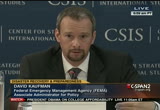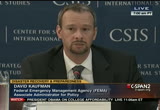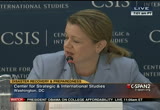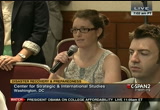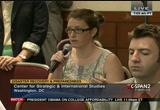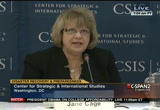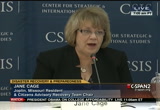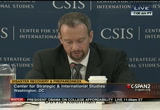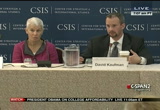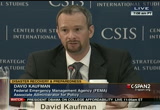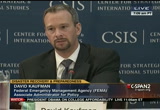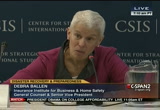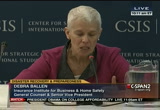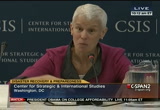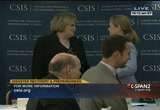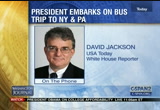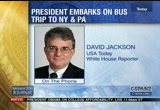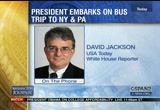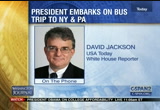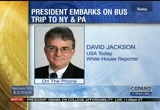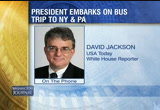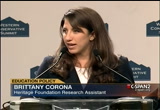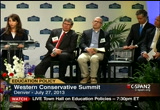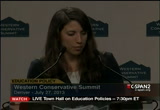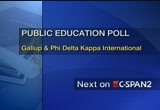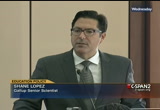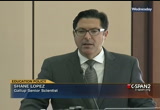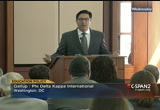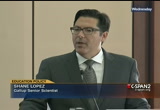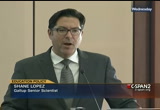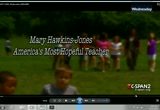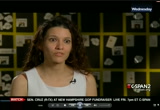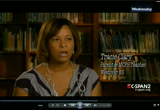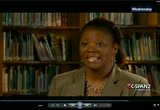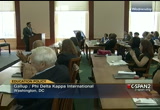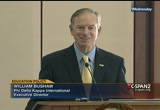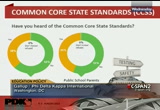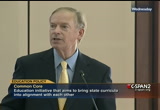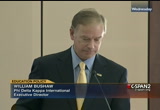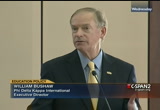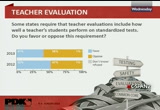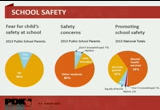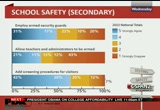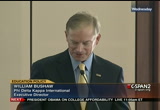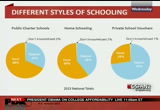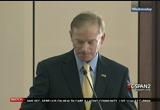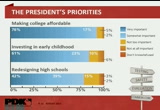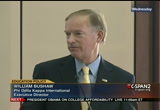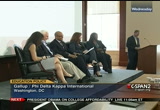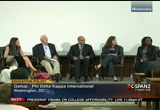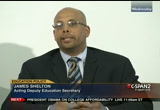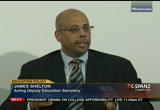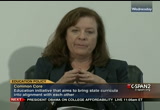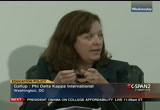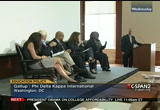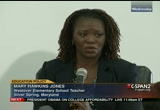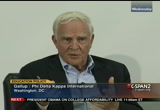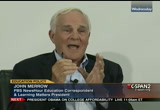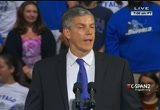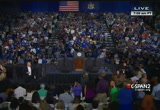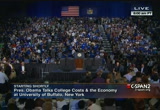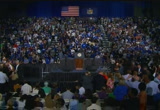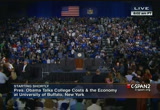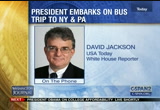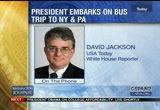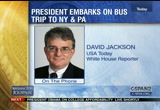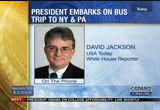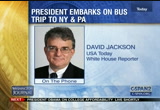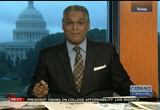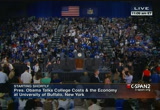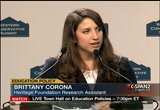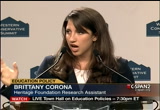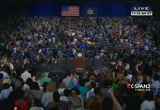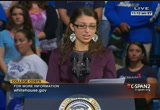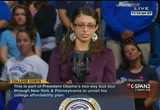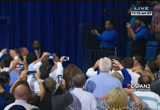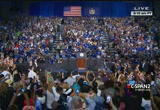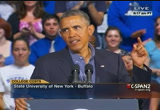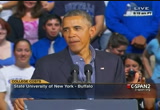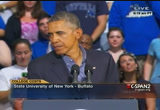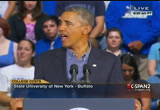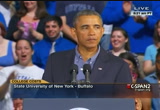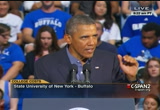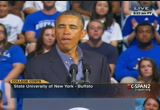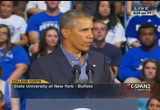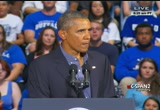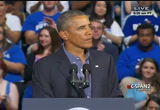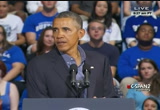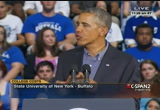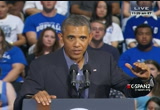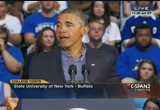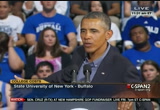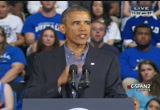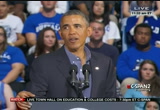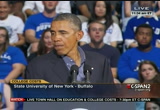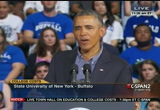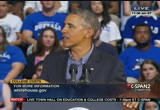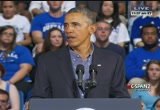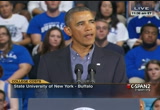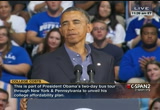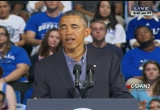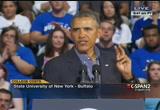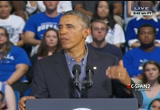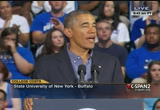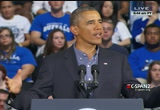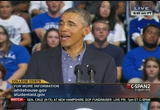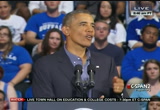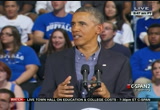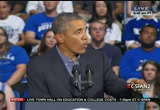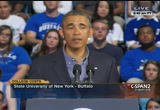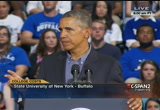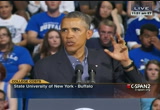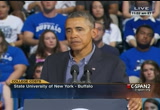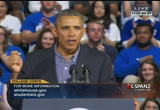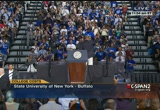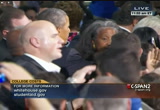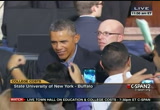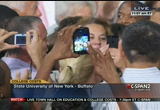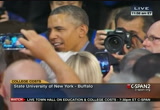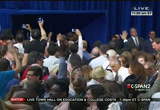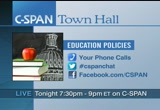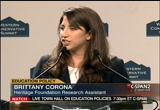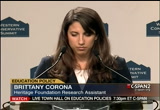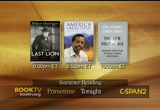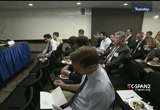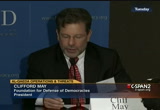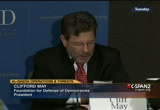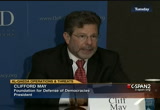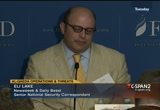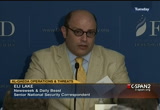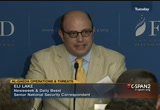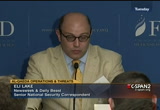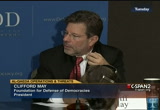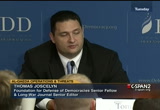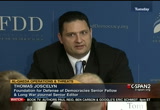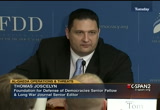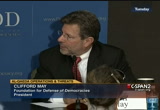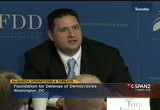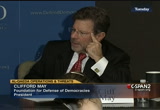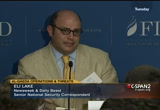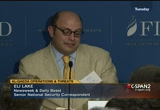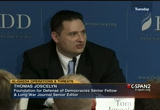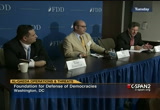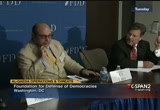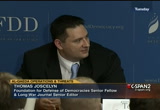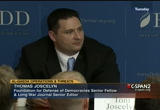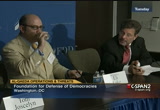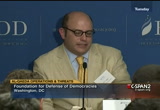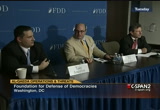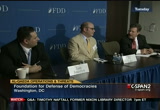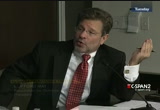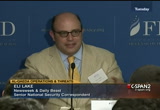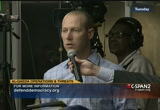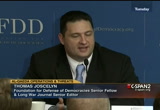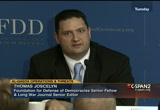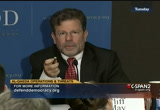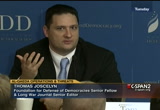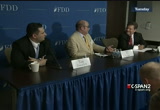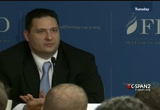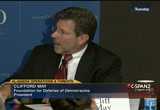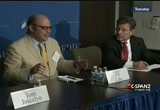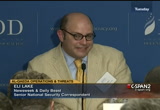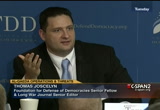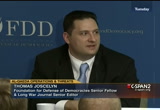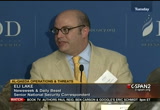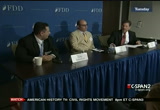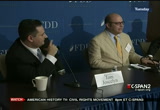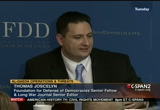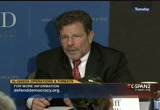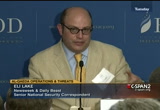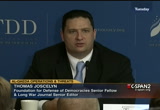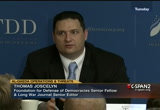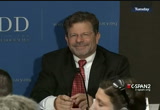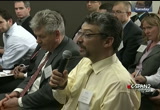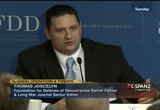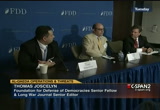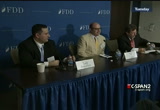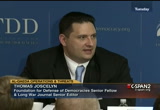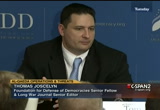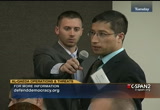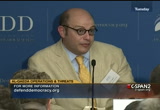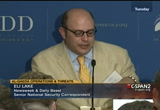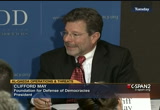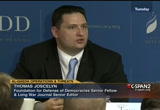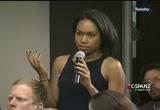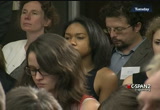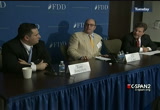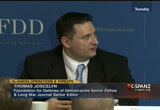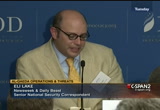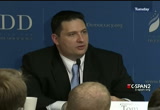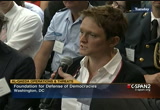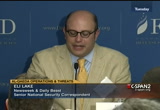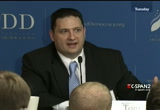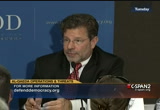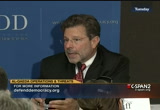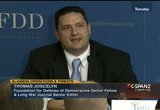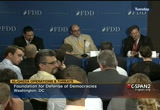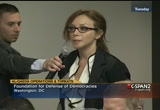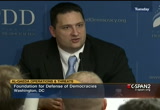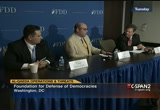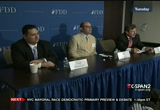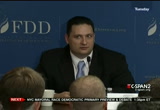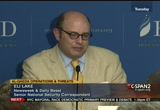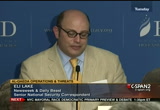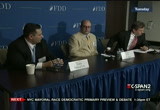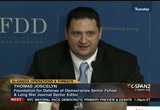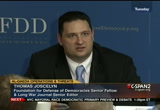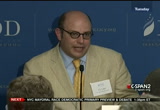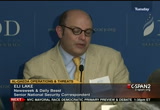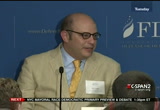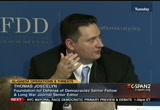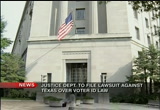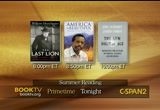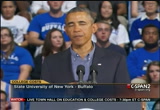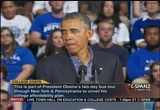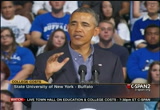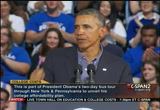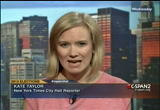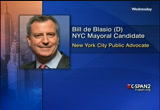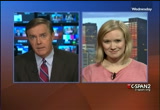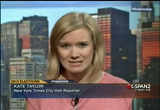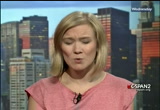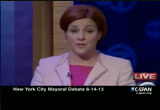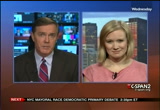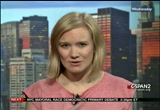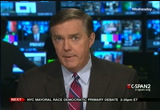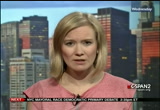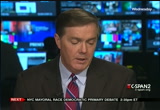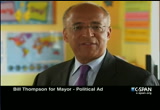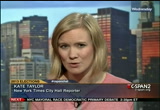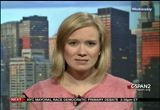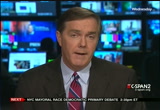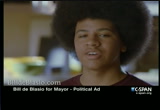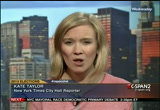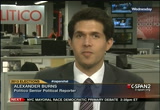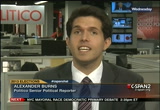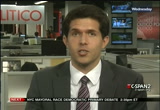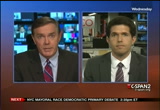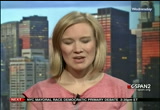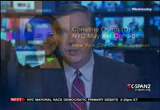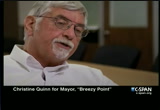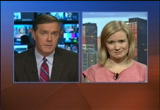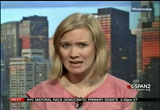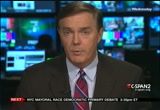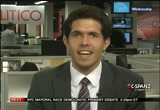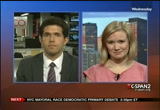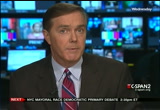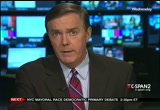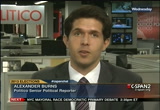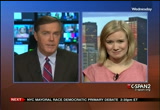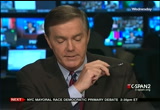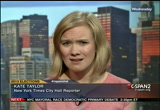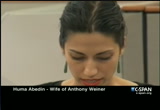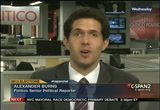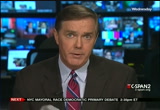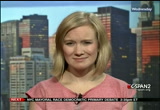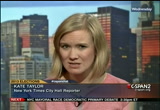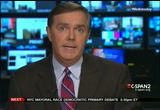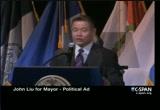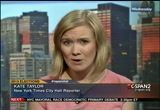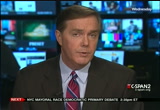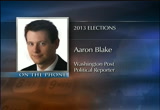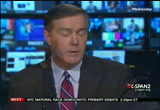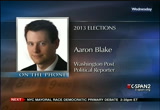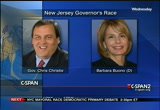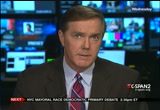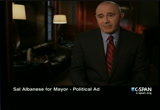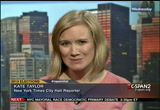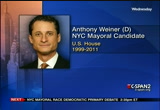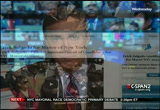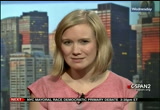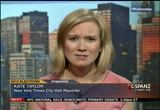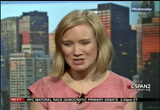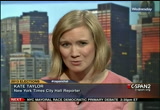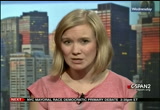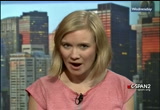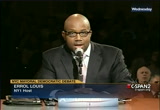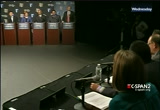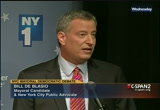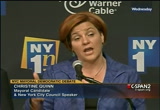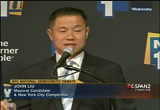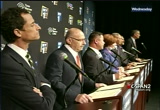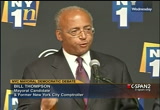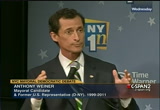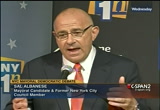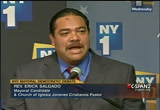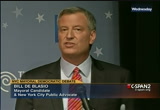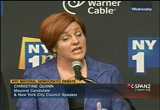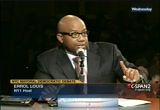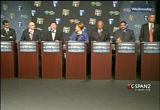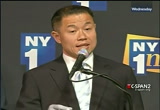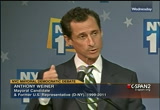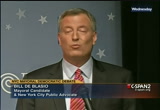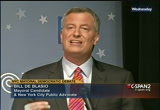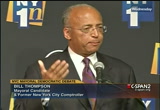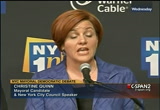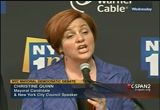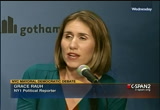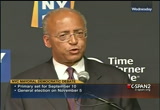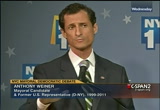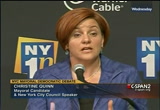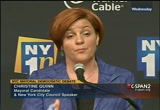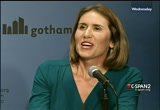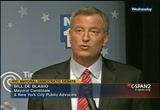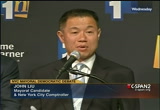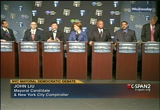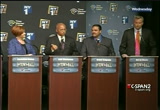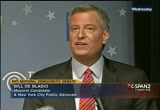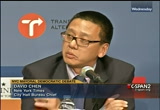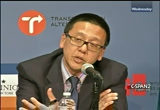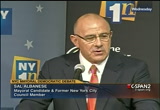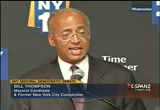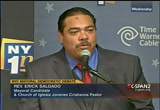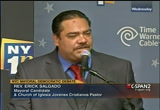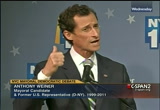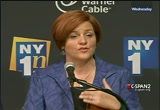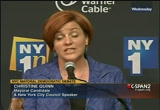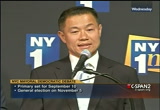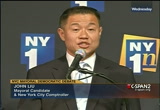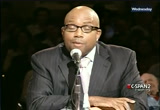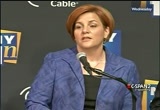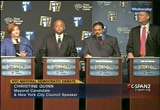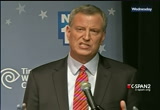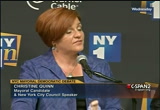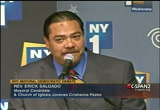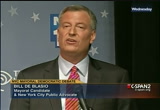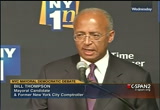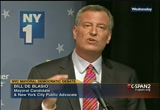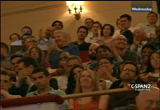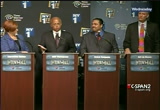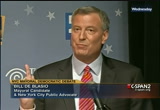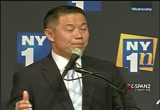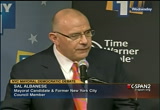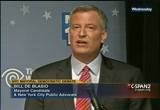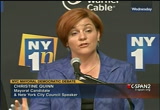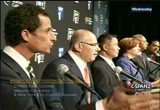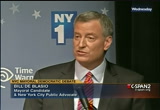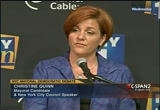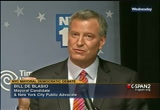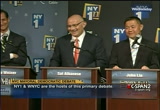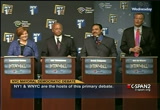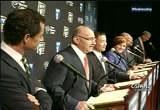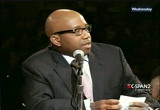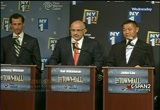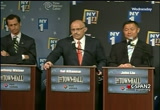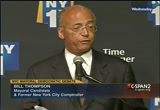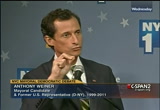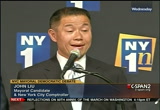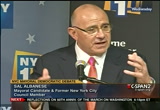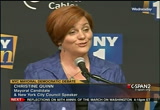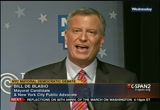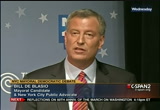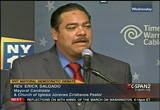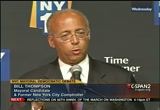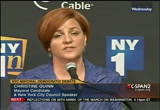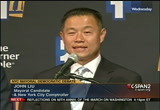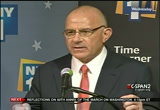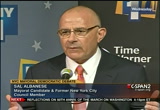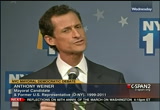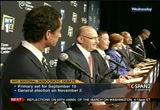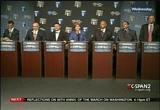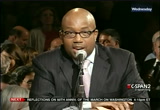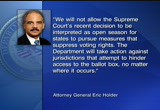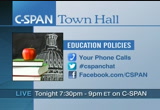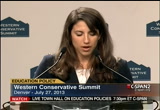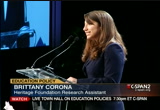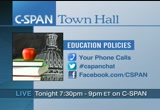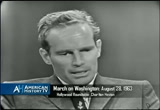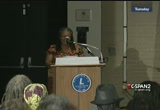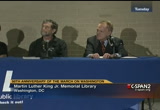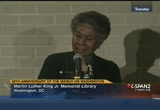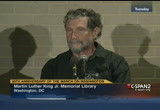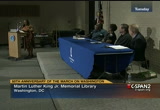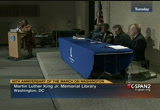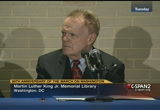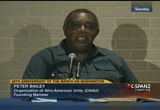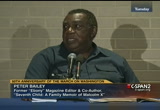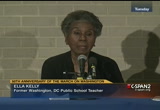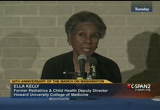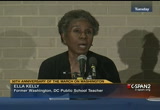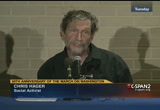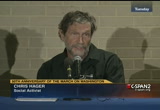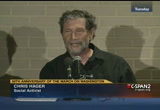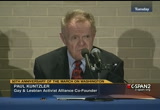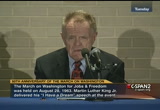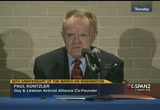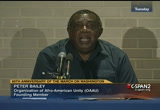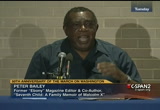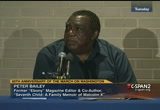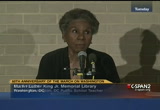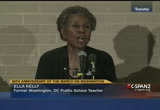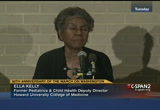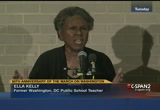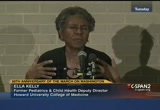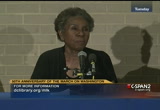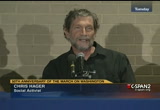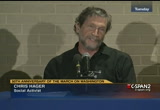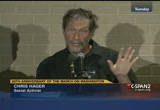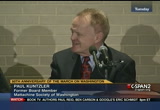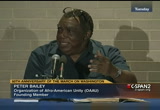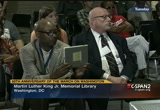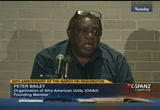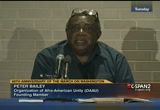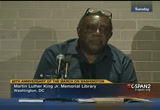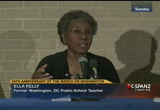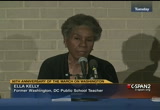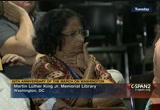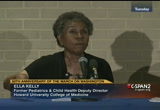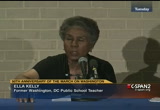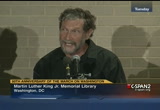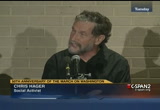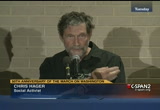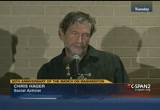tv U.S. Senate CSPAN August 22, 2013 10:00am-5:01pm EDT
10:00 am
horizon, the first order payment is the responsible party because that's the legal framework that's set up in that context. it's a different legal framework for natural hazards where there is public assistance provided to the affected communities, and there is individual assistance provided to qualifying homeowners and survivors, and there are other means of support. but those are different, different mechanisms. the thing that i wouldn't lose sight of, however, that cuts across all of those is there's huge, broad-based grassroots support. the overwhelming majority of financial aid in the aftermath of the triple disaster in japan was by private citizens and ngos. and you see that same effect happening here. look at the huge sums of money that came through private donation and ngo networks in different ways in each of those events that i just referenced. and then most recently, you have
10:01 am
crowd source funding support which is a whole new -- i mean, very small dollar amounts by comparison, but a whole new phenomenon in the, support is the word i'd give is provided to affected populations. >> [inaudible] >> i do think there are some victims who really, you know, of tornadoes, whoever it might be, who don't have their needs fullly addressed as well as some others that are more prominent. >> thank you, sir. i think when we talk about public/private partnerships, we shouldn't forget ngos, crowd sourcing after superstorm sandy or hurricane sandy was significant, and it's something that a i think as we look to the future figuring out how to capture the goodness that comes from new versions of philanthropy will be key. i'm going to ask jane to think about a good example of an
10:02 am
ongoing project that they're undertaking in job -- joplin to give us a sense of how they're moving forward. i like her phrase of not look around, but looking forward. before she goes into that, i'd like to ask if any of you have further questions. if we could -- um, that lady back there and this woman up here, and then we can have them answer. thanks. >> my name is abby, and i work with interaction which is a coalition of international -- u.s.-based international humanitarian assistance and development ngos, and thank you all for your presentations. and what struck me a lot about your definitions of resilience is that everyone had a different definition particularly within the government if you looked at usaid policy on resilience, they have a whole other different definition of what they would say resilience is. and bringing me to my question is that in the international arena especially amongst ingo
10:03 am
tos, we talk about the resilience of people to be able to absorb shocks and stresses without huge interruptions to their lively hood, so really addressing those underlying risk factors that cause people to be less resilient whether that's their precarious living situations, their employment, their social networks and be ability to reach out to them. so a lot of what you're talking about, what i heard today is preparedness and recovery but not necessarily addressing those underlying risk far to haves -- fact a to haves that make -- factors that make people less resilient to disaster. so i was just wondering how any of you are looking at those underlying risk factors to really build the resill yens of people -- resilience of people to absorb these. >> i'm going to ask david and,
10:04 am
perhaps, debra if she's got thoughts on that. the lady up front, please. >> i'm kathleen koch, former cnn correspondent and author of "rising from katrina." and i just wanted to ask you a brief question. in these very tough economic times, how do you get cities to be willing to invest in the resilience, in something that might happen, preparing for the possible when they are dealing with so many pressing issues right now. again, the economy, crime, etc. thank you. >> thanks. i'd like jane, first, to lead off by talking about a project that she might be working on. thanks. >> sure. david mentioned that i'm working on a project, and i have been because we've been so blessed in joplin, and we have certainly not become experts by any means, but i do think we have a set of practical experience, so i've collected so far about 40 essays
10:05 am
from people across all sectors of joplin who are involved in recovery from hospital ceos to the police chief to the city manager to the fire chief to the superintendent of schools about what we learned in our first year that we think are lessons that we think we could pass on and what we wished we had known. the more i publicly state my goal, the more it has to happen. i'm hoping to be done with that by the end of september, and we'll be able to give that out to anyone who's interested in the way of a community or organization. in terms of investing in resilience, that's a hard question to answer from our per spect be i because, you know, we need money in every sector for so many things right now that it's hard to think about it. but i will say that, you know, fema and the insurance companies help us in getting back to where we were but not to where we want to be. and so, you know, even in joplin with as tight of times as we've been experiencing related to the tornado, we passed a $62 million bond issue to invest in
10:06 am
ourselves and safer and more resilient schools that had a different face than they did before. >> i think i would add that when you look at involving cities and helping them make investments, it is a toughies call environment for them -- fiscal environment for them. there are centers which try to help donors target their donations and time, effort, money more effectively. but the question of getting cities and the federal government, too, and david may with able to speak to this in terms of investing in resiliency however it might be defined, and i could actually on that question, the second question, david, if you could talk a little wit about how -- little bit about how fema defines resilience and the role of underlying factors. >> so i'd be happy to, and maybe i'll use that to kind of lead into the other question as well. so i think the definition issue is a bit of a red herring. everything that you describe definitionally is entirely compatible with how we're thinking about it, and for me,
10:07 am
resilience is a lot like prosperity. every one of us would dwient slightly differently, but we can all appreciate the value of it and have aspiration with respect to it. i think the importance important thing is not so much quibbling over the specific language because the tase, the term shows -- the phrase, the term shows up in many different ways in different fields. physical sciences, biological sciences, etc. but think about, again, that application. and this is where your point about what are the underlying risk factors. when you heard me speak about underlying community conditions or debra speak about -- i forget the phrase that you used, but you were talking about the built environment and how do we adjust building approaches in ways they will better withstand, those are all about addressing the underlying risk factors. i apologize for speaking for you if you were going to say that. but, um, i think that's inherently it. what's going on beneath the
10:08 am
surface in the physical domain and the social domain and what are the opportunities for intervention in manners that can build the capacity of that community, of that system to withstand that shock, to rapidly recover from it and to adapt going forward. and so tremendous parallels in the international development space as well. for me, the answer to the second question is i don't think you try to market investment and resilience directly. i think you instead step back and think about what are the areas that we're already focusing on. you know, as someone in a discussion like this pointed out to me, when i go to the grocery store to buy milk, milk is usually at the back of an aisle filled with either cereal or cookies, right? because most of us don't go to the store just to buy cookies, but we walk by cookies, and
10:09 am
those things go well together, and maybe we have a kid with us, and so we end up with cookies in our basket as well. find the entry issues. what are the things we are investing? what are the problems we are working on? i had a great discussion, this was philanthropic side, but with a community foundation and i was just a bystander in the discussion, and one was saying we want to make an investment in your organization to run an initiative on resilience, and the other was saying our plate is full. our focus here is on housing curt and food security. we don't have room for anything else. and i'm sitting here saying you just described two of the biggest challenges in crisis. these are not mutually exclusive. this is about how do we tackle the food and housing security issues on a daily basis in a way that can pay dividend in a time of crisis. >> debra, while you guys are blowing houses down, how do you think that helps resilience in terms of the underlying factors?
10:10 am
>> well, let me answer that from the context of the two questions and the question about vulnerable populations, that certainly is something that we think a hot about in the context of blowing down houses, and that's one of the reasons we are such strong supporters of building codes because they are regulatory requirements for the people who can't demand more. and be there needs to be a basic life safety standard in place including in missouri, i might add, which does not have a code. pardon the knock there. the other thing as far as the vulnerable population space is concerned is one of our greatest partners, i'm very pleased to say, is habitat for humanity. and they are outstanding. the benefits of going code miss. and insurance companies individually have funded a number of habitat houses, and we've worked with them in terms of our standards because this isn't about sort of well --
10:11 am
wealthy people have safe houses and people who don't have those kind of economic conditions are living in the kinds that are going to blow away. habitat has been effective both in terms of new construction and retrofits, they've been in the gulf. i'm not sure if they've been in joplin, but, you know, they're trying to make that affordable so that we build in that resiliency into the infrastructure. i loved your question because it's something that we think about all the time. and we're actually going to be working with some social scientists in december. they're coming to our lab, they're going to see the work that we do in our lab, and we're going to talk about the question of how do you move along that continuum that i just mentioned. and the way that we've sort of framed the discussion for them, and if there's any social scientists in the room that would like to come, please, let me know. it's capturing hearts and minds, addressing the issue of the finances and the financial incentives and be dealing with the politics. and, you know, in capturing the hearts and minds, it's the work that you're doing.
10:12 am
it's making people really understand why it matters. it's making sure that if they want to do that, if a homeowner or a business owner, that you provide them enough incentives that they can make that work from a cost benefit perspective and, ultimately, dealing with the politics. one of my very favorite people in the disaster thought community is howard at wharton, and he has another acronym which is -- i forget the letters because you'll have to tell me what they are after i say it, not in my term of office. and that is something that we really need to around whether it's local politics, state politics or those guys in congress is that you've got to put the investment in, understand the difference between a first dollar investment and a long-term savings. and at the local level, we really need to make sure that the people, by the people wanting it -- once you've captured their hearts and minds, they make it clear that this is
10:13 am
a value of this commitment and you can't short shrift it and think over the long term you are going to get savings, because the winds are going to come, and it's all going to fall down. >> well, thank you all. we've gone a few minutes over, and i hope you agree with me that it was time well spent. so, again, congratulations to jane and the citizens of joplin, and thank you all for being here. please join me in a round of applause for our panelists. [applause] thank you all. [inaudible conversations] >> president obama arriving at in this hour in buffalo where he is beginning a two-day bus trip through upstate new york and pennsylvania highlighting his proposals for making college
10:14 am
education more affordable. in a speech that you can watch live here at c-span2, it's set for 11:05 this morning, he will unveil a number of measures including tuition costs, graduation rates and the average earning of graduates. for more on the president's bus tour, we spoke with a "usa today" reporter. >> host: mr. jackson, could you kind of highlight some to have message that the president will bring, especially a new take on how colleges should be ranked and how that ties to financial aid. >> guest: exactly, yes. this is the latest in a series of speeches he's been giving on the middle class, and this week's topic, as you mentioned, is college affordability. and he's going to outline a revamped plan for how to reduce those costs. first of all, it involves what he calls payment for performance. as you mentioned, he's going to the propose that colleges be ranked in terms of how they're holding down costs, holding down tuition and delivering more
10:15 am
effective education for the better dollar. and these rankings will be tied to federal aid. the higher the school is ranked on the saving cost scale, the more federal aid they'll be eligible for. he's also going to change the student pell grant program toward where it'll be tied more towards progress to a degree. the way i understand it now, a lot of students get the grant up front before the semester. under a new plan, it would be allocated throughout the year as students make more and more progress. he's also going to challenge, what he calls challenge the colleges to promote innovation and competition among themselves and basically to improve their education services and how they deliver them and so the competition between colleges, that that will reduce costs in the long run as well. and he's also going to talk a little bit about a new student debt program. the president has often talked about how the student debt loads have increased in recent years, and that's making it harder and harder for graduates to enter the work force and enter the middle class. so basically, he's going to talk about changing the ways to where
10:16 am
a student who takes out a loan can also enter a program to where his repayments would be no more than 10% of whatever his earnings are after he graduates. >> host: so he'll target the college campuses and speak to students directly. we've seen that, you know, during the course of the campaign. talk about the strategy of speaking directly to students and, you know, with other issues also being of concern for the president, the economy at large, you know, things about health care as it rolls out towards october, and yet he's focusing on college this week. >> guest: exactly. well, he's talking to students and parents. i'm standing right now outside the basketball arena at the university of buffalo which is the state university of new york, and according to the white house they're already doing things with technology innovation to help lower costs, so he's coming here to spotlight the kinds of things he's talking about in terms of how colleges can lower their costs and yet still maintain a good education. so he'll start here and then he'll go to a high school in syracuse where he'll also talk to students who are about to enter college and their parents who are about to pay for it.
10:17 am
this is all part of a larger strategy based on what he calls his middle class program, and over the past several weeks he's given several speeches on different aspects of this program. he talked about jobs in one city, infrastructure in another city, housing in yet another city. he says it's education that he says is the key to the middle class. we're a knowledge many economy. if you're a college graduate, you've got a better chance of entering that knowledge economy and making more of an income. and on top of that, you know, basically he was on vacation last week, now he's getting back to the real grind, and we're heading into september where we're going to be looking at a lot of budget fights. the fiscal year ends september 30 beth, and also the temporary spending bill that's currently funding the government also ends on september 30th. if the president and congress can't agree, the government's going to shut down. so i think while he's talking about education, you'll also hear the president make his pitch for how we should handle
10:18 am
the arguments going forward. >> host: so these proposals he's laid out, how much is that going to be dependent on working with congress to get legislation done, and what are the can'tations? >> guest: well, a significant factor. leading into these i thought he was going to talk about a lot of executive orders, but a lot of what he's talking about will require congressional approval, including this idea of ranking the colleges and tying federal aid to that. you know, congress is the one that would have to agree to a new system that would base college aid on the rankings. and also i think congress would also have to be involved if he changes the structuring of debt repayments for college loans. and that's going to be a challenge. as you know, the president and congress, particularly the republicans in the house, are at loggerheads on a number of issues. they're tied up on the budget, there's a potential argument over the debt ceiling, we've got congressional republicans who are trying to defund the health care law, a lot of disagreements. and it's, this college issue, while it's important be, i can easily see it getting lost in
10:19 am
the shuffle. >> host: i suspect, though, even as he proposes this ranking of colleges, he's going to have to deal with leadership directly at the places he's going to be appearing during these two days. >> guest: yes. i think you'll see quite a bit of pushback, i'm already starting to see mails from college groups saying it's going to be inevitably subjective, and they're going to argue that college is expensive. i mean, providing a good, top quality education is very expensive. it takes, you know, you've got to pay professors and pay for equipment and pay for subject matter. so, yes, i definitely think you'll see some pushback from the education community which is going to be interesting, because a lot of them have supported president obama in the past. >> host: david jackson with "usa today," white house reporter with that publication talking about the president's bus trip that he embarks on today to new york and pennsylvania. will jackson, thank you. >> guest: thank you, sir. >> and, again, you can watch the president's remarks on the first leg of his two-day bus tour coming up at 11:05 eastern right here on c-span2.
10:20 am
and with the president turning his attention to education and college affordability, over on c-span tonight we're going to open our phone lines and get your thoughts on college costs, the student loan program and the value of education. you can also join in on the conversation think our facebook page or on twitter using the hash tag c-span chat. it gets underway at 7:30 eastern tonight on c-span. colorado christian university recently hosted the western conservative summit in which they addressed the issue of school choice and the role of the federal government in education. here's a look. >> 237 years after our founding, we've come to a fork in the road in education. one side we have educational freedom in the form of school choice, and the other side we have the greatest push of the washington leviathan, national common core education standards. so milton friedman -- whose
10:21 am
birthday is next wednesday, by the way -- was the father of the school choice movement. the school choice movement came under the idea that educational opportunity, giving parents the ability to move their students, their children out of zip code-confined areas would allow competition and allow greater opportunity. we've seen in this the form of vouchers, tax credits and education savings accounts. but the biggest threat that has now hit us, the common core national standards, is, again, a washington leviathan idea that spending more money would equal more educational outcomes. we have not seen any of this since 1970, and the $4.3 billion of federal incentives in no child left behind waivers to states that signed on to the common core pushed by the obama administration are not likely to induce any kind of further be educational outcomes either. the threat to school choice is also at stake. we see sat and act standards
10:22 am
being conformed to the common core national standards. and a pew result just came out, $16 billion would be the price tag over the next 13 be years -- or next seven years for common core-aligned states, 45 in total. what does the common core contain? math standards that are poorly sequenced, do not use standard algorithms, and english standards that'll mix classical education in lieu of informational text only. so america's seeing two paths in front of us; choice or centralized education by the common core national standards. so we have a choice to make. are we going to be a self-governing society, or are we going to be a society or a people governed by despotism? it's going to start with education. >> we'd like to get your thoughts on college costs, the student loan programs and the government's role in education tonight as we open our phone lines and take your facebook
10:23 am
comments and tweets. we'll hold a town hall starting at 7:30 eastern on our companion network, c-span. but coming up in just under an hour we'll bring you live remarks from president obama as he kicks off his two-day bus tour on college affordability. the president's speech at the state university of new york buffalo beginning at 11:05 eastern will be life here on c-span2. and on c-span this morning, health and human services secretary kathleen sebelius on the impact of health care law on the latino period. the open enrollment period is scheduled to begin on october 1st of this year. you can see her remarks live at 11 a.m. eastern on c-span. yesterday gallup in ip withfy delta kappa international released its report of people's views on common core state standards, standardized tests, teacher evaluations, school safety and online learning. we will show you as much of this event as we can until the
10:24 am
president's remarks on college affordability coming up at 11:05 eastern. >> good afternoon. good afternoon, and welcome to which way do we go, a discussion of the results of the 44th annual pdk gallup poll of the public's attitudes towards the public schools. my name is shane lopez, gallup senior scientist, co-director of the poll along with bill of pdk and your host for the afternoon. before we talk about the results of this year's poll, please indulge me, i'd like to tell you a little bit about the work we've been doing at gallup polling americans regarding what they think about school and what they think about their lives. in the past year alone, we've polled americans to discover who's happiest at work. it might seem like a fluffy concept, and this might surprise you even more given that it is a fluffy concept. teachers are one of the happiest
10:25 am
group of folks in america. [laughter] i figured you'd like that. teachers, in fact, are second only to physicians in happiness at work. happiness in life. the struggle is they are not so happy at work, they're feeling as though they're losing their sense of autonomy, and they're not getting some of their basic needs met in the workplace. but overall, their life has much purpose and much happiness. we also heard from a big group of americans, we poll people every night here in america, and we found out that of the american workers, the folks who are struggling with engagement the most are college-educated folks. so the people who have a college degree and go into the american work force are not as engaged as some of the folks who are less educated here in america. so we've been puzzling about that one, trying to figure out why we work so hard to keep people engaged in school if they're graduating into workplaces that are not so engaging. we've also heard from over a half million american students in k-12 alone this year, plus a
10:26 am
whole bunch of college students, and what we found out -- and this is consistent with our past polling results from the gallup student poll -- is that half of american students are hopeful, about two-thirds of them are engaged, and about almost two-thirds of them are pretty happy in life, which is good news. there is an engagement slide that happens from grades starting in middle school, so you're pretty engaged in elementary school and that engagement slide kind of makes school kind of a hard place to be for a while, and that kind of balances off later in high school. what's happening with hose students during that time -- with those students during that time is something of great interest to us. so we've been trying to dig deeper into those numbers and make sense out of what might be causing this engagement slide or at least might be related. one thing we're trying to make sense out of is american teachers and how engaged they are. what we found is one-third of
10:27 am
american teachers are engaged, and you heard me say two-thirds of students are engaged at school. so in terms of involvement in and enthusiasm for school and work, teachers are more engaged -- less engaged than students. students are more engaged than teachers. so, again, we're trying to figure out what all that means. when we look at our hope of american children, what we found one big driver is being at a hopeful school. hopeful schools look different from less hopeful schools. so the kids in these schools believe that the future will be better than the present, and they have the power to make it so because they're surrounded by hopeful teachers doing a great job. now, on that note i want to caution us. we all hear these polling results, and we'll talk about them for the next hour and 15 minute, and many of us, including myself, will forget that there are people bebe hind these numbers. will forget that there are people behind these numbers. for this poll alone, the pdk gallup poll, we talked to 1,001
10:28 am
americans asking them what they thought about public education. they are representing us. they are speaking for us. so that's important to remember. i believe it's also important to remember that when i talk about engaged teachers, we have millions of people out there who have dedicated their lives to teaching. and they're not as engaged as they'd like to be, but they're happier than most. so we're trying to get to know those teachers better. and in those 192 high-hope schools in america, we did find some very hopeful stevenners this year, and i'd like to introduce you to one of them so you can kind of put a name with the numbers. and the name of that potential is march finish person is mary hawkins jones. today she was given an award. she's the most hopeful teacher in america. mary? [applause] so now you have a name to go with some of that data you hear
10:29 am
gallup p talking about all the time. and gallup and ately ya books did a search of that most hopeful teacher, here she is. you'll hear from her later on the panel. but we also want to remind you there are other folks behind the numbers and a whole bunch of kids that are affected by the decisions we make as policymakers and as educators. so if we can get to know mary a little better and also some of her children as westover elementary in montgomery public schools, i think that'll keep that -- give us that reminder that we need to, um, picture names and faces behind these numbers. ♪ ♪ >> even each and every year when i'm given that class list, i know that these students are
10:30 am
destined for greatness, and i know they were given to me for a purpose. i'm hopeful that i will help them to find that purpose and help them move forward in their goals in life. >> i think all good teachers see budding talent in life. you play the piano nicely, she takes it that next step, and she nurtures it. >> mary inspires kids. she sends a vision and hope for what they can do not only when they graduate elementary school, but when they graduate from high school and in college and in grade school. >> i hired mary 23 years ago, and i remember that interview as if it was yesterday. she came bouncing in my office, and first-year teacher. but she said something that i won't forget, she said the children will remember this year with me. >> she taught me the value of hard work and dedication, and that's how goals are accomplished. and i was very fortunate to
10:31 am
receive that lesson very early on in life. >> she was very shy. and so with christina, i really worked with her at developing her hope. >> my parents are both imgrants from el salvador, so i started my schooling with little to no english. and i have really no recollection of that just because she created an environment that just was welcoming to all students. >> as a teacher, i have to insure that that they build that confidence within them to tell them you are successful, just look deep inside and find what you want to be, and i'll help you develop that. >> mrs. hawkins-jones was at a school that was high, you saw high poverty when i was in elementary school, and that didn't discourage her. she had the same expectations for us as any other teacher would. >> many you see the children just rise to the occasion,
10:32 am
they're standing taller, and they fulfill, they fulfill those dreams. they see that, oh, i can be this, this is what i can do. >> she just had such a huge impact in the type of person and the type of teacher that i have become. >> she's giving her students what i gave her. so it goes to show that hope, once it's developed, you can give it to someone else, and it'll continue and continue and continue. >> she helps us, she gets us motivated, she gets us cheerful. she always thinks of the positive things. >> she believes in all of us, and she just helps us to be the best that we can be. >> she'll find what motivates that child whether it's drawing or a particular subject heart, and she will go from that point and teach that to reach them. >> as an educator, that's my job, to help students find their hope and then tell them, okay,
10:33 am
let's set a strategy, let's make a plan so that you can accomplish this. >> and her daily comments revolve around that. all the students have goals that they, um, create at the beginning of the year -- >> sets of goals to bring up my grades and try my best to succeed in school. >> she helps us pick strategies that are going to help us get it, like, make us better this that subject. >> and once they reach their goal, we set another goal. >> mary takes it a step further. she puts scaffolding in place. she gives the accommodations to make the children realize they can reach that goal. so no longer is it just a wish. it's in place that they will make their goals. >> we have begun to develop their pathway of thinking and once you finish elementary, your next step middle school, next step high school, next step college, next step ph.d.. it's whatever you can imagine if, imagine big.
10:34 am
imagine really great so that you can accomplish that. >> she gave that message that in order for us to succeed, we have to work hard and that it was going to take a little bit of work, and it was going to take a lot of dedication, but we could get through it. >> it gives them confidence to move forward. it gives you a growth mindset. it allows you to excel to the highest heights that you can. so everyone needs help, and everyone has hope. ♪ ♪ >> thank you, ms. jones, for such a wonderful year. >> you are the best teacher i ever had. >> i will never forget you. >> you have made me into the person that i am today. >> congratulations, ms. jones, for winning the most hopeful teacher award. >> congratulations, ms. jones. [applause] so today i do, i do, i want you to analyze the results, i want you to critique the results, i want you to discuss them, i want
10:35 am
you to share them. but i never want you to forget that there are names behind these numbers. there are people behind these results. to highlight the results of the 44th annual pdk gallup poll, the executive director of pdk, bill beshaw. [applause] >> we had an opportunity this morning to participate and share with mary in this award, and it was just great. i should begin to tell you that we believe one of the most important findings of this year's poll and the last few years is that over 70% of americans have trust and confidence in the men and women who teach in the public schools for the very reason that mary and others like her do the work that takes place in the classroom. so, shane, thank you. my plan is to do a high-level summary of some of the findings. there's a lot of information in this poll. we're not going to go over all of it, but some of the findings in this year's poll, and then we
10:36 am
have a panel, an esteemed panel that we'll bring up in front, and we'll open it up for questions and answers. so to begin, just real briefly research procedures, this is a standard national poll of americans ages 18 and over, and it is all americans. it's not just parents or teachers, so it's all americans. the sample was, or the calls were conducted in may. the sample is weighted to represent the current demographic of americans in the united states. so let's begin and talk a little bit about the common core state standards. we led off with a few of these questions. of course, i think all of you in this room know that 45 states plus the district of columbia are voluntarily implementing the common core state standards, arguably one of the most important education initiatives of our time. the effort to create these standards was first launched in
10:37 am
june of 2009 as a bipartisan partnership between the national governors' association and the council of two state school officers. recently, some controversy as emerged regarding the standards and whether they challenge the local control of schools. and given this, we decided to ask americans a series of questions. first, we asked americans within the sample if they had even heard of the common core state standards, and we were surprised to find that only 38% had indicated that they had ever heard of them in the sample. among parents it was slightly higher at 45%. then we asked some follow-up questions. we asked to see how much knowledge americans had about the standards, whether they were required by the federal government. many americans thought that they were. which is not the case. whether they were based upon an
10:38 am
amalgam can of state standards which, of course, they aren't and whether there are standards to be in all the different areas, academic areas which, again, they're not. but then we ended up asking this question, whether americans thought that the common core would have an impact in helping students learn global skills. and you can see from this that there's relatively lukewarm support for the standards, only 41% of americans taught that they would -- thought that they would make those differences. so in general, regarding the common core state standards we discovered, number one, a lack of awareness; number two, a lack of understanding; and, number three, only lukewarm support. let's talk about testing and teacher evaluation. there has been a significant increase in student testing in our nation's schools mostly as a result of the federal
10:39 am
legislation of no child left behind. so we asked americans if they believe this increased student testing has helped, hurt or made no difference in the performance of their local public schools. only 22% indicated that it helped leaving 36% indicating that it had actually hurt the performance of their schools and 41% saying it paid no difference. when we last asked this identical question in 2007, we see a shift in the percentage of americans that said it helped as opposed to hurt. back in 2007, it was 28% that said it helped and only -- and 28% that said it hurt. so we've seen a shift in just five years with the larger percentage of americans believing that the increase in student testing has hurt.
10:40 am
related to the question we asked last year for the very first time, and let me read this one, this has to do with teacher evaluation. here's the question: some states require that teacher evaluations include how well a teacher's students perform on standardized tests. do you favor or oppose this requirement? last year we asked that question for the first time, and that's the lower bar for 2012. you can see, actually, a majority of americans, slight majority, 52%, feldt that they supported the use of student standardized test scores in evaluating teachers. but in just one year, and that's the upper bar, you can see that that opinion has changed relatively dramatically in just one year. now 58%, that's a switch of 11 percentage points in one year, indicate that they do not favor the use of standardized test scores for evaluating teachers.
10:41 am
following the tragedy in newtown, connecticut, in december, we wanted to know the opinions of how safe americans felt students were when attending school and their ideas on how we could improve student safety. so in the chart on the left, and this -- we asked this question of parents only. you can see that parents do not worry about the physical safety of their children while attending school. in the middle you can see -- and, again, parents -- if they are concerned about the safety of their children, a concern with other students as opposed to intruders. and then finally on the right, the chart shows the response to this question. let me read this question to
10:42 am
you. to promote school safety, some school districts are considering adding more security guards while others are considering increasing mental health services. which do you think would be most effective? and you can see from the chart on the right that almost a 2 to 1 margin americans believe that increasing mental health services would better promote school safety over adding more security guards. continuing on school safety, and these charts focus strictly on the safety, on the security issues. we asked americans, and we used a scale of 1-5, strongly agree to strongly disagree, whether, number one, schools should employ armed security guards; number two, whether teachers and administrators should be allowed to be armed; and, number three, whether schools should have screening procedures similar to
10:43 am
those used in other government buildings. blue shows agreement to those questions, orange shows disagreement. and you can see that on the top chart americans are pretty evenly divided on employing more armed security guards. on the middle bar, you can see that americans strongly oppose allowing teachers and administrators to be armed. and on the lower bar, you can see that there is relatively stronger support for implementing security reed yours in schools -- procedures in schools similar to what we have in other government buildings. switching topics, different styles of schooling. americans are becoming more receptive to different styles of schooling as well as different types of teaching and learning. the chart on the left shows that
10:44 am
americans support public charter school, and that remains relatively high at 70%. now, when we first asked this question 13 years ago in the year 2000, support for charter schools was slightly over 40%. so in just and years, that sport has increased -- that support has increased quite a bit. for the first time this year, i'm a little surprised that we never asked this question b but for the be first time this year we asked americans if they support be allowing participants to home school -- participants to home school their children. and looking at the chart in the middle, you can see that 60% of americans do indicate their support. furthermore, an overwhelming majority of americans favor having public schools provide services to home-schooled children -- easy for me to say -- including services for disabled students, opportunities for students to attend public school part time and opportunities for students to
10:45 am
participate in public school athletics and extracurricular programs. and then turning to the chart on the right, we asked americans their response to allowing students and parents to choose a private school to attend at public expense. and opposition to private school charters actually increased quite a bit this year. it's at 70. 21st century skills. this is one of the passions that shane has and others in exploring this. we asked if schools should teach critical thinking, communications, setting goals, collaboration, creativity. within education circles, these are referred to as 21st century skills. it was not surprising that americans support the teaching of these skills, but what wasvef
10:46 am
support that they have for these. particularly critical thinking and communication. and what's interesting for us is these are the very kinds of skills that are associated with the common core standards. and so americans knew more about the common core based upon their embracing these kinds of skills, we think that would be very helpful. and the last slide we have for you before we work with our panel bists -- panelist, we asked americans about the president's three education priorities that he's announced. one was to make college more affordable, the second to invest more in early childhood education, and the third one was to redesign high schools. now, americans clearly support all three, but far and away they support that number one of making college more affordable.
10:47 am
so that's -- and, again, there's much more information in the report. the entire report is included in this magazine. one of the things that we do when we -- and we've been doing this for 45 years -- is in the report we provide you the question that we asked americans verbatim. be and that gives you a chance then to take a look at that question, how it's phrased, and do you accept the response that you see based upon the phrasing of that question. we believe that's very important. the other thing, and you can see here that we've managed to do because we do this every year or have done this every year for 45 years, we routinely go back into our archive and pull out questions that we've asked in the past, and that gives us the chance to ask those questions again and to see trends in public opinion about education.
10:48 am
certainly, i mentioned the one on public charter schools, the other one on testing, even the one on using standardized test scores and teacher evaluations. so with that, i'm going to ask our panelists to come to the front, and while they're coming up in front, i'm going to make introductions. and you see their images up here. so we have maria ferguson who is the executive director in the center on education policy at george washington university. yeah, i didn't want -- we didn't assign seats, i apologize. [laughter] what was i thinking? i taught junior high school, i know enough to do that. sorry. we should have had little tags, right? little names. sandra boyd, chief operating officer and senior vice president at achieve.
10:49 am
john merrill, education correspondent at the pbs "newshour" and president of learning matters. jim sheridan, acting deputy secretary at the united states department of education and, most important, our most hopeful teacher of the year, mary hawkins-jones who teaches at westover elementary school. and so we're going to start off, i'm going to take the prerogative since i have the microphone right now of asking the first question of all the panelists, if you will. so as we learned from this poll, most americans have never heard of the common core state standards, and even those that have heard of them, many of them have misperceptions about the standards, and we see that there's really only lukewarm support for the standards. so my question is, is this a problem or will it work its way out as the standards are implemented in the classrooms and the new assessments are
10:50 am
used? >> well, i think tim shelton should take that. [laughter] >> all right. well, i think that it is actually going to be a problem if we don't address that issue for two reasons. the first is that as new standards start to, people start to teach to them in particular as we start to assess them, communities are going to find out that many of their kids are not prepared. and when they find out they're not prepared, people are going to react. they're going to be afraid of what it says, that my kid who has been scoring very well was doing well before and all of a sudden my child or my child's school doesn't look so great. in the context of not knowing anything about the standards and the second issue which is there is a healthy diet of misinformation proactively being spread about the standards -- >> by the left and the right -- >> on both sides, this is not a
10:51 am
finish this is a full-contact, everybody in the game opportunity to spread misinformation. but with the a healthy dose of misinformation and concern raised by kids not doing very well when probably the assessments are first introduced, you can expect that there'll be a pushback x. that pushback without people understanding what the standards are, understanding what the benefits are, understanding the work like bill smith has done that shows when you look at states that have the highest correlations with the common core standards, their students had a high probability of actually doing well on nape as well. so it kind of indicates that we're moving in the right direction. that kind of data is not out there. our voice is the federal government was this is a state-led initiative, the it's muted on it, and there's not a very clear set of folks that are really able to take the message out in a strong way that seems compelling to the average person. so even though parents, as you can see in the ap poll, feel
10:52 am
very different about it, i do worry about the misinformation that the general population is being fed. >> are let me pick up on that. i think you're exactly right, but let me just try to give some context and explain why i think those results look the way they do, and they're very consistent with polls last year and that others have done more recently. it's not as if common core was branded. in 19 states that have adopted the common core, common core doesn't appear in the standards. they call them something else. so people, they're known by different things in different states, and that makes sense because this was a state-led effort, and states adopted these standard along the way and have, are implementing them on their own timeline. and that's another challenge. the states are all over the lace this terms of implementation with nearly every state looking to implement by 2014-'15, but as of the last school year when you would have asked these questions, there were only seven states that were fully -- indicated to us in our survey --
10:53 am
that they were fully implemented in k-12 hath and ela. so you'd expect that not everybody would necessarily noaa that moment. and then on top of that, you get this weird disconnect. common core is sort of this, you know, it's this thing that, you know, has this, is used on sort of this level as a political football. but, you know, in a school i'm 100% sure if you had asked me ten years ago what would have been different in virginia because virginia has a catchy name be, they're the sols. >> and what does that mean? >> standards of learning. not what you think. most parents probably wouldn't have known what their standards were called. so what i'm going to suggest is i think most important here is that every state, and this is true of non-common core states too, have raised their expectations pretty significantly in the past couple of years, and they're going to be expecting, they are beginning
10:54 am
to expect more of their students -- and they have good reasons for that, you know, look at the pullout today, i think, from act that only a quarter of the kids who take the act are ready for college or the work force -- there's good reason to raise the bar. and so that's what i think is important for the public and for parents to really understand, and that is that the bar has been raised. assessments will look different. results may look different for a while, but the goal is the right goal. we're not doing kids or anybody else any favors by giving false information to them about how ready they are for the world they'll graduate into. >> i just -- let me just turn my mic on, i'll use my cafeteria voice. as a teacher, i work in the state of maryland, i lived in tennessee, arkansas, i have friends in north carolina, all over, that are educators. and we talk about this, and we talk about the common core.
10:55 am
and you're right, there are a lot of different names, but overall it's the expectation. so i think the message that we need to get out there and make it into the forefront in education is that our expectations are changing, and we need to let the parents know that the expectations are changing. each state may have a different name for what they are trying to accomplish in the curriculum, but it's the same goal; to increase the expectations in order for our students to thrive in the future. so once we get that message out and we're saying the same thing and we're allowing parents to see that because, you know, if i would have looked at common core, i might not have -- and i'm not from the state of maryland -- i might not have said, oh, those are the new standards. because you have to be involved in the education field to understand that. i feel that, you know, once we get it more out into the media and on the school level, once we have our meetings with our parents and we make it a
10:56 am
continuous conversation. also we have to help our students understand that the standards have changed, because they are our message carriers. they go home and talk to their parents, and we want them to talk to about, you know, now we're doing this in school compared to something that i've done differently in the past and showing them that there is a difference in the expectation that we hold as teachers. >> i do think our standards are pretty low educationally, and there's no question that raising the standardses is a good idea. that said, i think the common core faces an uphill struggle. the name is a problem. in america they couldn't call them national standards or federal standards because americans don't know the difference. they probably should have been called american standards, but that's a line of toilet fixtures. [laughter] so they ended up -- and some people say that is the name they should -- so they ended up with common core. the man with the bully pulpit,
10:57 am
secretary duncan, really can't use his bully pulpit to argue for the common core because that reinforces the belief some people have that it's washington doing it all over. every time he opens his mouth, they lose support which is a shame because he's a very persuasive and likable man. the real challenge in the common core and why i think it faces, it is not going to go away and you guys have a real battle, but i think in the testing, the testing process has a built-in contradiction. the federal government insists that the data be able to be used to judge teachers and principals. but the common core standards, the skills and capabilities are things that have to be judged by teachers. you cannot, a machine cannot test where students work well together. or a student can speak persuasively. you have to trust teachers to do
10:58 am
that, and the test designed does not trust teachers. and unless they work that out somehow, teachers, if they know those scores will be used to perhaps fire them, they will say the heck with this teaching kids, judges kids on speaking persuasively. they'll go right back to the -- >> we will leave this event to go live now to new york. president obama is on a bus tour through the states of new york and pennsylvania talking about college affordability, and with him today, education secretary arne duncan. >> for your commitment to your own education. give yourselves a huge round of applause. [cheers and applause] to all your parents, to the faculty, to the staff, i want to thank you for the difference you're make anything your students' lives, and our goal is to make sure that the dream of going to college is a dream that can be fulfilled by the middle class. and be far too often today folks who are working hard are starting to thinking that college is just for the wealthy,
10:59 am
for rich folks, and something's really wrong with that picture. we all know be the if you want a good job in the economy of today, you have to have some form of higher education. two-year community college, paid vocational training, we have to work together to make that much more affordable. your parents are sacrificing, you're working hard every day, the university's doing a good job of making school more affordable, but we've got to make that american dream a reality. so thank you for the example you're setting, thank you for the difference you're making. the president and i are thrilled to be here, keep up the great work. thank you so much. [applause] ♪ ♪
11:01 am
later today, about 5:55 p.m. the president will speak to the residents of syracuse, new york. c-span love live coverage of the presidents' day. in a couple of minutes as he gets underway we will also record his appearance later today. tomorrow the president will go to birmingham -- binghamton, excuse me, for a town hall meeting. he will meet with residents for a q&a session. he will also stop in scranton in pennsylvania the hometown of vice president joe biden who will be with him tomorrow. we will have live coverage on the c-span networks.
11:02 am
♪ >> with the president talked about education, on c-span tonight we'll be opening our phone lines and getting your thoughts on college costs as student loan program and the valley of education. we are inviting her conversations through our facebook page or on twitter come use the hashtag c-span chat. c-span slide education town hall starting at 7:30 p.m. eastern tonight on our companion network c-span. ♪
11:03 am
>> while waiting for the president, awaiting the arrival of the president of the state university of new york, buffalo university, the president will be talking about the cost of college education. the president expected in just a couple of minutes. we'll get a preview of the presidency to her through new york and pennsylvania that took place this morning on the "washington journal." house of representatives mr. jackson, could you highlight some of the message that the president will bring, especially a new take on how colleges should be ranked and how that ties to financial aid? >> guest: this is the latest in a series of speeches he's been getting on the middle class and districts of college affordable. is going to outline a revamped plan for how to reduce those costs. first of all it involves what he calls payment for performance. mentioned he will propose the
11:04 am
rank of how they're holding a cause, holding and wishing and delivering more effective education for the better dollar. these rankings will be tied to federal aid. the higher the school is ranked on the saving costs give a more federal aid they will be eligible for. he's going to talk about performance of students and basically changed the students they'll grant program to where you be tied more towards progress to a degree. the way i used it right now is a lot of students get the grants up front for semester. under the new plan they would be allocated throughout the school year students make more and more progress. he's also going to challenge what he calls the challenge the colleges to promote innovation and competition among themselves and basically, improved education in terms of how they deliver them are so the competition between colleges will reduce cost in the long run as well. he's going to talk about a new student that program. the president has talked about of the student debt loans have
11:05 am
increased in recent years and that's making it harder for graduates to into the workforce, into the middle class. he's going to talk about changing the way to where a student who takes out a loan can also in a program to wear his repayments would be no more than 10% of whatever his earnings are at -- after graduates. >> host: so he will speak to students directly. we've seen it during the course of the campaign. talk about the strategies be contracted to students. with other issues also being of concern is the economy at large, things about health care as it rolls out towards october. he's focusing on college this week. >> guest: he's talking to students and parents. i'm standing outside the basketball arena at the university of buffalo which is the state university of new york, and according to the white house they are doing things with technology and innovation to help lower cost was coming here to spotlight the kind of thing he's talking about in terms of how colleges can lower the cost and yet still maintain a good
11:06 am
education. they will start here and then going to hig a high school in syracuse where he will also talk to students and their parents are about to pay for it. as you mentioned is all part of a larger strategy based on what he calls the middle-class program. over the past several weeks he's given several speeches on different aspects of this program. talk about jobs in one city, infrastructure in another city. he's talked about housing in another city. today's education which he says is the key to the middle class. that's where the economy, if you're a college graduate have a better chance of entering and making more of an income. even on top of that he was basically on vacation last week. now is getting back to the real grind, and we're heading into september where we will be looking at a lot of budget fights. the fiscal year in september 30, and also the temper spending bill that is currently funding the government also inspect if the president and congress cannot agree the government will shut down.
11:07 am
i think that while he is talking a education today you hear the president make his pitch for how we should handle the budget going forward and his argument against the government shutdown. >> host: for these proposals how much will that be depend on working with congress to get legislation done, and what are the expectations? >> guest: a significant factor. and going into these, i thought is going to talk about a lot of executive orders but that doesn't appear to be the case. it will require congressional approval including ranking the colleges and tying federal aid to that. they would have to agree to a new system that would base college aged on the rankings but and also i think congress will have to be involved in changes destruction of debt repayment for college loans. that's going to be a challenge. as the president and congress, particularly the republicans in the house are at loggerheads on a number of issues. they are tied up on the budget, and potential argument over the debt ceiling. we've got congressional republicans trying to a fund for health care law.
11:08 am
a lot of disagreements and this college issue while it's important i can easily see it get lost in the shuffle. >> host: even as he proposes this ranking of colleges you have to do with college administrators and leadership directly at the places he's going to be appearing during the two days traffic i think you'll see quite a bit of pushback. starting the season e-mails and college groups saying it's impractical, it's going to be inevitably subjective and that they will argue college is expensive. providing a good top quality education is very expensive. you've got to pay for equipment and pay for subject matter. so yes, i think you'll see some pushback from the education community. a lot of them have supported president obama in the past. >> host: david jackson with "usa today," white house reporter talking about the president's bus to him works on today, new york, pennsylvania. mr. jackson, thank you. >> guest: thank you.
11:09 am
>> we are live at the state university of new york in buffalo where president obama is kicking off his bus tour through new york state and parts of pennsylvania. talking about college affordability. the president is expected any moment. live coverage year when he does arrive, and then tomorrow, the president will stop at suny binghamton for a town hall meeting with residents for q&a and then he'll stop in scranton, pennsylvania. you will be joined by vice president joe biden is a native of scranton, pennsylvania. a quick reminder about tonight's town hall meeting on c-span. we are opening our phone lines and getting your thoughts on college costs, the student loan program and the valley of education. we are asking you to join in the conversation on our facebook page or on twitter using the hashtag cspanchat. life education town hall starts at 7:30 p.m. eastern again at c-span, our companion network. >> while we wait for the
11:10 am
president the issue of school choice and the role of the federal government in education was discussed at the westin conservative summit at colorado christian university earlier this summer. here's a look. >> 237 years after our founding we've come to a fork in the road in education. one side we have educational freedom in the form of school choice. and the other side we have the greatest push, national common core education standards. so milton friedman, his birthday is next wednesday by the way, was the father of the school choice movement. the school choice movement came under the idea that educational opportunity coming giving parents the ability to move the students, their children, out of zip code confined areas would allow competition and allow greater opportunities. we've seen this in the form of vouchers, tax credits and education savings accounts. but the biggest threat that has not it is, the common core national standard, is again a
11:11 am
washington leviathan pushing the idea that spending more money would equal more educational outcomes. we have not seen any of this since 1970. and the $4.3 billion of federal incentives and no child left behind waivers to states that signed onto the common core push by the obama administration are not likely to induce any kind of for the educational outcomes either. the threat to school choice is also at stake. we see sat and a cd standards being conformed for the common core. the common core national standard. ap result came out $16 billion would be a price tag over the next 13 years, or next seven years for common core alliance states, 45 in total. what does the common core contain? math standards that are poorly, do not use standard algorithm, and english standard that will
11:12 am
mix classical education. they are in lieu of educational text only. so america has a few pass in front of your choice or centralize education by the common core national standards. so we have a choice to make. are we going to be self-governing society, or are you going to be a society or a people governed by nepotism. going to start with education. >> i remind our town hall on education policy gets underway tonight at 7:30 p.m. east and on our companion network c-span. we invite your conversation through facebook and on twitter. we are live once again at the state university of new york in buffalo a waiting president obama. this is the first stop on his two-day tour through new york state and parts of pennsylvania. talking about college affordability. here's the president. [applause]
11:13 am
>> first of all i want to say thank you to mr. secretary. we are so honored to have you and we thank you for being a tremendous champion of students. let's give a round of applause. [applause] >> hello. i'm a sophomore here at the university of buffalo. i am from grande island, new york and am currently pursuing a major in exercise science with intention to go to dental school. i'm also a part of the undergraduate academy. [cheers and applause] >> we are tremendous honor to host president barack obama so he can show whether such an important speech on higher education in the united states. i know we all firmly believe our country is the best colleges and universities in the world. [applause] >> i am fortunate to come from a family of understands the
11:14 am
tremendous value of a college degree. ever since i was in middle school i was set on attending the university of buffalo but at that young age eyewitness to the limit is -- family members graduate from the university. i also gained an immense amount of insight as to what was to offer with my older brother who is currently sitting at the university. the city was in itself, it offers very academic professional and social opportunities for all ethnicities. ub is part of the suny system which is a national leader in providing more than 450,000 students statewide with higher education and job opportunities. ub is a prime example of low cost high quality options for college students. personally, knowing that i had guaranteed graduation after four years makes me completely comfortable that i will not have any additional unexpected loans, especially during a time of increased college costs. the program is also opening up
11:15 am
opportunities to new students such as my younger sister who plans to attend ub next fall. i know the students, faculty and ub community members who are gathered here today cannot wait to hear from president obama. [cheers and applause] >> the president has always focused on helping students to succeed. i greatly admire his passion for ensuring that everyone, regardless of family incomes, gender, or race, has access to an exceptional and affordable education. [applause] >> with that i am so proud to introduce to you the president of the united states, barack obama. [cheers and applause] ♪ [cheers and applause]
11:17 am
it is good to be back in buffalo. good to be back in new york. [cheers and applause] i want to begin by making sure we all thank silvana for a wonderful introduction. give her a big round of applause. [applause] her mom and dad are here somewhere. where are the? i know they're pretty proud. there they are right there. give mom and dad a big round of applause. [applause] >> a number of other people i want to acknowledge. first of all our secretary of education, arne duncan, who's doing a great job. [applause] >> one of the finest governors in the country, your governor, andrew cuomo, is here. [cheers and applause] >> your outstanding mayor, brian
11:18 am
higgins, is here. give him a big round of applause. [applause] >> what -- byron. i'm sorry, byron. [laughter] >> let me, what i -- what i meant was your congressman brian higgins is here and. [cheers and applause] your mayor, byron brown is here. [cheers and applause] this is what happens when you get to be 52 years old. [laughter] when i was 51, everything was smooth. [laughter] >> your congressman and your mayor are doing outstanding work. we just wrote on the bus over from the airport and they were telling me that buffalo is on the move. that was the story.
11:19 am
[cheers and applause] >> a couple of the people i want to acknowledge. suny chancellor, nancy is here. doing a great job. >> university president is here. [cheers and applause] and we've got all the students in the house. thank all the students. [cheers and applause] >> now, now, today is a check in day out the dorms, so want to thank all the students for taking a few minutes from setting up your futons. [laughter] your mini fridges.
11:20 am
just to come out here. i hear that the last sitting president to speak here was millard fillmore. [laughter] [applause] and he was actually chancellor of the university at the same time. which sounds fun, but i've got enough on my plate. [laughter] this is our first stop on a two-day road trip through new york and pennsylvania. [applause] and after this, i had to syracuse to speak -- gay, searches. to speak with some high schoolers. tomorrow i'm going to visit suny binghamton and go to scranton. but i want to start here at the university of buffalo. [cheers and applause]
11:21 am
and i wanted to do it for a couple of reasons. first, i know you're focused on the future. as i said, talking to the mayor, he was describing new medical school and new opportunities for the high-tech jobs of tomorrow. so there's great work being done at this institution. i also know that everybody here must be fearless because the football team kicks off against number two ohio state next weekend. [applause] good luck, guys. [laughter] going to be a great experience. [laughter] it's going to be a great experience. it could be an upset. [cheers and applause] and third and most important, i know that the young people here are committed.
11:22 am
you know, to earning your degree, to helping this university, to make sure that everyone of you finishes in four. [applause] makes sure that you're prepared for whatever comes next. and that's what i want to talk about here today. over the last month, i've been visiting towns across the country, talking about yes, feel free to sit down. get comfortable. [laughter] >> thank you. i love you, too. [cheers and applause] >> over the last month, over the last month i've been out there talking about what we need to do as a country to make sure that we've got a better bargain for the middle-class. and everybody who is working hard to get into the middle class. a national strategy make sure that everybody who works hard as a chance to succeed in the 21st century economy.
11:23 am
[applause] >> i think all of us here know that for the past four and a half years, we've been fighting back from a brutal recession that cost millions of americans their jobs, their homes and their savings. but what the recession also did was it showed that for too long we've seen an erosion of middle-class security. so together, we saved the auto industry. today -- together, we took on a broken health care system. we invested -- [cheers and applause] we invested in new technologies. we started reversing our addiction to foreign oil. we change the tax code that was tilted too far in favor of the wealthy at the expense of working families. [applause] and add it all up, today, our businesses have created 7.3 million new jobs over the
11:24 am
last 41 months. [applause] we now generate more renewable energy than ever before. we sell more goods made in america to the rest of the world than ever. [applause] health care costs are growing at the slowest rate in 50 years. our deficits are falling at the fastest rate in 60 years. here in buffalo, the governor and the mayor were describing over a billion dollars of investment, riverfront being change, construction booming. [applause] signs of progress. so thanks to the grid and resilience of the american people. we've cleared away the rubble from the financial crisis. we've started to lay the foundation or a stronger, more durable economic growth. but as any middle-class family will tell you, as folks are in buffalo will tell you, we are not where we need to be yet.
11:25 am
because even before the crisis hit, and it sounds like buffalo know something about this, we were living through a decade where a few at the top were doing better and better. most families were working harder and harder just to get by. manufacturing was leaving. jobs moving overseas. losing our competitive edge, and it's a struggle for a lot of folks here so reversing this trend should be, must be washington's highest priority. it's my highest priority. [applause] >> i've got to say it's not always washington's highest priority. because rather than keeping focus on a growing economy that creates a good middle-class jobs, you know, we've seen a faction of republicans in
11:26 am
congress suggest that maybe america should pay its bills that have already been run up, that we should shut down government, if they can't shut down obamacare. [booing] that won't grow our economy. that won't create jobs. that won't help our middle class. we can't afford, in washington, the usual circus of distractions and political posturing. we can't afford that right now. what we need is to build on -- [applause] the cornerstones of what it means to be middle-class in america, focus on the. a good job with good wages. a good education, a home of your own, affordable health care, a secure retirement. [applause] >> bread-and-butter, pocketbook issues that you care about every
11:27 am
single day. that you're thinking about every single day, and we've got to create more pathways into the middle-class. that's what's always made america great. you know, it's not just how many billionaires we produce, but our ability to give everybody who works hard a chance to pursue their own measure of happiness. that's what america is all about. [applause] now, there aren't many things more important than the idea of economic mobility, the idea that you can make it if you try, then a good education. all the students you know that. that's why you are here. [applause] that's why your families have made big sacrifices. because we understand that in the face of greater and greater global competition in a knowledge-based economy, a great education is more important than
11:28 am
ever. a higher education is the single best investment you can make in your future. and i'm proud of all the students who are making that investment. [cheers and applause] and that's not just me saying it. look, right now the unemployment rate for americans with at least a college degree is about one-third lower than the national average. the incomes of folks who have at least a college degree are more than twice those of americans without a high school diploma. so more than ever before, some form of higher education is the surest path into the middle class. but what i want to talk about today is what's become a barrier and a burden for too many
11:29 am
american families, and that is the soaring cost of higher education. [applause] on the other hand, college has never been more expensive. over the past three decades, the average tuition at a public four-year college has gone out by more than 250%. 250%. now, a typical family's income has only gone up 16%. so think about that. to wish and has gone up 250%, income gone up 16%. that's a big gap.
11:30 am
11:31 am
student, sticks it to families, but also, taxpayers end up paying a bigger price. the average student who borrows for college now graduates owing more than $26 ,000. some owe a lot more than that. and i'm -- i've heard from a lot of young people who are frustrated they have done everything they're supposed to do. got good grades in high school, applied to college, did well in school. now they come out and have a crushing debt that is crippling their sense of self-reliance, and their -- it becomes harder to start a family and buy a home if you're servicing $1,000 wort -- worth of debt every month. if becomes harder to serve a business if you are paying
11:32 am
$1,000 of debt every month. [applause] meanwhile, parents -- you're having to make sacrifices, which may mean you may be dipping in to savings to help pay for your son or daughter's education. so at the time when a higher education has never been more important, or more expensive, too many students are facing a choice they should never have to make. either they say no to college and pay the price for not getting a degree. that's a price that lasts a lifetime. or you do what it takes to go to college, but then you run the risk you won't be able to pay it off because you have so much debt. that's a choice we shouldn't accept. and, by the way, that's a choice that previous generations didn't have to accept. this is a country that early on made a commitment to the put good education within the reach
11:33 am
of all willing to work for it. we were ahead of the curve compared other countries when it came to helping young people go to school. [applause] you know, the folks -- the folks in buffalo understand this. mayor brown was talking about the city of buffalo, and the great work that is being done through the program called "say yes" to make sure no child in buffalo has to miss out on a college education. [applause] but even though there's great program in this city, a lot of places that program doesn't exist. but a generation ago, two generations ago, we made a bigger commitment inspect is. this is a country that gave my grandfather a chance to go to college on the g.i. bill after world world war ii.
11:34 am
this is the country that helped my mother get through school while raising two kids. [applause] michelle and i are only where we are today because citizenship -- scholarships and student loans gave us a shot at a great education. [applause] [cheering and applause] and, you know, we know a little bit about trying to pay back student loans too. we didn't come from a wealthy family, we each graduated from college and law school with a mountain of debt. even though we got good jobs, we barely finished paying it off just before i was elected to the u.s. senate. right. i was in my 40s when we finished paying off our debt, and we should have been saving for malia and sasha by that time. we were still paying off what we got. we were luckier, because most of
11:35 am
the debt was from law school. underguard was not as great because tuition wasn't shooting up. we have a crisis in term of college affordability and student debt and over the past four years, e what we've tried to do is take some steps to make college for affordable. we enacted historic reforms to the student loan system to taxpayers' dollars stop pad the pockets and help more kids pay for college. [cheering and applause] what was happening of the old system the student loan programs were going through banks. they didn't have a any risk of the federal government guaranteeing the loans. they are taking billions of dollar out of the program. we saidlet give the loan directly to the student and put more money to help the students. then we set up a consumer watchdog. that consumer watchdog is
11:36 am
already helping students and families navigate the financial options that are out there to pay for college without getting ripped off by shady lenders. [applause] and we're providing more tools and resources for students and families to try to finance college. if any of you are still trying to figure out how to finance college, check it out at studentaid.gov. then we took action to cap loan repayment at 10% of monthly income. for many borrowers who are trying to manage their federal student loan debt. [applause] so overall, we have made college for affordable for millions of students and fans through tax credits, grants, and student loans that go farther than before. a few weeks ago, democrats and republicans worked together to keep student loan rates from doubling. that. saves undergraduates more than
11:37 am
$1500 -- [applause] for this year's loans. so that's all a good start, but it's not enough. the problem is that even if the federal government keeps on putting more and more money in the system, if the cost has gone up by 250%, tax revenues aren't going up 250%, and so at some point, the government will run out of money. which means more and more is being loaded to students and their family. the system's current trajectory is not sustainable. what it means that state legislature have to stop up. -- step. they can't -- it means -- that's just the truth. [applause] colleges are not going to be able to keep on increasing tuition year after year -- [applause] and passing it on to students
11:38 am
and families and taxpayers. [applause] our economy can't afford the trillion $s? outstanding student loan debt, much of which may not get repaid because students don't have the capacity to pay it. we can't price a middle class and everybody working to get to the middle class out of a college education. we have to do things differently. we can't go about business as usual. because if we do, that put our younger generation, our workers, our country at the competitive disadvantage for years. higher education is still the best ticket to upward mobility in america, if we don't do something about keeping it within reach, it will create problems for economic mobility for generations to come. [applause] and that's not acceptable. [applause] whether we're talking about a two-year program, a four-year
11:39 am
program, a technical certificate, bottom line is higher education cannot be a luxury. it's an economic impartive. every american family should be able to afford get it. that's the problem. what are we going do about it? today i'm proposing major new reforms that will shake up the current system, create better incentive for colleges to do more withless, and deliver better value for students and families. [applause] and some of these reforms will require action from congress. so we're going have to work on that. some of these changes, i can make them on my own. [applause] we're going have to -- [cheering and applause] -- we're going to be partnering with colleges to do more to keep costs down, we're going work with states to make higher education a higher priority in
11:40 am
their budgets. [applause] and -- one last thing, we have to ask students who are receiving federal aid as well, and i've got tell you ahead of time these reforms won't be popular with everybody. especially those who are making out just fine under the current system. my main concern is not with those institutions, my main concern is the students the institutions are there to serve. because this country is only going to be as strong as our next generation. i've got confidence -- [applause] i have confidence that our country's colleges and universities will step up. just like, you know, the folks at sunni are trying to step up and lead the way to do the right thing for students. so let me be specific. my plan comes down three main goals. first, we're going start rating
11:41 am
colleges -- not just which college is the most selective, not by which is the most expensive, not by which college has the nicest facilities. you can get all of that on the existing rating systems. what we want to do is rate them on who is offering the best value so students and taxpayers get a bigger bang for their buck. [cheering and applause] number two, we're going jump start new competition between colleges. not just on the field or the court. but in term of innovation that encourages affordability and encourages student success and doesn't sacrifice educational quality. [applause] that's the second component. the third is, we make sure if you have to take on debt during your college degree, you have ways to manage and afford it. [applause]
11:42 am
so let me just talk about each of these briefly. our first priority is aimed at providing better value for student. making sure that families and taxpayers are getting what we paid for. today i'm directing arne duncan, our secretary of education, to lead an effort to develop a new rating system for america's colleges before the 2015 college year. right now private rankings like the u.s. news and world report puts out each year their rankings, and encourages a lot of colleges to focus on ways how do we gain the numbers and, you know, it actually rewards them in some cases for raising costs. i think we should rate colleges based on opportunity. are they helping students from all kinds of become -- background succeed? [applause] and on outcomes. on their value of students and
11:43 am
parents nap. that means metrics like how much debt does the average student leave with. how easy is to payoff in how many students graduate on time. how well do the graduates do in the work force? because the answers will help parents and students figure out how much value a college truly offers. there are schools out there who are terrific values. but there are schools that have higher default rates than graduation rates, and taxpayers shouldn't be subsidizing students to go to schools where the kids aren't graduating from. that doesn't do anybody any good. [applause] and our ratings will measure how successful colleges are in enrolling and graduating students who are on pell grants. it would be my firm principle the ratings have to be carefully designed to increase, not decrease, the opportunity for
11:44 am
higher education for students who face economic or other disadvantages. [applause] so, you know, this is going to take a little time, but we think this can empower students and families to make good choices. and, you know, give any college the chance to show that it's making serious and consistent improvement. so they may not -- a college may not be where it needs to be right now on value, but they'll have time to try to get better. we want all the stakeholders and higher education students, parents, businesses, college administrators, professors to work with secretary duncan on this process and over the next few months he's going host a series of public forum to make sure we get the measures right. over the next few years we're going work with congress to use the rates to change how we allocate federal aid for
11:45 am
colleges. we're going deliver on a promise i made last year. [applause] we're going deliver on a promise i made last year. colleges who keep their tuition down, and providing high-quality education are the ones that will see the taxpayer funding go up. it's time to stop subsidizing schools that are not producing good results and reward schools that deliver for american students in our future. [cheering and applause] we're also going encourage states to follow the same principle. right now most states fund colleges based on how many students they enroll. not based on how well the students do or even if they graduate. now some states are trying a better approach. you have tennessee, indiana, ohio they're offering more funding to colleges that do a
11:46 am
better job of preparing students for graduation and a job. [applause] michigan is rewarding schools that keep tuition increases low. so they're changing the incentive structure. and i'm challenging all states to come up with new and innovative ways to fund their colleges in a way that drives better results. [applause] now for the young people here, i just want to say just as we're expecting more from our schools that get funding from taxpayers, we're going have to expect more from students who get subsidizes and grants from taxpayers. [applause] so we're going to make sure students who receive federal financial aid complete their courses before receiving grants for the next semester. [applause] we're -- [applause]
11:47 am
we'll make sure to build in flexibility so we're not penalizing disadvantaged students or students who are holding down jobs to pay for school. thicks happen. but the bottom line is, we need to make sure if you're getting financial aid, you're doing your part to make progress for the degree. that's good for you to too, if you take out debt and don't get the degree, you are not going to be able to pay off that debt. [applause] you'll be in a bind. [applause] all right. second goal, we want to encourage more -- [cheering and applause] [inaudible] thank you! thank you. we want to encourage more colleges to embrace innovative new ways to prepare for our students for a 21st century economy, and maintain a high level of quality without breaking the bank.
11:48 am
so let me talk about some alternatives that are already out there. southern new hampshire university gives course credit based on how well students master the material not just on how many hours they spend in the classroom. the idea would be if you're learning the material faster, you can finish faster, which means you pay less. and you save money! [applause] university of wisconsin is getting ready to go the same thing. you have central missouri university. i wept there, and they have partnered with local high schools and community colleges colleges so their students can show up at college and graduate in half the time because they're already starting to get college credits while in high school or while in a two-year college. by the time they get to the four-year college they're saving money. universities like carnegie, arizona state.
11:49 am
they're starting to show online learning can -- georgia tech, which is a national leader in computer science, just announced it will begin offering an online master's degree in computer science at the fraction of a cost of the traditional class but just as rigorous. and it's producing engineers who are just as good. so a lot of schools are experimenting with these ideas to keep tuition down, they have other ways to help students graduate in less time and less cost while still maintaining high quality. the point is, it's possible. it's time for more colleges to step up with even better ways to do it. and we're going to provide additional systems to states and universities that are coming up with good ideas. third thing, even as we work to bring down costs for current and future students, we have to
11:50 am
offer students who already have get the chance to actually repay it. [applause] you know, nobody wants to take on debt. especially after what we have seen and families have gone through during the financial crisis. take the debt to earn a college education is something viewed to pay off over time. we have to make sure it's manageable. as i said before, even with good jobs, it took michelle and me a long time to pay off our student loans. while we should have been saving for malia and sasha's education we were paying off our own. we have to keep debt manageable to keep you from getting married or buying the first home. there's some folk who have been talking out there recently whether the federal student loan
11:51 am
program should make or cost the government money. here is the bottom line, government shouldn't see student loans as a way to make money. it should be a way to help students. [applause] [applause] we need to ask ourselves how much this federal student loans cost students, how can we help students manage those costs better, our national mission is not to profit off student loans. our national mission must be to profit off having the best educate work force in the world. that should be our focus. [applause] so as i mentioned a little bit earlier two years ago i capped loan repayment at 10% of a student's post-college income. we call it pay as you earn, and it, along with other income-driive repayment plans
11:52 am
have helped more than 2.5 million students so far. there are two obstacles preventing students from taking advantage of it. one, too many current and former students aren't eligible, which means we have to get congress to open up the program for more students. [applause] and we're going to be burning them to do that. the other obstacles a lot of students don't know they're eligible for the program. starting this year, we launch a campaign to help more borrowers learn about the repayment options. and help more student borrowers enroll in pay-as-you-earn. if you went to college, took out debt, and want to be a teacher. and starting salary for a teacher is let's say $35,000, well, only 10% of that amount is what your loan repayment is. if you're making more money, you should be paying for back. but that way everybody has a
11:53 am
chance to go to college, everybody has a chance to pursue their dreams. and that program is already in place. we want more students to take advantage of it. we're going to be advertising it heavily. now, if we move forward on the three fonts, increasing value, encouraging innovation, helping people responsibly manage their debt, i guarantee you we will help more students afford college. we'll help more students graduate from college. we'll help more students get rid of that debt so they can get started in their careers. [applause] good news is, from what i hear folks in buffalo know something about hard work! [cheering and applause] folks in america know something about hard work! [applause] and we have come a long way together these past four years, we're going to keep moving forward on this issue and on every other issue that is going to help make sure that we
11:54 am
continue to have the strongest, most thriving middle class in the world! we're going to keep pushing to build better bargain for everybody in this country who works hard and everybody trying to get to the middle class! we're going keep fighting to make sure this remains a country if you work hard and study hard and are responsible, you are rewarded! no matter what you look like and where you come from, what your last name is, here in america you can make it if you try! thank you very much, everybody. god bless you. god bless america! [cheering and applause] [cheering and applause] [cheering and applause] [cheering and applause] [cheering and applause] [cheering and applause]
11:59 am
12:00 pm
affordn't. this afternoon, the president will speak with parents and students in syracuse. and tomorrow take part in a town-hall-style event. before a stop at a college. with the president turning his attention to education, on c-span tonight we'll be opening our phone line to get your thought on college cost. the student loan program, and the value of education. you can join in the conversation through facebook and twitter. you can use the #c-spanchat. it begins at 7:30 eastern tonight on our companion networking c-span. here is a look in colorado earlier this summer. 237 years affiliate our founding we have come to a fork
12:01 pm
of education. one side we have educational freedom in the form of school choice, and and the other side we have a greatest push of the washington. national, common core education standards. so milton freed month, his birthday is next wednesday, was the father of the school choice movement. it came urbled the idea that educational opportunity giving parents the ability to move their students, their children out of zip code confined areas would allow competition and allow greater opportunity. we have seen this in the form of vouchers, tax credit, and education casket. -- casket. the biggest threat that hit is the common core national standards pushes the idea that spending more money would equal more educational outcome. we haven't seen any of this since 1970. the $4.3 billion of federal
12:02 pm
incentive in no child left behind waivers to state that signed on to the common core are not likely to induce any kind of further educational outcome either. the threat to school choice is also at stake. we see s. a. t. and a. c. t. standards being conformed to the common core. the common core national standards. and a few results came out $16 billion would be the price tag over the next thirty -- seven years of common core aligned states. 45 total. what does it contain? mass standard are poorly sequenced. don't use standard algorithm. and english standard that omit classic call information. network is seeing two by common core national standards. so we have a choice to make. are we going to be a self-governing society, or are we going to be a society where
12:03 pm
people are governed by delawarestism. it's going to start with education. we would like to get your costs on college cost, the student loan program, and government's role in education tonight as we open our phone lines. we'll take your facebook and and tweets on c-span. all this week in prime time on c-span2, we're bing bringing you encore presentation of q & a. tonight our discussion with the nixon presidential library director. at 8:00 it's booktv with paul and the biography of the "last lion." at 8:50 eastern ben carson discusses "america the beautiful "rediscovering what made the nation great. at 10:00 p.m. ere schmidt talk
12:04 pm
about the "new digital age." that is right here at 8:00 p.m. eastern on c-span2. the foundation for democracy held al qaeda and the operations and threats. speakers include "daily beast national security correspondent" held here in washington, d.c. it's about ninety minutes. [inaudible conversations] >> i think we'll get started. we have a full house. good afternoon. wpm, i'm clifford may. and the president for the foundation of defense of democracy. and pleased to welcome you to the discussion on al qaeda. we look forward to hearing from eli lake. the senior national
12:05 pm
correspondent for "newsweek" and the "daily beast." [inaudible conversations] "just the "daily beast" and my colleague. senior fellow -- you haven't read i highly commend to you. a word on fdd, most of you are probably familiar with the organization. we would like to say we start with principles and focus on research and policies. we try to achieve real progress. those who are affiliated with it in various capacity don't agree on everything. we like to have good, solid debates and we do all the time around here. but we have ran some basic fundamental point. among those that nobody should be denied basic human rights including freedom of religion, freedom of speech, freedom of assembly. nobody should be discriminated on basis of race, religion, gender, or greed. free and democratic nations have a right to defend themselves and
12:06 pm
an obligation to defend one another. we think terrorism should be simply defined as "violence against civilians who for political purposes purposes is always wrong." under no circumstance should be it be condoned. on to the topic over the past years or so, influential respected voices within the foreign policy and national security community have asserted that al qaeda is defeated. on the path to defeat. is on its heels and has been decimated. those assertions have been called in to question any number of times, certainly tom and bill have. eli has. more recently those assertions of al qaeda's defeat and demise were called in to question by the u.s. government's decision to close 22 diplomatic facilities in 17 different -- countries across north africa and the middle east and part of asia.
12:07 pm
eli lake and his colleague josh are began shed a bit more light on the situation when they reported that the reason for the closure was intercepted communications among more than twenty al qaeda operatives in lotions. report noted that the conversation, the communication was apparently lead by al qaeda's number one. and also, included on the conversation on the call was not who heads al qaeda in the arabian peninsula, and recently named al qaeda's general manager. tom and others have followed these issues closely and independently confirmed eli's report. what does it tell us about the state of al qaeda today? i'm going start by asking eli to
12:08 pm
grapple with the question for a few minutes and ask tom. >> i'm going to moderate the prerogative and ask questions and let you ask questions as well. thank you, again, eli for being here. thank you, tom. i know, the session is on the record. i ask that you have phone or other things that go beep turn them off or on vibrate. >> thank you for having me. i should say that as we speak, both in news stories josh and i on the communication. i can say now that it was a little bit more detailed about what happened here. earlier this summer, yemeni with the help of intelligence was able to app apprehend a carrier as he was uploaded minutes to what appeared to be a business meeting to earning and the affiliates. when he was identified from that communication, he was basically a treasure-trove which was a
12:09 pm
recording of a seven-hour remote internet conference. this included video, voice, as well as chat. it opened with a message from -- that he basically said his assessment strategically is that the united states is in a similar position to the receive yet union in 1989. it was important for jihadist to take advantage. then he announced the promotion who was the head of al qaeda in the arabian peninsula and the yemen affiliate from al qaeda. from the seven hour he pretty much demeanors and comes back. there's some debate in the intelligence community as to whether or not, who did not answer directly questions the way the other did was participating districtly or giving a video in real time to a carrier as he was monitoring it remotely? certainly most of what we understand about the internet
12:10 pm
and communications security of bin laden they would not be online in this kind of direct communication. however, i would say it's a debate with the intelligence community many believe they have the vid yoaf of addressing things he shows up at various points and at the end suggesting he was indeed in the conversation that we didn't take the district qoa is an important point. i wouldn't point out that they asked why would you report all the detail? well, our sources have knead clear when the mcclaspy leader reported the communication it was enough information for al qaeda to sort of what they call walk back the cat and find things out. we left some out details from the initial report and life-supported more of them. but i think we believe especially since our sources were giving us this information it was an important story to explain the current context of the threat. now, on your broader point, which is i think it's a tough
12:11 pm
one. you can't argue with the fact that u.s. special operations forces in 2011 found bin laden and killed him. that was a huge blow to the organization. but i would point out that in the years leading up to that there were a lot of analysts that bin laden was out of touch. didn't play a day-to-day role that evolved more to the affiliate. one of the stories i remember writing after the raid and others have written that bin laden played a pretty important role in term of sort of managing this organization that has all of these various affiliates. i think we are sort of in the same situation now. there are no doubt about it al qaeda's lost at love senior leaders in pakistan because of a very effective and lethal drone war, and, i mean, that's -- however they have adapted and he has shown she has the ability to manage and delegate. in that respect, at least we
12:12 pm
shut down all the embassy and threat alert is significant. i think that shows that while there have been victories, al qaeda, at least the threat of al qaeda is far from over at this point. >> let me go to you. i'm not sure you have to -- i want you to elaborate a bit on the concept of the core. there was the idea of al qaeda was defeated, was dead, which we heard from a prominent voices. won't talk about who. there was a second theory, okay, it's not dead but the core is so diminished. there is just the outside and the satellite organizations that don't have at lot of clout. it's called in to question. it's -- appear the core has been despite the drone war it has been remaining fairly robust and in control and fairly powerful. in addition to the outside. if you would address that? >> perhaps address a little bit as well. how it is that so many very
12:13 pm
smart people have been wrong on the issues. >> thank you. if you all leave here sick today i'm to blame. i'm a little under the weather. a little nas lily. i have kids that attract every virus in the try state area. i apologize in advance. the whole idea is something we have been knocking down for months before the closure. i testified before congress saying it's not something well defined. the idea of al qaeda's core is not well defined. you don't find u.s. officials who is defining with sort of prevision. it vaguely refers to the overall al qaeda leader and the advisory council and advisory sort of lieutenant that are around afghanistan and that area. if you think about it for a second you read that al qaeda is not so stew for identification
12:14 pm
-- stupid to keep them all in one local. they're not going to wait for us to drone to death. they are going disperse the assets. the first example i provide the counter point whole hardline distinction between core and affiliates with was in fact the head of the al qaeda in the arabian peninsula. he's appointed to the general manager position in al qaeda which is clearly a core function. okay. and he's not in afghanistan/pb, he's in yemen. he's a general manager of the organization. and so, you know, when you look that the position, and what it does -- we're going talk about that a more in a second. it's an important position in al qaeda. he's somebody who according to the few documents has an important role in managing the international operations. he's doing it from yemen. cliff asked me to talk about why so many people got it wrong. i think when you look back on the history of the post 9/11 world across partisan lines
12:15 pm
going back to the bush administration, you can find assessment that consistently get it wrong in term of understanding al qaeda. i think a big reason for that is that we define it pretty narrowly as sort of a terrorist threat against us. that's principally what we're concerned about. it's not their strategic objective. attacking us or the west is a tactic in the broad are game. when you look at the literature and the leadership throughout time, they believe themselves -- they define themselves as political revolutionaries. they want political power for themselves and the greater middle east. that's their greater goal. and at times, it looks completely absurd when you look at the chess board of what is going on. other times they have more success with the -- but that's pribs belie what they're about and doing. and we argue at this point in history they made some remarkable gains in that way. think about on september 11, 2001. al qaeda didn't have a small army in syria. they do today. right. they didn't have to force the french to intervene in mali from
12:16 pm
controlling two-thirds of the country. this year they did. al qaeda and iraq didn't have a thriving islammic state. they do today. it's been doubling the operational tempo and challenging the iraqi government and spreading terrorism. you can go on and on. to yemen they challenge for territory and control part of southern yemen have been pushed back and sort of coming back now. in somalia they established a affiliate which they didn't have have on 9/11. when you look at the broader picture and the political gains in al qaeda, it's a cohe'sive international challenge. it's not something they can be play this connect the dot and say the group is not really al qaeda. when they are clearly throil al qaeda senior leaders and clearly advancing and fighting for al qaeda strategic goals. so that is basically when you ask why it is i think that so many analysts have gotten wrong over time. the focus is are narrowly on the
12:17 pm
group there's a super terrorist who are playing these plots against us. if they're not part of that, they're not really furthering the objective. everything we have seen says that's wrong. you can see that most of al qaeda's assets through the years have been devoted to other things. >> a few questions. one, i'll start with this and be direct. i was recently on wolf blit diser's show. he peter continues to maintain he said is defeated now would say is severely diminished. and in support of that argument he said on 9/11 3,000 americans were killed. they haven't done anything like that. they can't do anything like that again. therefore, they're not the organization they once were. my thesis remains correct. you want to address that? >> i think you're seeing to his credit, i think you're seeing -- the most recent column he basically defined al qaeda i did.
12:18 pm
their principle strategic goal is fight to establish islamic states elsewhere. if that's the principle strategic goal, it is. it's disputable they have made any further game. it's not attacking us. yes, it's true because if you think about it. think about the massive amount of effort spent to disrupt the plot against us. the massive amount -- but across the board european allies, as cro the world a massive amount amount of pressure. it's taking all of that to contain a 9/11-style attack. right. i would say what is interesting about 9/11. if you think about it and their inability to carry out something like that again. we raised our defenses sometimes clumsy, sometimes very necessarily. even 9/11 they had problems executing. when we were asleep, they had problems some detained or marked by the cia. they had a lot of issues executing 9/11.
12:19 pm
it's not an easy thing to carry out the mass casualty attack the way they want. if we set the bar there and say because thea not able to carry out another 9/11-style attack they're done. i think it ignores the picture and sort of the evolving theme stream coming our way. >> you want to -- [inaudible] >> new question. okay. this puzzlings a lot of people. it puzzles me. we have the events taking place in egypt. you have -- being arrested there. you have al qaeda also with what may be as small army in the sinai from a few thousand a few thousand. talk a little bit at this point, if you would. i think it's con confusing about the current state of the relationship between the muslim brotherhood and al qaeda and the various musmed -- muslim brotherhood.
12:20 pm
>> when -- [inaudible] that was the end of the more radicals a threatic version of the muslim brotherhood. many fled to saudi arabia and the muslim brotherhood e emerged. it was one a combination as with the state. [inaudible] allowed them to organize openly on universities, and the muslim brotherhood became a big part of the fabric of egyptian civil society. when i lived in egypt in 2005 and 2006, a big story was that a muslim brotherhood member said the first time the american university of cairo. you find them in charge of the medical association, association of newspaper journalists. this really represents, i think, an important distinction and philosophy. i think that islamists like the muslim brotherhood believe that over time they could accomplish the goal of having a islamic republican by participating
12:21 pm
directly in politics. for this they were scorned by at first by the jichtion slammic jihad groups that were responsible for the assassination. and the member of egyptian islamic yourself. there was a famous exchange recanted a lot of his support for terrorists. and there is a famous line responding to it with the fax machine you use to same current to use to electricity cute you when you were tortured. there was a long standing disagreement between the al qaeda side of the islamists and the muslim brotherhood. i think we what have to say is right now looking at the event they transpire, i don't have any special insight to what happens next year. one could argue from a perspective of an islamist, you won an election, you
12:22 pm
participated and ensued violence. the military removed grow power and still making martyr of the followers. perhaps that could be a very, you know, -- we are the more revolutionary path. and i think that the qurnt -- current event in egypt run the risk of driving them back to where they are were middle of the organization. and potentially in some ways punishing the ideological -- [inaudible] this is a whole another panel. the answer varies from country to country. you can find accommodationists when it comes to jihadists and other cases. there's a whole back story where they come from, their biography. i have detailed. a lot are rooted in the
12:23 pm
brotherhood. i think it's a complex topic. thplment-- a guy criticized the brotherhood and credit sized the brotherhood's gain in egypt it was not consistent with the law. he was harshly critical of the brotherhood. he dialed back the rhetoric and not wanted to side against the brotherhood at other times. >> that's right. in the political party -- [inaudible] as we saw. when they -- well, and i didn't unfortunately. basically smart enough to play the tactical gain. >> it's danger you to draw broad conclusion. i think the simple conclusion, this is a point you made and writing far long time. the alliances and the rivalries are much more fluent than we would think. a lot of sentimentality.
12:24 pm
>> i think there is very bad love between them and the muslim brotherhood. when i lived there, there is a sense, i think frb the people like -- the illegal slallist -- islamist parties. they were sellout. and if you his book. you talk about there were times of corporation between the egyptian and the muslim brotherhood against the more radicalized especially when were the waves -- >> i'm going ask one or two more questions and duoto you. i want you to signal me if you want to ask a question. somebody will come by. i'll point to you. [inaudible conversations] >> it's interesting. there's a whole history with the harvest which is a book he wrote about, you know, had negative things to say about the brotherhood. it's interesting to track his rhetoric over time. one of the things he did last year, he released a video from he was basically saying that al qaeda can coexist with the
12:25 pm
muslim brotherhood. according it my sources, was reading excerpt from bin laden's diary how there was a disagreement how to conduct a jihad in afghanistan between the brotherhood which was sponsoring the own folks in the region and bin laden had their own -- over time they came to an accommodation. they sort of tack back on the rhetoric against the brotherhood. he's critical of the participation elections and that sort of thing at time. but there's a bigger point which i think is interesting. weathers one document that has been released. it was written a week before he was killed. bin laden talks about he was saying the world going our way. he saw a lot of hope in the salafi trends in the brotherhood the people were attacking their way across the post arab spring world. i think that's something discounted wrongly by american analysts. >> is it also fair to say that i think it was james clapper who talked about the muslim
12:26 pm
brotherhood is suggesting they find violence repungent as opposed to tactically they don't see it as useful at this particular moment. would you agree that has been a confusion of the intelligence community? the idea of because you are not participating in violence today means you have renounced violence on a basis of principle. >> that's where the story gets more complicated. it goes country by country. suicide bombing campaign in 1990s. they didn't renounce violence. you look at the senior shake. you can go through a whole list. they have brotherhood figure. there are big supporters of al qaeda. he was a big supporter of bin laden.
12:27 pm
>> that's right. and regarded being the shake on al al jazeera, arabic, and does not renounce violence. >> but that said, i think it is significant that you have to take in to account the evolution of the muslim brotherhood in the egyptian in the latter part of the 20th century. an important distinction considering for most of the 20th century they were a major violent threat. >> speaking of -- let me just throw down a little bit. when we talk about egyptian muslim brotherhood. what we have seen, that seems to me, "new york times" ran a piece from the muslim brotherhood member about the peaceful protesters. i'm sure there were some but others kaying machine guns, burning churches and humiliating nuns. >> i'm trying to to figure out -- >> yeah. there's so much -- [inaudible]
12:28 pm
there's so much, i mean, incentive to basically blame the various groups. it's tough to tell what is true and what isn't coming out of egypt. it's a bloody mess. >> okay. other question, again, signal me. so on the conference call -- two things about the con februaries call. -- conference call. was it high-tech? is it something you say i'm here the i.t. come in and explain me what my shandle. -- handle is. >> my and he's in charge of a technical committee in al qaeda that is is, you know, they have engineers, they have their own encription software. they have created a proprietary technology to allow them to have the kinds of remote conferences that allow for video, and chats -- it's pretty amazing stuff. and it's advanced. they have an intranet through
12:29 pm
other sites they have not only forms we know about, like the global -- what is the name of that? >> the mafia. >> yeah the media form. they have other sites that are password protection that allow people to kind of communicate with, you know, the mothership, if you will. they still use carrier. they are constantly aware of the internet security. they -- no one is allowed at any level to use any kind of wireless broadcast. they know a lot about the american intelligence capability as well. it's constant cat and mouse. they have developed some pretty impressive technology. >> all right. >> yeah. i would what eli mentioned. he has a new piece now current with the panel. i think -- i would read that to understand better situation what the technology actually involves, how does it involve -- sort of when eli and josh reported it as conference call.
12:30 pm
they were thinking of normal american business conference call. that's not the way we do things. we heard the same thing very quickly. it was complicated and high-tech. we understands how they were interacting and mimics that at points. you look at other reporting and tell the most important point about all of this in touch with not just one guy in yemen. ..
12:31 pm
>> and, you know, groups like shabab withheld their -- >> shabab is in somalia. >> right. based on what they've said, pledge of allegiance before the sort of coming-out party, so there's this whole fame that they play for -- game that they play for their own reasons, publicly. >> are there differences, i think there are, in sophistication hong these groups -- among these groups in nigeria, right? >> yeah. >> there differences in sophistication? i know there are disagreements voiced among these different groups in terms of where they should be and what they should be doing? >> well, the classic example of an affiliate disagreement with the core is zarqawi in
12:32 pm
al-qaeda in iraq. so when sa carry takes over in iraq, he leads an almost pornographically violent campaign against civilians, and bin laden and others recognized it. i believe it was the personal secretary of bin laden where he is scolding him for continuing on, and zarqawi kind of appears as a loose cannon. so, of course, any big organization is going to have a rivalry. it doesn't mean there's a unanimity there. but i do think that it shows there are kind of protocols not just in terms of communication, but there's a protocol for when you establish a new kind of branch, what committees that you have and how you should look at enforcing islamic law and punishing people who violate it. these are all these kinds, this is all stuff that's basically out there as sort of the model, if you will. some people say that's the
12:33 pm
franchise model where you have, you know, basic instructions and kind of go ahead and do it yourself, but it's a big organization, and it's still managed by leadership and council and sa car by right now. >> i'll be happy to entertain questions right now. if you would, wait for the microphone and then just identify yourself. thanks very much. >> thanks. good afternoon. i'm with the senate foreign relations committee, and i'd like to hear a little bit more from you guys, we're looking ten years in advance, and we see a little bit of a shift from the global jihad foundation, obviously, shift more when osama bin laden took over and 9/11, but are we seeing now both disciples came together and sort of shared the same ideology?
12:34 pm
zawahiri, have we seen the shift towards a new approach to globallied had, or are we going to see -- global jihad? are we going to see more of cybersecurity issues, cyber wars that he's going to try and develop in al-qaeda, and now is it going to affect u.s. policy. >> want me? >> do you want to? >> yale, i'll go. we've -- yeah, i'll go. i think the big analytical mistake is to think that's not part of their global designs or doesn't assist them in waging global jihad. case in point in yemen, instituted a political platform under ansar al-sharia. and basically, this was there attempt to say that we can provide governance and basic services to you and that we can start, basically, you know, adopting parts of sort of, you know, the hezbollah or hamas model, we're going to ingrain ourselves in the committee and build up our own sort of
12:35 pm
governing model. the associated press recently came out with the head of the al-qaeda in the maghreb. concurrently with that, as he's doing that, as he's evolving political -- because they are political revolutionaries. he's trying to find out a new way forwards for the organization inside yemen, they're concurrent with launching attacks against us. leading the charge against the homeland. so they basically are able to walk and chew gum at the same time. and i would say if you look country by country, you can see even with the us news rah frontn syria, you can see where they're trying to provide basic level services to sort of ingrain themselves with the community and provide an alternative model to the existing government. >> i mean, i would just say that it was significant among al-qaeda experts and analysts in the government at the time that you saw the participation
12:36 pm
of hard core salafist groups that were clearly in sympathy with al-qaeda's larger ideology, participate in egyptian politics. and as i, as i think i said earlier, i think that their participation in egyptian politics probably is coming to an end as we -- before our eyes, as we see the various arrests and crackdowns from the military. i would imagine that this could lead to a reassessment of that. i don't think, though, that zawahiri in any way, at least according to this latest information that the u.s. government is receiving is going to dial back the terrorist or terrorism side of things. i think, you know, as tom said, walking and chewing gum at the same time. >> other questions here? >> you think about -- i'll ask some more, but if you would like to, happy to have you ask questions. we've been tough on the sort of community, national security community in terms of the
12:37 pm
conventional wisdom being wrong. to give credit where credit's due, the 9/11 commission, actually, was pretty good on many of these things and kind of foresaw a lot of what's happening. do you want to describe that and give credit where it's due, tom? >> yeah. i mean, there were some really good passages where i think we're acting now today like the affiliates are sort of something that al-qaeda stumbled upon, okay? like they just happened upon this. and certainly, not all the affiliates were preplanned in every detail, they weren't launched according to some macro plan that they got down to every little level. however, it has been a long part of their strategy going back to the early 1990s and even the founding minutes of al-qaeda, to basically sow their seeds in all these other nations. and the 9/11 commission has a very good language about how bin laden saw himself in that role, and internship going to bring in all these -- they were going to bring in all these other groups and spread al-qaeda's ideology platform
12:38 pm
and, yes, operational ties with all these groups across a huge array of countries. and it's amazing going back to the 1990s, i mean, i had to list in my congressional testimony, the 9/11 commission identified all of these countries that they played this game in. and it's staggering. i mean, it's staggering from north africa all the way through to the middle east. so some of these groups, some of what we're describing as affiliates are part of a long-term plan that they've had for establishing the presence in these nations. that's sort of waxed and waned and had its ups and downs, but it's something they've thought about for a long time. the idea of the al-qaeda core, there's some firm line between the core and allhese affiliates, i think that's not true. >> i would just stress, also, that any big organizations like al-qaeda, there's never a monolithic view. there are elements of the intelligence community that are alarmed, there are other elements that don't have control. and a lot of times i would say
12:39 pm
it depends very much on, you know, what the white house at any given moment, you know, thinks of these competing analyses. but you rarely get anything that is reaching a kind of across the board consensus that's worth anything which is sort of, you know, one of my personal things is i think national intelligence estimates are largely worthless. >> yeah. >> because it sort of dumbs down everything to pretty obvious, you know, like common, like, act acronyms that don't tell us anything. and in the world of intelligence analysis, you know, people assign percentages, what they think is going to happen and so forth. and it's a pretty complicated thing, and there are usually vigorous disagreements. >> yeah, two quick things. the first thing, absolutely right. al-qaeda doesn't have a bunch of automatons, they are a human organization. they have personalities, conflicts. there are commanders who don't fall in line and do their own thing, but it doesn't take away there what i think is a cohesive
12:40 pm
international challenge to us. and one of the points i make on that, too, is that al-qaeda's an organization that has been able to tolerate significant dissent not just in iraq, but also even on 9/11 where there were members of the management council of al-qaeda who disagreed with bin laden's decision to launch the 9/11 attacks. that didn't force them out of the ranks, they continued to be al-qaeda. but that's the type of organization. yeah, there is a large degree of coordination and cohesiveness to this whole threat, but it doesn't necessarily mean they're automatons that agree with every decision. >> right. let me pressure, it gets back to what i was saying, at the end of the day there's an often oversimplified narrative that's going to be embraced by the president, by his top national security advisers, by members of congress. and based on that understanding, that narrative of what we face or don't face and how serious it is and whether it's motivated by religion, whether it's motivated by ambition, whether it's
12:41 pm
motivated by grievances, on that basis the policies and response will be formulated if the narrative is incorrect, if it misunderstands the situation. chances are, the policies are going to be flawed as well. >> well, i would just -- so far what we've seen with obama, this is a line i kind of came up with, i think that president obama talks like a comparative religion professor and acts like a blackwater executive. [laughter] in the sense that he has really pushed a lot of the war and expanded a lot of the global war on terror, but he's done it, you know, through secret and classified operations. and, you know, it was an extraordinary document, it's about a little bit under a year and a half, i guess maybe like a year and a quarter old. and it's like a notification to congress. yes, we are doing some counterterrorism activities in yemen and somalia and pakistan. and then nothing else. but these are, these are complicated partnerships and really almost secret wars. they are conducted entirely at
12:42 pm
the highest classification levels. so obama has done a lot of that. yet he does not really talk about it and has chosen to wage the war in secret. and i would just say the thing about doing these things under so much secrecy is that just as you can expand it and not tell congress and the american people, you can also take it away and not have much of a debate either. so, you know, a lot of trust right now, i think, in the executive branch, and maybe there has to be. i'm not saying i know where the balance should be. but the way that obama, obama's approach to this is that he's actually done quite a bit, you know, in a lot of these places including somalia and all over, a lot of places. but he has not, he's made it appear that the war's sort of winding down, and he's taken credit for, of course, the incredible symbolism of killing bin laden. and the question is, will that then translate into, ultimately,
12:43 pm
winding down these secret operations that he's continued for much of his presidency so far? >> >> yeah. i think what eli's saying is true, however, i would say it a little differently which is he's doing this in a pure counterterrorism paradigm. you remember the big debate here policy wise for fighting, it was sort of counterterrorism versus counter insurgency. that was the big debate. right. and what happened was that obama has sort of gone back and forth. he first said, well, we're going to get out of iraq because we're going to invest more in coin in afghanistan, but only for 18 months, and who knows what's going to happen after that. over time there's been this large buildup in where we're outing our chips this the counterterrorism bucket. and this is not a political thing because i can point to where i think the mistakes were in this bush administration in this regard too, but if you look at the history of iraq, for example, okay? you can see where this has failed, right? go back to 2010, and you go back
12:44 pm
to senior generals in iraq, okay, who are saying we've decimated their leadership, two-thirds of their leaders are killed or captured. al-qaeda in iraq is on the ropes. what happens? a year later, u.s. forces pull out of iraq, right? what happens? al-qaeda in iraq spawns a larger affiliate in syria, grows into the islamic state of iraq, is now challenging for territory controlling parts of northern syria, has doubled operational percentage and has basically exloaded in violence, right? so by the pure counterterrorism model you can say, hey, we killed all these senior leaders, but what happened? we're constantly thinking in terms of this top-town hierarchy, and we're going to knock off the top of it. that's my big fear, we're going back to a model that momentum work. now, it gets incredibly comrie candidated -- complicated from there, and there are all these
12:45 pm
partnerships, and i'm pretty much a solution policy agnostic when it comes to a lot of these countries because i don't claim to know everything. but my note of hesitation on all this is we've seen sort of these tactics before, and they've failed before, and that's why i'm worried. >> i mean, i don't know. i don't have a clear opinion, i guess, on this other than to say counterinsurgency is incredible -- >> sure. >> -- requires a lot of seem on the ground, it requires a lot of attention. does the united states have the will, does it have the resources to do the kinds of counterinsurgency operations that petraeus envisioned, petraeus executed for iraq and these other places? >> right. >> at this point politically my sense is the answer is no. i don't know if counterinsurgency is a real option. >> two separate subjects here. >> that's right. >> one is to say whether or not you understand what's going on in iraq and you understand that iraq is not a war that can be wound down -- >> right.
12:46 pm
>> rather, you defeated al-qaeda there, but the grass is going to grow back, you better remain there for some time if you want to establish, if you want to prevent the rebirth of al-qaeda in iraq. >> sure. >> and once you decide, okay, we don't want al-qaeda to reemerge in iraq, then the question is what do you do about it? does it need to be full blown coin? but the first thing to understand is there will be a threat there if we leave, are we okay with that, or do we think there's a war in iraq, a war in afghanistan and affiliates all over the place, overseas contingency operations, if you will, that we have to deal with? glen, that's why -- again, that's why the understanding of the situation is vital to policy. >> right. i think there should be a vibrant debate, like i said, i don't have all the answers, and certainly there's not a large appetite for large scale coin operations. the thing i would say is our enemy gets a say in this fight,
12:47 pm
and if we keep defining them narrowly as terrorists, we're going to keep picking off senior commanders here and there, but i'm telling you, if you remember nothing else i say, okay? i already point my history here, they're not just terrorists. they are political revolutionaries, and most of their assets are put into acquiring that throughout the world. >> on that one point -- >> sure. >> their political ideology, i think, is largely rejected by most people in the muslim world. and the evidence of this, i don't -- i'm very skeptical of polls in the middle east, by the way, it's just i one of my things. i'm not -- i'm saying the evidence of this is they have to have violent sons enforcing lunatic sharia law in the areas they've taken over. so if this was a popular world, i'd like to live in a world where celery and carrots are separated in the markets. they wouldn't need to, you know,
12:48 pm
cut off the hands of smokers. >> but with i think that misstates it, and this is how. part of the reason why i define it in the way is because i do see there's a large potential in these muslim populations in each of these venues to turn against them, and they have. but here's the thing, right? if it's such an automatic rejection, right, then why were they able to take over two-thirds of mali -- >> because that's a weak state. >> but they did it. they control parts of libya now, northern sinai. >> right. >> they took over large ports of yemen, large ports of somalia. aup report says they still control large parts of central somalia. yes, they're not the most popular brand in the whole muslim world, and there's this huge potential problem for them, and there's a huge problem recurring for them that there's these large portions of the population which reject them. despite that, they're still able to keep coming forward, and that's the problem. >> i don't think they're going to be able to do it in the modern world. too many factors. >> well -- >> view it in a remote area
12:49 pm
where nobody -- >> well, it remains to be seen. i don't like -- [inaudible conversations] >> let's go to a question back there and then ariel up here. >> hi, brian from the center for american progress. how do you see al-qaeda and its affiliates and its position vis a vis a see iran over the last ten years, and, you know, quite obviously in iraq and syria in opposition to it, in sudan maybe something different. and then similarly, how do you see iran looking at this threat? because we often discuss it from the u.s. perspective, as we should, but it's a very complicated game that's playing out in the middle east, and i'd love to hear your thoughts on sort of how the ideology and the -- >> that's a really good question, brian. it's really about how iran is looking upon this and the various, the rivalry and the collaboration between iran and al-qaeda. >> go ahead. >> so a couple data points. al-qaeda leaders fled to pakistan from afghanistan after
12:50 pm
9/11, and they also fled, some of them fled to iran including, you know, family members of both zawahiri and bin laden. now, i believe that that arrangement was something like a medieval hostage which is, you know, iran i don't think, you know, is going to collaborate in the kind of strategic level in the way that they collaborate with the baathists in syria with iran. but having that leverage that they did, i think it was an insurance policy against al-qaeda turning against elements of their own population or provoking like other sunnis in iran in these kinds of debates. certainly in the 1990s, you know, the taliban murdered iranian diplomats, and it was a pretty big deal. and iran, i think, after 9/11 did cooperate at timessal they did other stuff, too, with the u.s. in afghanistan after 9/11. but that said, you know, i think that you can also see that, you
12:51 pm
know, there are like two rival cartels or two rival mafias, but they have an interest in making sure that the fbi or the, you know, is weak in that sense. so it's possible that they can be competitors, which i think they certainly are. they certainly theologically are very different. i mean, al-qaeda theologically considers judaism to be very much, you know, a deviation of the true faith. but that said, i think they have and they can cooperate when they see they have an advantage of doing so. i think that there was some degrees of cooperation, for example, in iraq. and so it's a kind of on again/off again. >> yeah. i mean, this is another one of these questions that you could use a whole other panel to discuss. i think the bottom line is right now if you just look at it tactically right now, obviously, syria is a huge disagreement between the two. a huge, looming, major problem, even bigger wedge between the two, and you see coming out of
12:52 pm
al-qaeda's senior liters anti-iranian rhetoric involving syria. the one thing which really i've marveled at when i review the history is how many times, however, iran has managed -- and al-qaeda -- have managed to put aside their differences to collude. al-qaeda never wanted to be controlled by any state. they're a revolutionary force, they're not a proxy of iran. however, iran has managed to work with them in a variety of ways going back to the early 1990s. and in that regard i would say one of the interesting things that's come out of the obama administration's treasury department and state departments are a series of designations and public pronouncements about what the actual deal between al-qaeda and iran looks like today. going back to july 2011, the treasury department, you know, highlighted the secret deal between iran and al-qaeda. then in december 2011 they issued a $10 million reward for the head of al-qaeda's network in iran. then in 2012 a designation of
12:53 pm
the min ministry of intelligence and security saying that they had been providing support to al-qaeda. then in october 2012 another designation comes out of the obama administration designated as collusion. and there is a network inside of iran today led by a guy, one of the few who actually had foreknowledge of 9/11, and can they are, actually, that facilitating operations throughout the middle east. it's sort of one of those things you puzzle at when you see the differences between them in so many ways, and yet this network still exists on iranian soil. there's a whole history here of collusion between the two despite their differences which is really a fascinating thing to explore. >> ariel? take the microphone and introduce yourself, would you? >> ariel -- [inaudible] heritage foundation. if i may, to follow up on the iranian question,if we seal news
12:54 pm
rah fighting iranian proxies in syria, at what point are we going to witness a fully-committed, long-term and the iranien the sunniemis or its satellites throughout the middle? the second question is a little bit out of area, and that's so much chi, the winter olympics and the statement by the head of the, emirates of the caucuses that it's a fair target and also recalling his earlier commitment not to attack civilians in the russian territory, stated his allegiance and support of al-qaeda many times, his rhetoric, i read it, is very much along the lines of the -- [inaudible] islam. to what extempt do you see al-qaeda -- extent do you see
12:55 pm
al-qaeda modellizing its resources, and to what extent is this a real threat according to what you see reported? thank you. >> do you want me to go, or do you want to go? >> i don't know. [laughter] >> well, i'd say that they have targeted the olympics before. in fact, i think it was the london olympics, security services had to actually flag somebody who was trained in a shabab camp who they thought may have been planning some terrorist networks. when you look at this international, there's always how much of the operational resources have been devoted to it, i don't know. but it's always a potential there. and to your bigger question about the strategic differences between the two, you know, it's interesting. i mean, i've tracked some of the rhetoric that's come out of ayman al-zawahiri's brother and so you see that upping of the rhetoric, and there are parties in baa like than and elsewhere which, to me, look
12:56 pm
like they may with be in the al-qaeda sphere, if you know what i mean. the thing i'd say about this is, like, to go back to how these relationships evolve, it's fascinating to watch how in 1998 iran and the taliban were on the verge of the war. and yet they came to a deal. they came to a deal before 9/11. this guy who was down at guantanamo who was a governor of a province in afghanistan was dispatched to cut a deal with the iranians to cooperate with mullah omar. so these guys are willing to put aside this deep animosity and hatred, and the big problem i have is we don't know when it's going to tip sort of where they, you know, it could be that they have disagreements in one-third of the board but agreements in the other the two-thirds and basically keep colluding. you never know. >> other questions up here? let me ask this one, and i'm sure -- we know what every one of these al-qaeda affiliates has to be funded.
12:57 pm
you can't run any kind of organization without funding. to what extent is al-qaeda core arranged for funding, for al-shabaab, for others? >> my thing is it's actually reverse, you have to kick up the tribute if you're an affiliate. the way a local mafia would kick it up to the godfather, and you know, there are any number of things that al-qaeda's been implicated in including drug trafficking we know from afghanistan. so, you know, they are a criminal organization, so they have ways of making money particularly when the state is weak. >> yeah. you know, the taliban doesn't sequester, you know? >> right. [laughter] i mean, exactly. it changes from area to area how they operate, but, yeah, some of the affiliates do a lot of criminal activity from kidnappings to drug dealing, trafficking cigarettes -- >> the guy -- >> yeah, the guy who launched the attack in january on algerian gas/oil facility and
12:58 pm
who eli did some great reporting on, he was the commander in benghazi, at the time al-qaeda in the islamic ma regular. he's known as mr. marlboro for all the cigarette smuggling. it varies. >> in syria the most important fighting force is an al-qaeda-affiliated force, but there are two, al-nusra and, of course, al-qaeda in the -- >> it's the islamic state of iraq and the levant. they are in fairly vigorous competition. talk about how that plays out. >> well, no, you're right, they are, they do -- there are leadership disagreements between the two that trickles down to the ranks. one of the interesting things though, again, you know, is that our model of al-qaeda is the sort of thing is not unheard of. these types of rivalries do
12:59 pm
occur. this was a pretty intense one, and it manifested itself in ways that i think are rell thetively new with a public rebuke by the head of the islamic state and levant. however, there are differences, of course, but they still manage to fight on the same side against their common enemies including the kurds and others. it's not like they've turned the guns on each other, they're still pointed at their mutual enemies. >> and how does the muslim brotherhood relate? >> it's a total black box, i don't know. part of my big fear in the syrian muslim brotherhood as an organization is that some of the leaders who return to syria as ex-pats have been known to have ties to al-qaeda. they basically evolved outside of syria into al-qaeda cells. if you look at the leadership of al-qaeda's hamburg cell for 9/11 or in spain be, all the leaders were once syrian muslim brothers, right? so get into that detail. so i don't know, i'm not saying
1:00 pm
all syrian muslim brotherhood is that today inside of syria, i just don't know what they are today. >> and i believe they're actually what i've heard, there are some real divisions also within the brotherhood from the aleppo group to damascus. >> i don't have enough visible to really comment on the internal -- >> right. >> in syria right now. so i'm going to just -- >> yeah. >> i'm going to ask if there's any final questions from any of you, if not, i'll ask you what we should have had happen in the last few minutes here. >> i'm an intern at human rights -- [inaudible] my question is about joint resolution which was passed in 2001 -- >> the amf? the authorization for the use of military force. >> and that gave the president a broader authority to use force
1:01 pm
against any nations, individuals and organizations who planned 9/11. >> right. >> so from then on and for the past more than a decade, this joint resolution is used as a legal basis for using force against any terrorist. some payment even be involved -- might even be involved in attacks. so do you think it's time to -- [inaudible] this joint resolution? >> well, i wrote a piece about this for "reason" magazine a few be years back. you know, my view is that there is a risk that the war on terror can become permanent if you never revisit the question of what are the extraordinary powers we want the government to use to fight terrorism? i'm also of the view that it's a fairly long war, and it's not like they've invented these threats or they like having global war, and they're just warmongers or something like that. i know that's a little bit --
1:02 pm
i'm not trying to dodge the question, i think it's a very good question. the courts have ruled over the years that the original amf would apply to affiliated al-qaeda groups. don't hold me to this, i'm pretty sure it was expanded in one of the recent defense authorization bill withs that the president signed, i think, in 2011 or 2012 to include some of these groups that various federal courts have ruled because, you know, would be counted under that resolution. but, you know, listen, there's a huge problem -- especially, i think, you know, not to get too far off topic, but when you look at, in my view, what i think has been problematic about some of the recent nsa disclosures that we're learning about is, you know, if you don't have members of congress and the u.s., the american people knowing about what the government is doing and the kind of extraordinary power they want to make the country safe, then, you know, you do risk the sense this will just be the kind of permanent war that
1:03 pm
will never end, and you will never be able to grapple, and that creates a national security bureaucracy. but that said, the idea that you just want to -- you know, if you were to say that we should repeal that aumf, then you would effectively be saying you don't think there currently is a war, and as tom said, the enemy gets a vote, and they're still at war with us. that's kind of where i'm at. >> let me just throw into the discussion, i'm pretty sure president obama suggested before the closing of the diplomatic outposts that the authorization for the use of military force, that congress should consider repealing it. but again, that -- >> or modifying it. >> or modifying it. very different, i guess. the idea of repealing it would be based on the narrative that the war is winding down, that al-qaeda has been defeated. if we're agreeing that that narrative is incorrect, then we probably also agree that you need some kind of authorization for the u.s. to fight that war unless the u.s. is going to say
1:04 pm
we're not fighting the war anymore which amounts to surrender. >> no, i think that's right. i think it's one of those things that can be and should be properly debated, you know, ongoing about what the scope of the war and -- is and what authority we want to give the executive branch, for sure. unfortunately, i think the president's rhetoric in this regard is not helpful, the idea that al-qaeda, the organization that attacked us on 9/11 is defeated or a shadow of its former self, and therefore, there's a logical implication, the aumf is no longer needed. i think that's not consistent with the real threat environment. i mean, i think what you've seen over time in terms of how it manifests even just directly against us, yes, attacks haven't been successful; but back in 2009 there was a serious plot against new york city subways that was launched by al-qaeda.
1:05 pm
that didn't involve any specific actors involved in 9/11, but it's al-qaeda and in 2010 they try to detonate a bomb in times square. we can go on and on, but the current threat stream is not something that's narrowly defined to this, you know, few actors in pakistan. you can see it's manifesting itself in different ways. >> back there. >> hi, erica -- [inaudible] graduate student with american university. you guys have mentioned the success of the drone program in targeting al-qaeda elements. could you talk about given the president be's recent statement about the drone program the prudence of continuing with signature strikes as opposed to targeting strikes where we know who we're going after? >> um, you know, what we know
1:06 pm
about signature strikes is that they are imprecise. you don't have, you don't know that a person is going to be there, and usually when you're in war, you never have exact intelligence. but, listen, there's something very disturbing about the u.s., kind of the idea that there would be a kind of for the foreseeable future the united states is going to have drones over these countries, and we're going to occasionally do these sorts of things. i mean, when that technology was really developed in the last decade and the targeting was developed, the ability to really pinpoint, you know, in nanoseconds, you know, various kinds of targets, it was a -- i think it really did turn the tide of war in iraq, it turned the tide of war in a lot, it was a very significant breakthrough. but i don't think we've had much of a conversation about what it means to do that. what if we're doing it for 20 years. and what does that mean? are there other implications of having a kind of permanent
1:07 pm
almost drone presence over a country like pakistan that would make the, you know, maybe potentially radicalize others? i usually resist that kind of analysis because i think the radicalization process is pretty detailed, and an individual does not become a suicide bomber because they saw a television show, but it certainly creates an environment where we have a political environment in pakistan right now which hates the united states. and that's significant about whether or not they will allow their armed services to cooperate with the united states or whether elements of their intelligence services will really actually be on al-qaeda's side because they have more sympathy with the islamists. so i think that that is significant. >> by the way, ayman al-zawahiri, we do believe, is in pakistan using elements of the intelligence and military bureaucracy that know where he is. >> pakistan? never. [laughter] >> yet another question that needs its own panel to answer. the only thing i would say is i
1:08 pm
think it was in june, i think abbottabad commission was leaked, investigating bin laden's presence in pakistan. i thought that report was fascinating because what they basically said was, and this is in pakistan where, oh, by the way, a journalist two weeks before he was going to write for us was kidnapped and tortured to death for asking these questions. he was a shady character, but he was somebody who we knew had ties to these types of folks. so it's a very dangerous environment to ask these questions inside pakistan, yet this commission did. basically what they said is we can't answer them because we don't have the cooperation that we need. however, there's sort of this whole culture in pakistan for the military intelligence establishment where all these jihadist groups that were either created or founded or sponsored by the pakistani military on the one hand also have tied to al-qaeda in the other. and this milieu, if you will,
1:09 pm
inside pakistan makes it very easy to have these types of senior figures sort of, you know, hiding in various different areas. so it becomes a large, complex topic about who knows what, but the bottom rhine is the environment is very -- line is that environment is very permissive for that whole thing. >> in the 1980s the united states, including the cia, helped fund and build up the isi, military intelligence of pakistan, in order to be a pipeline for the mujahideen and other fighters against the soviet union in afghanistan. and a lot of cia veterans of that era still believe that guys who were in charge at the time were good american allies. now it's been shown that many os or at least took al-qaeda's side in the current situation more than 30 years later. and so the u.s. in the last decade began creating an element or a service within the isi that was supposed to be the guys who were really on our side.
1:10 pm
and then there were questions about whether they turned. so when you -- these things, you've got to -- these things have been going on throughout history, and i just think it's almost inevitable that when you do something in the name of counterterrorism or in the case of the afghanistan war, an important, you know, part of defeating the soviet union, but there was, there were implications of it down the line in that, you know, the u.s. helped kind of create -- and certainly pakistan as well and the military as well. not all on the u.s. but, you know, i think in a lot of cases these organizations, you know, you don't buy anybody in this part of the world. you only rent them. >> just the best example of that, real quick, is the haqqani network who were thought to be loyal allies, and, you know, there was a great recent book that came out, "the nexus of global jihad" or something like that, i forget the exact title, but it talks about the fact that the haqqani network at the time
1:11 pm
when they were this conduit for american and other allied support against the soviets were, in fact, very explicitly openly global jihadists and sort of basically endorsing the message that bin laden would be so famous for carrying forward. >> yes, over there. get a microphone to you right away. >> thank you. joan o'hara with the house homeland security committee. i wanted to get some clarification on the question of the administration's narrative. i'm hearing you say that -- and i understand that it's important that the narrative is accurate so that the powell that follows is -- policy that follows is also accurate and effective. but i'm also hearing you say that the narrative does not necessarily match what's going on in terms of conducting these sort of secret wars. so the clarification i'm looking for is do you think that we have two separate narratives, one for
1:12 pm
the general public that is leading us to belief that things are winding down and we've made senate progress, and then one towards the administration itself with sort of the real story? or do you think that -- it just seems like there's a disconnect, and i was wondering if you could address that. >> i think there is a disconnect. but it's never, it's not exact. i mean, listen, they've also moderated what they say publicly too. i mean, there was a period where they really didn't acknowledge al-qaeda in the arabian peninsula as a serious threat, and then, you know, after abdulmutallab, the christmas day bomber, they realized it was major problem, and you start to hear rhetoric, and things were done secretly. it's not always necessarily a clean point, but i would say that generally they've claimed kind of political credit. and killing bin laden is major victory, so i don't want to say that's not significant.
1:13 pm
but i think that they've, they often say -- and they say, they said it, you know, this month and jay car will say, you know -- carney will say, you know, we think the al-qaeda core is decimated. i think that it's easy to expand a secret war, it's also easy to, you know, kind of wind down a secret war. and it's much easier tan if you had -- than if you had more input for congress and it was a more open and public debate. >> yeah. i think my main concern is that they may believe to a larger extempt that we're giving them credit for sort of the public narrative, obama's national defense university speech in may. and the reason why i'm worried about that is because that's how you get cawbt flat-footed, right? you don't really see -- you know, after the fact you respond to al-qaeda to the arabian peninsula, but beforehand -- i argued beforehand they were a threat, you should be able to see that beforehand. it's sort of that tactical
1:14 pm
running around. the main problem i have with that is you basically stop communicating to the american people what the ideological challenge is and what they're really doing in the sort of way that builds support to do whatever we need to counter the threat. that's my main near all this. >> i'll just make one point, in 943 roosevelt and churchill got together, and they could see at that point that they were going to defeat the german, japanese and italian militaries. they made a decision very clearly, they talked about this, that they were not going to try to defeat or destroy the populations of germany, japan and italy. but what they decided that they needed to do was to destroy and defeat what they called the philosophies which we would call the ideologies today that had animateed, that were responsible for what we came to know as world war ii. we have not, i think, when we
1:15 pm
talk about -- i'm afraid when we talk about violent extremism and we don't grapple with the ideologies that have, that are behind the regimes and the movements and the groups that are attacking the west, we are not taking up that task which is the discrediting, the delegit legitimizing of those ideologies. and by the way, we continued long after the war to discredit those ideologies that remained, of course, in germany and japan for a very long time. and some would say went too far in delegitimizing gnats i schism to the point where very few university students nowadays study fascist ideology to understand what it is, what its components are. they might know communism, but they probably wouldn't know fascism. so by speaking of violent extremist as if it were irrational rather than what i think it is, which is a very coherent ideology that aims at
1:16 pm
quest and subjugation of other peoples. we're missing an important component in any war effort. would you guys agree with that? >> yeah. i'd just say this. at one point president bush came out and said that we've killed or captured three-quarters of al-qaeda's senior leaders. so the implication was look at this, we've really got them on their heels, they're almost done. a few years later, president obama comes out and says, look at that, we've killed three-quarters of the leaders. to my mind, misdefined. for a lot of reasons, from, you know, people return to the battlefield that we let go to people who, you know, we never really properly defined what the organization looked like in the first place, never properly defined the scope of their oid ideology in the first place. there's a lot of reasons. and i think if you don't define it correctly, we can have all sorts of disagreements about how to counter it b, but i think you're leaving yourself
1:17 pm
flat-footed. >> there are no more -- okay, there's a question back there. >> thank you. i'm cynthia, associate fellow at the middle east forum. i had a question, shouldn't there be some or sort of an investigation or something similar to define the accurate relationship, to accurately define the relationship between the muslim brotherhood and al-qaeda, especially that are reported on fox news last week that egyptian security forces announced the name of the assassin of ambassador chris stevens which was -- [inaudible] and whether that is true or not, it is definitely worth an investigation. and also the possibility of a serious connection between the
1:18 pm
muslim brotherhood and al-qaeda, especially that ayman al-zawahiri almost issued the three videos the past few weeks where he, almost inciting genocide against egyptian military and police and, of course, christians and infidels. but at the same time, he announced his full support for the muslim brotherhood organization, and he also stated that osama bin laden himself had been a member of the organization, and he only left because of logistics issues regarding funding and diplomatic embarrassment for the king if he's associated with bin laden. so there are numerous evidence. also we have evidence that the blind sheikh's dissertation which he wrote in the '70s, he stated that he was actually writing the theological foundations forral al
1:19 pm
qaeda's -- al-qaeda's organization. until this day he is considered the spiritual leader for the brotherhood and mohamed morsi trying to -- [inaudible] so there is evidence to a certain kind of relationship and hopefully that we would be able to define it, because the possibility of designating muslim brotherhood as an international terrorist organization should definitely, i think in my opinion, with out there. thank you. >> love to have your opinions on some of that. >> well, i mean, this is, again, it's a large topic, complicated topic. when you talk about the blind sheikh, he's not the spiritual guide or leader for the muslim brotherhood. president morsi expressed his hope during a speech, during his inaugural speech, in fact, that the blind sheikh would be free because that's a popular sentiment we've seen throughout egypt. but that's not to dismiss the issue entirely, i just think you
1:20 pm
have to be very careful about who's sort of evidence of this collusion and who isn't. one of the first financiers of al-qaeda was a very senior muslim brotherhood figure. and there was actually a documentary by two "newsweek" journalists back in the day, michael his cough about the whole brotherhood and al-qaeda. it's a very complex topic that manifest pes in different ways. i'm all for investigating just about anything, so that's basically fine by me. but it's sort of a very large, complex topic in terms of who's good, strong evidence of that collusion and who isn't. >> i think there's a difference between, i mean, look, we -- [inaudible] as i said before, we've got to look at what's happening in egypt right now, but i think at least historically recently there's been a difference between egyptian muslim brotherhood and what they do and what they think versus the
1:21 pm
al-qaeda approach on things. and i think that, you know, we can talk about that distinction and also say that there are some commonalities at times between them in terms of political goals, but certainly not in terms of tactics and also, i think, not in terms of -- i mean, muslim brotherhood has been more accommodative of modernity. >> in one of his letters, osama bin laden referred to the brotherhood as a half solution. he was pleased that, basically, he thought the new islamist regimes would provide new opportunities for al-qaeda's process thelyization and going out and getting new retruths. it's not a full solution, so i think that sort of sums up how they see things. there are differences between them, but there is also commonality. >> okay. >> [inaudible] systems analytics. i think trying to tie muslim brotherhood and al-qaeda together is not a requisite for
1:22 pm
recognizing the muslim brotherhood as a threat. to really take a solid look at it, the takeover of the organization manifested with the election of the supreme guide and evidence that was clearly stated in his sermon on the anniversary of the battle of the -- [inaudible] a few months later. certainly subtle in the way he presented it, but it was an unequivocal call to arms, in my view. what are your thoughts? >> yeah. i mean, i'm much more pessimistic, i think, about the brotherhood than some folks in d.c. when i reviewed their rhetoric and sort of who they are and how these things work, i don't find them to be a peaceful organization that that has totay set aside violence. i think that's a tactical decision on their part in egypt. and i can point to too many instances where they actually do support violence. eli's general point about the political distinction, we don't
1:23 pm
want to wash that away and say, you know, we don't want to get into this reductionist network when they're all sort of al-qaeda when they're clearly not. but to your point that there is an independent sort of analysis to be done on the brotherhood and sort of what its threat is and isn't, i think, is right. >> well, you know -- going back to, i think, 1991 when there were algerian elections, there was a slogan one man, one vote, one time. and the algerian state with, i guess, tacit american blessing crushed what they believed was the potential for an islamist kind of political takeover of their country. it led to an insurgency for the rest of the 1990s that was very bloody. it's a fair -- you know, on egypt i'm not prepared to make judgments at this point because we really have to see how a lot of it plays out. but i think it's very fair to say that there was an effort, clear effort by morsi to
1:24 pm
consolidate power, to put his people at important security ministries, to basically kind of railroad any other, you know, to push out any other dissent from the constitution-writing process to ignore -- i mean, there are a series of things that morsi did before the coup that were disturbing and led, at least led, i think, it's fair to say that there was a real danger that he would become the muslim mubarak. so i -- in a certain sense, you can say al-qaeda and the muslim brotherhood are not the same, there are important distinctions, but nonetheless, muslim brotherhood ideology is maybe not compatible as be many of us hoped including, you know, tariq ramadan and lots of people with the open society. and i'm not prepared to judge, to weigh in one way or the other, but i'm kind of leaning to the view that political islam is not really compatible with the open society even if the proponents of that political islam have, you know, would renounce terrorism.
1:25 pm
>> i mean, in a way can you -- i think what everyone so, all of you are saying here is there's an analytical danger. one is tt conflate all islamist groups as though they were monolithic, which they're not. the other is that you begin to a make distinctions and engage in the kind of wishful thinking that says since they are distinct, there must be some that are not just pragmatic, but moderate. if we will only engage with them, we can have a reasonable relationship with them. none of that is necessarily true. you can distinguish among these organizations, understand the differences without believing that you necessarily have an opportunity for constructive engagement and peaceful can coexistence. >> yeah. and i think it just needs to be a very granular assessment of each of the different groups and how they operate. in tunisia right now, you have the government which is sort of the offshoot of the brotherhood and sort of standoff with an
1:26 pm
al-qaeda-like organization in tunisia, and, you know, a very interesting tension there. but at the same time, there's also some areas where they apparently have colluded, it's not really clear. so every situation you have to be very careful. but the underlying guiding ideology of it which goes to the bigger point is something that is antithetical to our values, and that is worth stressing. >> final a questions? anybody? if not, i'm going ask the two of you just to hit any points that you think need to be made that haven't or need to be stressed as a result of the conversation and conclude on that, we'll end on that note. >> well, i guess i would say, you know, it's interesting, i sit here in 2013, august 2013, and i've heard so many different versions of the al-qaeda is dead argument from the arab spring is going to kill al-qaeda, oops, that didn't happen. we've droned them to death, you just hear all these different versions, and there's something fundamentally wrong, isn't
1:27 pm
there? if you keep coming pack and hearing this argument over time, there's something wrong with the argument. it just doesn't make any sense. i think part of it is that 9/11 exposed sort of a deep ignorance that we have as a society of not only this organization, but this ideology, everything that's related to that, and i don't think that's necessarily been cured. i think there's still a pretty large gap in our understanding of all this. and to the broader point, you know, eli is right, there are many, many muslims who reject and sort of has this bigtime flaw that a lot of muslims would reject that rule as has happened over and over again. the problem i have is i don't believe in political determinism. i think that history moves on a razor's edge, that things sort of evolve in ways you don't expect. and which organization, its ideologies are revolutionaries. they're putting most of their assets to fighting to acquire political power, and they're still very much in the game. and when you talk about big
1:28 pm
picture strategy for the united states of america, it's true that not every al-qaeda operative dispatched to these battlefields is immediately targeting us today. however, that doesn't mean there isn't potential for them to target us tomorrow, because over and over again that's been the case. >> i think one factor that maybe hasn't come up in this discussion is that the united states has gotten a lot better at counterterrorism and the rest of the western world has. >> true. >> i don't have an answer to this. i like to avoid having too many opinions as a journalist, but i guess i'd say at what point, i mean, we are live anything a political environment in this country where any major terrorist attack is unacceptable politically. and i think that we've seen with the policies of obama that it's continued a lot of things that bush did. it's reflecting that kind of political reality. the question, i think, for us in this room and for us as american citizens is to say, you know, it's kind of, it's kind of bleak to think that the united states will have to operate drones and
1:29 pm
have shady partnerships in places like yemen. it's hard work. it's costly. it doesn't necessarily gobbing with how we like to islize ourselves as a nation. would we be able to accept a certain inevitability as i think europeans accepted that there will be terrorist attacks from time to time, and it's not the end of the world? this is what i think janet napolitano when she was department of homeland security, in charge of the department of homeland security talked about the idea of resilience. and i'm not saying that we should accept that as a reality, but it is something that i think is going to have to come up because on the one hand, everybody agrees if you say would you accept another terrible mass casualty terrorist attack? of course not, everybody wants to prevent that. but what if that means, you know, having lots of a powerful nsa and drone wars and secret operations and all these other things that we're beginning to see some people say they don't
1:30 pm
like either? so we haven't really been able to, i mean, i think that the side that wants to talk about scaling back the war on terrorism at this point should also talk about the idea that it's not a false choice, to quote obama from his national archives speech, between liberty and security. it's a very real choice. and we should be coming to terms with that. >> well, i think liberty versus security and the various trade-offs and how much terrorism and damage you're willing to accept inflicted on you would be a great other panel for us to have -- [laughter] >> i'm just saying i think we've had a little bit of a -- i think sometimes we treat this conversation like we're children, and we want to believe that we can have everything, you know? and we can't. ..
1:31 pm
the analytical side. of what their data scooped up. so there is something to be had there, a conversation to be had there. i just say that, you know, when you have that conversation he should not let it -- some people, i think, are now defining the current threat environment and how things are evolving around the globe with the impetus to try to wrap all of this up because they want to declare it over in declaring an end to it. they're is a danger that you go too far and say it is all over with because i know what to do with it anymore. the bottom line. >> we covered a lot of ground combat there is obviously still a lot of ground that we could
1:32 pm
cover. thank you very much. [applause] and thank you all for coming. hope to see you again here release in. thanks. [applause] [inaudible conversations] [inaudible conversations] >> news out of washington this afternoon. the justice department announcing today that it plans to sue the state of texas over its voter ideologue. also separately seeking to intervene in another lawsuit against texas over the state's redistricting loss. in a statement released today attorney general eric holder said, we will not allow the
1:33 pm
supreme court's recent decision to be interpreted as open season for states to pursue measures to suppress loading rights. the portable take action against jurisdictions that attempt to hinder access to the ballot box no matter where it occurs. >> all this week in prime time on c-span2, encore presentations of q&a. tonight, our discussion with historian and former nixon presidential library director. that begins at seven eastern. at 8:00 this book tv. at 8:50 p.m. eastern, america the beautiful, rediscovering what made the nation great. at 10:00 p.m. eric schmidt and jericho and talk about the digital age. reshaping the future of people, nations, and businesses. it:00 eastern right here on c-span2.
1:34 pm
tonight on c-span starting at 730 eastern, opening our phone lines to get your thoughts on college costs, the student loan program, and the value of education. we will also take your comments on this book and twitter. earlier today president obama unveiled his plan for making college more affordable speaking to students at the state university of new york buffalo campus. [applause] >> let me just talk briefly. our first priority is aimed at providing better value for students, making sure that families and taxpayers are getting what we pay for. today and directing our secretary of education to lead an effort to develop a new rating system for america's colleges before the 2015 college your. right now private drinking slight u.s. news and world report puts out each year their rankings, and it occurred as a lot of colleges to focus on ways
1:35 pm
to gain the numbers. it actually rewards them in some cases for raising costs. i think we should rate colleges based on opportunity. are they helping students from all kinds of backgrounds succeed? [applause] and -- [applause] and i would ask them on their value to students and parents. so that means metrics like how much debt does the average student leave with? how easy is it to pay off? how many students graduate on time? how well did those graduates do in the workforce? the answers will help parents and students figure out how much value a college julie offers. there are schools out there who are terrific values, but there are also schools out there that have higher default rates and graduation rates. taxpayers should not be subsidizing students to go to
1:36 pm
schools where the kids are not graduated. that does not do anybody any good. [applause] in our ratings will also measure how successful colleges are enrolling and graduating students who are on pell grants. ratings have to be carefully designed to increase, not decrease the opportunities for higher education for students to face economic or other disadvantages. so -- [applause] this is going to take a little time. we think this can empower students and families to make good choices. and it will give any college the chance to show that it is making serious and consistent improvement. a college may not be where it needs to be right now on values, but there will have time to try to get better. we want all the stakeholders in
1:37 pm
higher education, students, parents, businesses, college administrators, professors to work with secretary duncan on this process. over the next few months he will host a series of public forums around the country to make sure we get these measures right and then over the next few years you'll work with congress to use these ratings to change how we allocate federal aid for college. [applause] we are going to deliver on a promise i made last year. [applause] to deliver on a promise we made last year which is college is the key to a tuition down and are providing high-quality education are the ones that are going to see their taxpayer funding a lot time to stop subsidizing schools that are not producing good results and reward schools that deliver for americans. [applause] >> to with like to get your thoughts and college costs, the student loan programs, and the government's role in education tonight as we open our phone
1:38 pm
lines believe will take your facebook comments and tweets during a town hall style discussion on education starting at 730 eastern on our companion network, c-span democratic candidates running for new york city mayor took part in the debate last night ahead of the city's september 10th primary election. the latest poll shows a tie between public advocate and city council speaker. coming up in an hour we will show you that debate. first, a preview of the race. >> the latest test series ofra debates between the kendis witht less than three weeks before voters in new york city's go the polls. the democratic primary schedule for tuesday, september 10th. if no candidate obtains 40% ofo the vote a runoff will take place between the top two finishers on october the first.t then a leading democrat and republican will face each other and the november 5th general
1:39 pm
election. the race continues to makethce national headlines.nuesmake for the next hour we will put the candidates in their campaigns in perspective.tive joining as from new york is kato taylor, on the city hall and political be for the new york times. thank you for being with us. >> the pleasure.y >> three weeks to go. set up this race.what y none of the candidates get 40% and the primary, there will be a runoff between the top two candidates. you have three candidates, christine quinn, bill thompson, and de blasio in a very tight race. poll, christine were and bill de blasio tied. we will see some very intense back-and-forth. some of the issues you will see, our term limits --christine quinn made a very controversial
1:40 pm
decision to lift the term limits. you'll also also see some discussion of new york city's police stop and frisk baptist, which was the subject of a friskl -- stop and practice, which was the subject of a federal case. the candidates all have said they will reform the practice. they have slightly different means of doing so. outher issue that will come as people's families. bill de blasio has been using his family a lot on the campaign trail. he p his teenage son and a couple of ads. his son is mixed race. christine quinn, who is a -- who is awould
1:41 pm
lesbian, has recently brought her wife on the campaign trail. or wasn't testy back-and-forth between the candidates that bill de blasio's wife made to "the new york times." campaign accused her of because she does not have around children, she does not understand about child-rearing. at somell take a look other elections taking place in 2013. let me asked you about the new york city campaign finance board, which is instrumental in these televised debates. or have been a series of other forums taking place across the five boroughs. what is the role of this commission? the campaign finance board y'sinisters the cit
1:42 pm
campaign finance system candidates that participate in agree to verye to strict spending limits and all candidates have to agree to very strict contribution limits. donation, up to one hundred $50, they get a six to one match in public funds. get a six to one match in public funds. debates tos these educate new yorkers about what the options are. this is the first of two official campaign-finance board debates in the democratic primary. the polls have shown that the support for the candidates is very soft right now. none of the leading candidates have the majority of their supporters saying they will definitely vote for that candidate. the debates are being watched by a lot of people and they were be
1:43 pm
very important in determining how the numbers shake out. >> we welcome your calls. that is our line for republicans. we do have a line set aside for those of you who live in new york city. that line is for new york city voters only. on the new york times website, a look at last weeks debate, which which took lace on channel 7. impressive ratings, viewership of 450,000 people. kate taylor, your comments are reaction? >> absolutely. it is very impressive that that many people tuned in. sense inee a lot of the numbers in the next coming weeks. the debates will be critical influencing who people decide to support. the last debate was very
1:44 pm
intense. a lot of attacks, you saw bill de blasio and bill thompson attack christine quinn over term limits. these debates will be very important in informing new yorkers, who until recently, have not been paying a lot of attention. >> this exchange between christine quinn and anthony weiner and the recent headlines involving anthony weiner and his twitter activity. >> anthony is right. we afford a lot about his personal issues. the bigger issue is his record. i listed some of what i have accomplished at city hall. would you look at his record in congress? he was passing one piece of legislation at the request of a campaign contributor. that is not a record of results. >> since that was attacked to personal to -- was personal.
1:45 pm
here is the profound difference. i have apologized for my personal behavior. she refuses to apologize for the slush fund scandal. that is the difference. to my personalp failings. i have a record that i am proud of. it is veryust say, clear to all new yorkers that neither me or anybody else on this stage or any new yorker should be lectured by anthony weiner about what we need to apologize for tonight or ever. >> kate taylor, we have been following this story. anthony weiner admitted that he had been using his twitter at dimity after he left the house of representatives. how is this playing out? it has put an end to speculation that he is going to
1:46 pm
prevail or even make it into the runoffs. he was leading in the polls briefly before the revelations that he continued his activity. he is now down to about 10%. anthony weiner fatigue in the news media. there were crowds of reporters following around, but now there are only a small handful. he continues to campaign. he says he is happy not to have all of the reporters. he was defiant when people called for him to drop out of the race. i am sure he will be a lively debate or tonight, as he always is. considered aer serious contender. debated is the moderator. how is he preparing for this
1:47 pm
debate? it will run 90 minutes. thing --st in portland the most important thing, he said, he let his daughters pick out his outfit for this evening. they have tried to come up with questions that have not already been asked. and therevious debate dozens of forums that happened over the course of the last few months. have been asked a lot of questions, and i am sure they will asked asked about the hot button issues, like stop and limits, but they will also try to come up with some new ones. >> we want to thank our partners at new york 1 for allowing to show us a national audience the debate. thomases joining us from brooklyn. is joining us from
1:48 pm
brooklyn. >> i do not think christine quinn should be mayor. what kind of the campaign had she run? >> she has run as a person most closely aligned with michael bloomberg. she is the city council speaker and has been an ally over the last several years. what she offers to new yorkers is the idea that there was the greatest continuity with the bloomberg years. that would rapidly be an asset in a general election, but it has proved to be quite complicated and challenging for her in the primaries, where some of the other candidates have tapped into some real areas of dissatisfaction with the bloomberg years about policing, rising inequality. in a recent poll, 85% of new
1:49 pm
yorkers said they thought new york city was too expensive for people like them. that is a feeling that bill de blasio has really tapped into. some people are doing extremely well and some people are struggling to get by. christine quinn has made a greater effort to separate her record from mayor bloomberg in the last few months. she has passed some bills that he vetoed. the fact that she gave him the chance to run for a third term, she is considered the closest to him. one of the things people do in the next hour is talk about each of the candidates individually. let's begin with bill thompson, who is a former city controller. >> this is the view i grew up with in brooklyn. and holdings stood
1:50 pm
for something special. a city of opportunity, which brought my grandparents here. i want to bring my -- that promise back to every neighborhood in new york. safe schools, safe streets, good jobs, decent rent, and respect for everybody. i am bill thompson and i will always remember where i come from and who i am standing up for. >> my mother was a new york city school teacher. i saw how she changed her students lives will stop what would she think today? teachers not respected. it is taught -- it is time to stop blaming and start changing. child a greaty education so they can build a better life. bill thompson is one of the top-tier candidates in the
1:51 pm
amount of money that he has raised. one of the interesting things about bill thompson is that he was the democratic nominee for mayor in 2009. he ran against bloomberg. he came very close to beating bloomberg. havebill thompson seems to low name recognition with voters compared to what you would expect. het you have seen any ads, is having to reintroduce himself to voters. he is in third place now. peoplecial question that are asking is whether he is going to eventually it greater support and the black community. he is the only black candidate in the race. he is tied with bill de blasio in terms of black support. some people think he has room to grow. black voters can make up their
1:52 pm
minds at the last minute and they will ultimately go with bill thompson. it is an important question whether reverend hall charman is going to make an endorsement. sharpton isal's shar going to make an endorsement. >> let me follow-up on that point. could you give us a broad overview overview of the makeup of the democratic primary electorate? >> absolutely. one of the interesting things about this year is a lot of people are saying it is going to minority.rity- a majority of voters will be minorities. reason some people have thought that bill thompson has a good chance of winning because if he gets some majority of the black vote and some
1:53 pm
portion of the latino vote, he is in a strong position. a lot of the candidates, that is one reason stop and frisk has been such a big issue. another interesting thing about the turnout is that it is likely to be 60% women. that has been a key part of christine quinn's strategy, to open up the gender gap. she would be the first female mayor. so far, that gender gap has not appeared in polls. >> as the polls move around, bill de blasio, christine quinn the top-tier candidates. we do have a phone line for new york city voters. bill de blasio is the public advocate. his ads include his children, including his teenage son.
1:54 pm
hundreds of thousands of new yorkers who have never experienced stop and frisk. some day, he will be stopped. parents all over the city are having that conversation with their kids. >> the only candidate to end the stop and frisk era that targets minorities. the only one. >> i wish everyone could see through the eyes of every parent. these are all our children. >> i want you to tell you a little bit -- i want to tell you a little bit about bill de blasio. the only one who will raise taxes on the rich. he has the boldest plan to develop urban housing. will be the mayor for every new yorker. i say that -- i would say that
1:55 pm
even if you were not my dad. at that ad, is that the sharpest attack aimed at michael bloomberg? >> absolutely. 's campaign is an attack at mayor bloomberg. dantecond ad featuring was the first ad in this to get a lot of attention. i think it was very good for de blasio, letting people know what his family looks like. the other ad has been quite controversial. all of the candidates say they many fewer stops. some of the other candidates have objected to the sad as an
1:56 pm
accurate -- to this ad, and have asked bill de blasio to take it down. we are likely see some discussion of that ad tonight. whether he is making some inaccurate statements about where he stands on stop and frisk compared to the other candidates. race isew york mayoral cit up for grabs. thank you for being with us. city hall races you are following. a new york city race that is getting a lot of attention. what are your observations? >> it is getting a lot of attention -- it is getting a lot of attention for the wrong reasons. get enough of anthony weiner, eliot spitzer.
1:57 pm
seriousa fairly election at the end of what has been a quarter-century of autocratic, larger-than-life republican mayors. what you are hearing from folks like bill de blasio, and across the city, is an appetite for something different. >> new york is not alone in mayoral races across the country. let's begin with boston. >> i would point to three cities that have big unformed field of candidates at this point. boston -- new york is experiencing something of a change election. austen, even more so. they have had the same mayor there since the early 1990s.
1:58 pm
he is leaving and you see this field of candidates that represent a different kind of boston. they are all very democratic. the democratic primary will decide the election. you are seeing a racial diversity, ethnic diversity, a diversity of identities that i do not think people think of when they think of boston politics. >> what other races are you keeping an eye on? >> one is detroit. field ofthis candidates narrowed in a runoff to just two contenders for a job which is very important right now. the election itself may be less important compared to what happens after the election. how much power the mayor will even have when there is an emergency manager with sweeping authority.
1:59 pm
there is also houston. a democratic mayor is running a republicanerm opponent. she was elected mayor of houston, it became the largest american city with an openly gay mayor. you wouldy necessarily stereotype houston, texas. texas, it is worth keeping an eye on what happens there. if you cover politics and policy in this era of budget -- >> you cover politics and policy. what can mayor is expected from washington regarding infant -- regarding infrastructure, the nuts and bolts. >> you talk to mirrors over the country -- you talk to mi
2:00 pm
ayors and they are fed up with how little support they get from washington. certainty.ally no stimulusof ways, the that a lot of folks credit with helping give the economy a jolt back in 2009, it just deferred the fiscal problems for mayors for a couple of years. the green taxis or the supersized drinks in new york city that mayor bloomberg wanted to ban, what is the legacy that he has had in new york city and the influence he may have had on other mayors across the country? >> obviously, one of the major influences has been his health policies. the ban on big sodas did not go into effect and that was not
2:01 pm
very popular. his policies on biking, the bike postinghe policy of calorie counts in fast food restaurants, the smoking ban, these things are all very popular among new yorkers. they have been very influential around the country and even around the world. many countries and many cities around the world have passed smoking bans. some faces you would not have expected. -- some places you would not have expected. >> the third of seven candidates in this debate, christine quinn, the new york city council speaker. she is running for the democratic nomination and she is focused on what happened with superstorm sandy. here is a portion of one of her latest web videos.
2:02 pm
>> it was like we were watching television except it was us this time. there were some people that came home to no house whatsoever. there were folks in the flood zones who came back to ashes on the ground. who had fourople to five feet of water in their house. involvement began before the storm. she sat in this very room as we opened the emergency response centers. >> to be able to respond to the various needs we had because we had nothing. we lost everything. >> we were able to reach out to 24-7.ine we were able to asked her a
2:03 pm
question and get the information, get some help. she was hands-on meeting with people. what can i do to help you? she showed her compassion. she showed her devotion. >> i saw firsthand her concern when she met an individual out on the street in front of his building. it was not anything that was made up. concern for what that person was going through. that is a quality a lot of people do not have. >> kate taylor, as you look at that video by the christine quinn campaign, what impact is that having on the electorate? >> it has had a substantial impact on the conversation. all of the candidates have talked about what their plans
2:04 pm
are to make the city more prepared for the next storm. that tapped into what the major argument of the campaign has been. seeing -- been challenged by other candidates, she has said she is the only candidate who has gotten things done, done things that it helps people in the city. strength and her greatest liability is that she has been in the most powerful and visible position of any of these candidates. she hascouncil speaker, had to determine the fate of a lot of bills over the past few years. she claims she has been the most effective and she has made the most difference in people's lives. at the same time, it has opened up a lot of areas of vulnerability has she made the decision on term limits. she was on the spot in terms of
2:05 pm
a bill to provide paid sick days for workers. that earned her some ire. to theition compared less powerful position of other candidates is both a strength and a weakness. >> the debate gets underway way at the top of the hour. it is a 90 minute debate and we will have it for you live on c- span. spanou're listening on c- radio, we are joined by kate taylor. she is covering this story for "the new york times." these are the numbers -- tony is on the phone from brooklyn. democrat.registered i am 52 years old. be ancandidate seems to
2:06 pm
empty suit. there does not seem any -- there does not seem to be anybody to vote for. me go to alexander burns for your observation. anyone broken through? >> we have seen the movement of the polls. de blasio has something going for him. that reflects to a great degree what town was just talking about. this is a set of candidates who are not interesting biographical he. with the exception of -- via graphically.-- bio graphical it it is worth
2:07 pm
remembering that if someone looks like an empty suit, that is not different from what people thought about haeckel bloomberg back in 2000. -- about michael bloomberg back in 2000. >> peter is joining us from florida. being a native new yorker and the democrats, i think it is imperative for this country, no matter what the race, and no matter what the occasion might be, that we stick to our democratic candidates. nobody can be perfect. there will always be flaws in the democratic party. it is very important that we keep the democratic line nationally and statewide. have provedans
2:08 pm
their tactics are self-serving. they have been stalling the progress of this country. antiquated institutions that need to be changed and modified. change is necessary. the republicans have stood firm in stagnation, rigidity. it is important that we move forward. democrats may be, they are the best right now as far as i'm concerned. >> ok, peter, we will leave it there. there will be a republican candidate for mayor of new york city. there are three republican candidates right now.
2:09 pm
they are getting much less attention than the democratic candidates. the city is 61 democratic. e democratic. they will not have a runoff, most likely, because there are so few of them. and then we will see who the democratic is going to face. even though new york city is mostly democratic town, it has a tendency to elect republican mayors. i have not elected a democratic mayor in 20 years -- they have not elected a democratic mayor in 20 years. >> as other debates unfolds, we will bring those to you as well on c-span. alexander burns, let's talk about anthony weiner. he began his career here in washington working for chuck schumer and went on to run for
2:10 pm
the seat. what influence did he have in washington in congress? >> they would give you a range of not so diplomatic answers to the questions. substantive market that anthony weiner left anin d.c. passed,s legislation he as far as what he accomplished in terms of shaping legislation, people will look back to the role he played in health care debate as emblematic of that. when the push for the affordable care act was at its low point, anthony weiner said, i am not sure we should settle for something that does not have a public option. that kind of said it all.
2:11 pm
>> let's look at the latest ads from the anthony weiner campaign. >> i am focused on fighting for the middle class. of newut two books ideas, 125 of them, in fact. powerful voices of made it clear they did not want me to win. this is not about what they want. they have had their way for far too long. i will fight for you and your family. >> kate taylor, as you look at that ad, it is reminiscent of bill clinton when he was trying to inch his way back in 1992 following the gennifer flowers story. class.us on the middle
2:12 pm
>> absolutely. anthony weiner, when you first started the race, he attracted a lot of support. it was evidence that he was a fighter and he would also fight for them. even afterg that this new information came out about the fact that he continued the sexting relationships after he resigned. not a quitter, that is not how we roll in new york. i am standing up against this pressure and that is how i will fight for you. , that10% of likely voters is resonating. >> you wrote a piece to like 29th with this headline -- july -- this headline. "why did he do it?" did you find an answer?
2:13 pm
>> i did hear some interesting theories from psychiatrists. he wasory is that sending these images to this women who were basically strangers. one psychiatrist suggested that this implied some insecurity about his body image and about his masculinity. he needed his masculinity to be admired. people observed this demonstrated a real lack of control at moments that could be indicative that he has moved and moments where he has every strong desires and impulses that he is not able to control and not able to exercise judgment. that is something one could reasonably conclude from watching a politician whose
2:14 pm
reputation depends on his not doing things like this doing is nonetheless, even as if he is planning -- even when he is planning a comeback. >> we want to share with our audience, the wife of anthony weiner. and atook a lot of work whole lot of therapy to get to a place where i could stay with anthony. choice in anyeasy way. that it wasecision worth staying in this marriage. that was the decision i made for me, for our son, and for our family. i did not know how it would work out. i do know that i wanted to give it a try. anthony has made some horrible
2:15 pm
mistakes. both before he resigned from congress, and after. but i strongly believe in our marriage. we discussed all of this before anthony decided to run for mayor. him i want to say is i love , i have forgiven him, i believe in him. we are moving forward. >> alexander burns, your observation on that moment? think it would be pretty surprising if her testimony was able to get him in the top two on primary day. when you see these scandals, there is always a dividing line
2:16 pm
between folks who view the spouse as a validator and a credible defender of their meandering partner. and viewing the spouse as an enabler, someone who's trying to help their politician husband. that is the line that anthony weiner and huma have traipsed back and forth across. this,e really moved past this is all behind us and then find out not that long prior to that, he was still engaging in these kinds of relationships. i think voters in new york clearly do not have patience for that. >> the headline as you look at all of these other races around the country, what is your general observation as to what to expect in this fall campaign? >> i think it is a generational
2:17 pm
shift. you had a long time like michael bloomberg -- incumbent like michael bloomberg. in chicago a couple of years ago, or in detroit, a real conversation about how the cities will have to operate differently. >> alexander burns, joining us from the newsroom, thank you for joining us. republican line from chicago. good evening. >> good evening. i would like to make this statement. have made a great contribution to society, but i have learned that louis farrakhan is the answer to our problems. we need to simply turn to louis
2:18 pm
farrakhan and we will find truth. >> rahm emanuel is the current mayor of chicago. part of that generational change is mayor daley step down after a long legacy in chicago. there have been a lot of parallels between what it chicago is dealing with and what michael bloomberg has been able to do in new york. what is the difference? if bloomberg and his police commissioner would say their ability to use stop and frisk has been a major element in reducing crime, the democratic candidates and many of the critics would say that is not the case. there are more complicated factors that have led to the continued decline in crime. one of the interesting things about the poll about bloomberg's only a minority of
2:19 pm
voters believe that crime has gone down under mayor bloomberg. even though, in fact, it has. it may be contributing to the debate over stop and frisk and the fact that the republican candidates or somebody or arguingg are doing -- that pulling back from stop and frisk will increase crime. that is running up against this reality that people do not think crime has gone down. the complicated interactions between what has happened and how it is interpreted by the public and how the mayor communicates that is creating a complicated situation. >> the current new york city comptroller is john liu. he focuses on his immigrant roots. >> he has kept that promise as
2:20 pm
new york city comptroller. >> every dollar does something. as cityy tenure comptroller, i am proud we have produced more than $3 billion in cost savings. that money goes to schools, libraries, hospitals, to you. notion thatis crazy a fair shot starts with a fair wage and he intends to do something about it. >> there are hundreds of thousands of new yorkers who work, but still live in poverty. we need to have the current to pay all new yorkers a livable minimum wage. >> when you go after the rich go afterful, they will
2:21 pm
you. but that is ok. an immigrant up son searching for a better life. he will keep fighting for a better future. taylor, is he breaking through among democratic party voters? >> no, i think it is fair to say that he is not. asly on, john liu was seen having a significant chance of making it into the runoff or even getting the nomination. he talked a lot about his immigrant background. onis furthest to the left several issues. he is the only candidate that says he would completely ban the practice of stop and frisk. bywas really seen as a hero the asian american voting community because he was the first asian-american elected to citywide office. for the last couple of years, he
2:22 pm
has been dogged by questions and investigations into his campaign fundraising. one of his fundraisers and his former campaign treasurer were arrested and convicted of being involved in a scheme to illegally raise money. the campaign-finance board denied him matching funds. money thanmuch less the other candidates to get his message out. he has been discredited in the eyes of a lot of the voters. >> there are three statewide races as well taking shape. .n new jersey, two of them that will take place in october. two gubernatorial races in new jersey and virginia. the democratic candidate terry mcauliffe is ahead by six percentage points over ken
2:23 pm
cuccinelli. joining us live on the phone is aaron blake. begin in the commonwealth of virginia. give us an overview of this race. terry mcauliffe is ahead. voters are not too happy about either of the candidates. >> that is correct. you mentioned the races in new jersey. this is the one that national republicans and democrats are going to look at and look for clues about the future. a race that is expected to be close throughout. pollss one of the few that have shown a candidate with a lead outside the margin of error. this racehing about is what people are recognizing,
2:24 pm
these are two candidates running up against each other who both have their flaws. terry mcauliffe is a political newcomer. campaignvery strong four years ago. there are some ethical questions with him. and there are with ken cuccinelli, who democrats are going to attack for being too extreme. the poll reinforces the fact that both of these guys have liabilities. for now, terry mcauliffe does show a small lead, but it is very early. ofxpect there to be a lot attention on this campaign. >> we were talking about the role of michael bloomberg. in virginia, there is the one term governor in virginia. republican,l, a talked about earlier as a
2:25 pm
potential national candidate in 2016. we have been following the ethics investigation into the governor and his wife. what kind of a role or influence will that have among the electorate in the fall? not help the republican party to have their governor, under these allegations and scrutiny. i do not think it damages ken cuccinelli. i do not think their political brands are tied together. they were elected separately. there is some kind of connection between the donor at the center of the bob mcdonnell situation and ken cuccinelli. the democrats are really pressing. --h this race to write now, with this race right now, there are ethical questions. i'm not sure people know the difference between the scandals
2:26 pm
between the governor and the two candidates for governor. i think all of them are a mixed jumble at this point. ,s election day gets closer these will be very significant issues that people will be watching. jerseys christie in new with a potential i 48 2016 -- a 2016 race.ye for a he does have to get reelected. he is one of the most popular governors in the country. nationally, hend is just as popular among democrats as he is among republicans. holes hard to find a in his political resume. >> how does the democratic
2:27 pm
nominee -- tie chrisategy is to christie to a national party. he vetoed a bill that would have restricted the kinds of guns people can use. there are some other things like his clash with the teachers union. given his reputation right now, it is very hard to argue that he is a standard issue republican. the polls showed he is personally popular. he will need to step in something for something to change in the next three months. thank you for being with us. taylor, let's talk about the final two candidates. a former new york city
2:28 pm
councilmember is also participating in tonight's debate. he remains low in the polls. one of the latest ads on the air. was a pretty tough neighborhood in those days. gang activity. all kinds of problems in the area, but it was still a good place to grow up. a sense of community. lots of activities for kids to play ball and what have you. lots of great food. the bread was out of this world. i spent my summer vacations in south brooklyn plank softball -- playing softball. my sneakersar out and my mother would be very upset because we did not have a lot of money. i used to put cardboard in my sneakers. i then went on to college and
2:29 pm
became a schoolteacher, taught 11 years. my first job was at my alma mater. in a way, i am a true new york city story. [no audio] salate taylor, that is from banese's campaign. why is he running? 19 87.an in he has been out of elected office. he is much less well known. he has brought some interesting issues to the debate. he has proposed variable tolls on bridges based on the time of day. he has also been much for your
2:30 pm
reer at attacking the other candidates. issues that asome more mainstream candidate might not have been comfortable raising. >> jimmy is joining us from massachusetts on our line for democrats. good evening to you, sir. are you with us? you are on the air. >> it is a disgrace that anthony weiner would even be allowed to run. it is a disgrace for the democrats. the only thing that is a bigger mrs. weiner, trying to follow in hillary clinton's footsteps. is a lot ofar there negative feeling about anthony weiner.
2:31 pm
of voters in new york city found that he had a 75% negative, unfavorable rating. that was the highest negative opinion the poll had ever gotten for any candidate. yorkers are angry. he came back and said, i have changed, that is in the past. we are a normal family. it turned out that it was not nearly as much in the past as he said. people feel like they were lied to. >> there will be a seven candidate participating in this debate. erick salgado. can you explain who he is? >> erick salgado is the only latino candidates among the democrats. ministerevangelical
2:32 pm
and radio host. substantialher support from church followers. he has brought up issues of immigration. proposed that new york city should issue id cards to undocumented immigrants. it turned out that since then, this issue came out. the three leading candidates all said they supported this idea. it was really suggested first by erick salgado. >> can you recall how much money like a bloomberg -- how much money michael bloomberg spent? >> it was something like $100 million. a lot more than any of these candidates are going to spend. but a very different race. -- >> a very different race.
2:33 pm
>> absolutely. they will see a lot fewer ads. these candidates are limited to spending roughly $6 million in the primary. they have limited opportunities. what really matters is the free media. gettinge a challenge in their names out there and distinguishing themselves. one of the things about this field is that they are all democrats. their positions are not that different on a lot of issues. that is why you see some of these attacks happening. that is why you see them punching each other over term limits. families in whether someone insulted someone else, because that is the way they can distinguish themselves. >> we are five minutes away from our coverage of this debate in
2:34 pm
new york city. randy is joining us from kentucky. >> thank you. i believe our problem today is polarized news coverage. i would take information from both types of news media, whether it be conservative or liberal. no longer do i do that. if i am listening to the opposition, i am breaking down their story. because of my own politics. i believe they are hurting themselves because the same news.will happen to fox >> thank you for the call. let me asking about the coverage of this race. what are your observations, kate taylor? >> it is a different situation in new york from what i think he is alluding to nationally. since the city is overwhelmingly
2:35 pm
democratic, much of the focus is on the democratic primary. the policy differences between these candidates are relatively small. a lot of it is about mayor bloomberg and how much they would distinguish themselves from mayor bloomberg. was originally elected as a republican, and now he is independent. you do not have the same democratic--liberal, republican debate. is this going to be the year when the trend changes in new york city elect the democrat? ,s something going to happen despite the odds, a better kate taylor, we have just about a minute or two left to give our viewers a sense of
2:36 pm
what to look for tonight. what will you be writing about tonight and tomorrow? forefinitely watch policing, stop and frisk. there will be a lot of argument about policing. christine quinn said that any future mayor would be lucky to have the current police commissioner stay on. that will be brought up by bill de blasio. we might see the issue of hospital closings. bill de blasio has criticized christine quinn for not doing enough to stop the closing of a hospital in her district. she argues that she did very help put in ao 24-hour emergency facility in its place. andill see term limits, some discussion about the candidates personal lives and
2:37 pm
families. bill de blasio's family has played a very important role in his campaign. bill thompson has wrought his wife -- brought his wife out on the campaign trail. christine quinn has brought her wife recently. we will see some recent -- some discussions about those issues. >> michael bloomberg, will he endorse anyone? >> that is unclear at this point. it is assumed that christine tacit support. he had a little bit of a wandering eye. he joked that hillary clinton should run for mayor. his endorsement would not help any of the candidates in the democratic primary. in the general election, it might. >> kate taylor joining us from new york. her byline can be seen tomorrow
2:38 pm
morning and "the new york times> >> welcome to our live democratic primary debate. i'm err roll lewis. tonight we're at town hall where i'm joined by more than 1,000 new yorkers as well as our panelists, the host of pro toe political, brian lehrer, the host of the brian lehrer show, david chen who is the city hall bureau chief for "the new york times" and grace rao, political reporter for new york 1. the next 90 minutes will be an uninterrupted conversation about issues where you will get a chance to learn more about the seven democratic candidates seeking to become our city's next mayor. we're using the hashtag nyc30 to be 13. our debate is part of new york's official debate program for the 2013 elections administered by the city's campaign finance board. the board is d toed
2:39 pm
strengthen the role of average new yorkers and their small dollar contributions. tonight's debate is cosponsored by new york 1 news, new york 1 -- [inaudible] the citizens' union of the is city of new york, the hispanic federation, the citizens committee for new york city, gothamist, transportation alternative, wnyc and time warner cable. and now, without further ado, let's introduce the candidates. bill de blasio, eric slagado, bill thompson, christine quinn -- [cheers and applause] john liu, sal albanese and anthony wiener. now, some ground rules. the candidates will each have one minute to respond to questions that are asked of them by the panel. they'll also be given the opportunity to respond if they're addressed directly by an
2:40 pm
opponent. we'll have a cross-examination where each candidate will ask one of his opponents a question. there will also be a lightning round with a yes or a no answer to each question. the candidates will also make closing statements of one minute each. so with that in mind, let's begin. we start with juan manuel beany tez. >> thank you, errol and good evening. mr. de blasio, you got arrested recently over a hospital that nobody wants to own. the state says it could take down its whole system of hospitals, and then the former owner that was ordered to take it back says we don't want it. how are you planning on keeping it open? are you -- how are you going to pay for it, and do you think fiscally responsible a position to have? de blasio: our neighborhoods in brooklyn need the hospital. the bottom line is for years we've fought successfully to
2:41 pm
keep it open. it was first threatened in 2008 and now in the last year -- and i'm very proud to say we won in court yet again, and the hospital is open for business. [applause] that's so important for brooklyn and the city. because we have to end this epidemic of hospital closures. how do we fix this problem? the city and state have to take responsibility. it's time for leaders to step up. we haven't had that in recent years. i've proposed a brooklyn health authority and something we'd build out citywide over time to have the city and state play the most prominent role in determining how to protect health care facilities. health care must be provided locally. if you don't have local health care, you won't get the primary and preventative care that you need, so we need the city and state to take responsibility, and my plan is the one that actually would make that happen, and i'm proud to be the only candidate up here who's presented that kind of plan. [applause] >> moderator: just as a quick follow up, if you want to keep it open as mayor of the city of new york, will you find some money in the budget to keep it
2:42 pm
open? >> you know, i think one of the most important things we in the public sector do is protect the public's health. and whether it takes from city funds, whether it takes state funds or whether it takes the medicaid waiver that the state has called for which would brick in federal dollars -- bring in federal dollars, it's time for the local governments to take responsibility. what we've been doing up til now is hospitals just close. look what happened with st. vincent's, look what happened with over a dozen hospitals in this city over the bloomberg years. that's unacceptable, so it's time for the city and the state to step up. >> thank you. ms. quinn, you know the budget. do you think there's money in the budget to pay for these hospitals that are not the responsibility of the city anyway? i didn'tquinn: first, let me knt fairly robust round of applause was for my father who turns 87 today. [applause] you know, the issue around health care is an urgent one.
2:43 pm
we have long island college hospital, we have interfaith, we have st. john's out in the rockaways, one of the most isolated parts of the city, at risk of being closed, and they lost peninsula. so we have to make sure, and this is what i'm going to do when i'm mayor, that the mayor isn't sitting on the sidelines and and gets involved. we need to get that federal medicaid waiver so we get the money we're owed into the city. that's going to bring us resources that can help us stabilize hospitals, but also create more primary and preventive care. i've called for and i'll implement when i'm mayor a public health infrastructure commission which will look at where we immediate to stabilize hospitals -- where we need to stabilize hospitals, where we need primary care, where we need preventive or urgent care. we're going to start figuring out how to use the federal money. then we're going to advocate with the state fur money from them, but there are times as we
2:44 pm
did with rich monday's university medical center, there are times when it is appropriate for city money to be put in to help stabilize hospitals. not every time. and one of the things we learned here again is we need more transparency about private hospital budgets. i want to get legislation passed in albany that requires them to report about their finances publicly so this doesn't sneak up on it, as it seems to every time. >> thank you. mr. liu, you're the comptroller. do you think the state should get involved and, basically, pay to get it open? liu: i think that this city is the wealthiest city in the entire nation, and i'm tired of hearing that, you know, we don't have money for this or that. the -- these hospitals, more than a dozen that have shut down under this administration, are part of our public infrastructure, and they shouldtreated as such. they shouldn't be treated as just purely private entities. now, you look at what's happened, look at what we could have done.
2:45 pm
in the case of st. vip sent's -- vincent's, a hospital that was here for 160 years shut down. and what happened immediately after? the air was rezoned so that -- the area was rezoned to that luxury condominiums could be built this those areas. why didn't it take place beforehand so maybe they could have sold some of those rights to shore up the financials at st. vincent's and keep that hospital open? the. [applause] that's what should have been done originally. speaker quinn, you were nowhere on the scene at st. vincent's. i wish you had been more productive. [applause] and our public advocate, i've got to say, bill, you've been great the last few weeks on the hospital closures, but where were you for the first three years of your public -- [applause] it goes without saying. let's be heal here. let's set the record straight. >> mr. thompson, what would you do? hom thom look, it is clear that brooklyn is going through a health care crisis.
2:46 pm
it is wycoff, it is so many hospitals, brookdale, the city can't sit on the sidelines and has to get involved. first, it is important that that federal waiver come through. i think we all have to push to make sure that happens. that's leadership. we need to make sure that happens. that keeps our hospitals open until we can create, as i've proposed, a health commission for brooklyn that allows for us to plan for a few years. that keeps hospitals open. we can't turn our books on brooklyn is and brooklyn health care needs. and the mayor can't sit on the sidelines. as mayor, i'd be out there working with the governor, working with others to keep those hospitals open. they're the life blood of central brooklyn, the life blood of brooklyn. and we've seen what happens across the city. you saw this queens when hospitals closed before, and it created a health care crisis. >> before i give you some time for rebuttal, mr. wiener, do you think that we should pay from the city budget to keep these hospitals open? weiner: you're asking entirely
2:47 pm
the wrong question. we already pay for health care in the city, and we're doing it all wrong. we're giving 20% to insurance companies, why? why don't we have a single-payer system where we invest in hospitals, invest in jobs, cover the undocumented? that's what we should be doing, that's the ambitious plan that i've laid out. in 2006 when the berger commission came out, i started traveling around the city with these proposals. when it was time to fight for obamacare, the first thing i said was, waits a minute, why are we doubling down on the employer model? let's have medicare for all americans. and here in new york city we have an opportunity -- [applause] to be a health care laboratory. we have hospital, we are doctors, we have nurses, we have skilled people whom we're paying a ton of money. the cost is going to go up 40% in the next four years. it's eating up our ability to do everything else including give raises to our workers. i want to say we are going to be a single-payer health care model here, and if we do it here in
2:48 pm
new york, it is going to spread across the country, and we're finally going to get rid of the employer-based model that doesn't take care of citizens. [applause] >> thank you. to go back to the case of the long island hospital, mr. albanese, do you think we should find the money from the budget and keep it open? albanese: great question. i jumped into this race in january and dove right into this hospital closing that was reaching epidemic proportions around the city. peninsula and rockaway, litch and other hospitals, st. vincent, and i said to myself i've been in the private sector the last 15 years, why are we closing hospitals without a game plan? why don't we have some kind of a strategy before we do this helter-skelter? and i'm shocked to say that we don't have the common sense as a government, these folks have been there for a long time, to even put together some plans. and now, you know, people are getting arrested, they're jumping around at rallies.
2:49 pm
this should have been handled years ago -- [laughter] when we needed a common sense approach. i want to -- look, this is common sense. you plan as a city, and i want to establish a common sense commission with -- as soon as i take office, the first day, i'm going to put 30 citizens together from around the city to look for common sense solutions, go through every directive, every policy and streamline the bureaucracy so we can make things happen instead of catching people up in red tape and planning for the city's future. >> thank you. mr. slagado? >> i always laugh, i'm used to it. thank you for allowing me to talk. first of all, when we talk about public health, we have to understand that the government has to be very vigilant. twenty-five years ago i started to work as a community leader, and all the people depend on long island college hospital, so it is a good thing to fight. but when bill deblaze just say he don't know if he can finance
2:50 pm
i want, the government if we want them to provide the service, we have to make sure that we finance that service. and he's the only one who has been fighting. if i go there and get arrested, i'm going to be coming out of jail right after the election, that's why i didn't approach -- [laughter] but it's the government's responsibility to invest money. >> let me give you 30 seconds, each, because you were mentioned. mr. de blasio. de blasio: thank thank you. we found a plan that was able to save that hospital until last year it was once again in danger. this year we went to court to keep long island college hospital. i'm very proud to say that in the neighborhoods i represent, we've kept long island college hospital open, and we're finally ready the get a long-term plan. i was involved in the st. vin sent's issue, too, and it taught me all i needed to know about the role of mayor.
2:51 pm
i approached the mayor, and two times he told me he get involved. a mayor in this city must stand up to save health care for everyone in every neighborhood. that is part of the job description. >> you have the last 30 seconds. quinn: we have to fight to keep our hospitals open, particularly the west side of manhattan that don't have them anymore and don't have other options. and the thing about st. vincent's, when it went out of business, we were right in the middle of that rezoning. we were in the middle of the first rezoning that might have saved it. and a couple things happened. let's be honest about it, the board of directors of st. vincent's lied to all of us. two weeks before the final rezoning they told me everything was good with their budget. clearly, it wasn't. and maybe if we'd moved more quickly, if they hadn't lied, things could have been different. but i'm so proud of the efforts many of us did that kept st. vip sent's open for month.
2:52 pm
but the at -- at the end of the day, st. vincent's canceled its contract for staff, and that killed it. you know, that first rezoning if it had develop through might have been a glimmer of hope. and it's sad that now at protests in front of where st. vincent's used to be, the public advocate stands with people who went and testified against that rezoning, people like susan sarandon -- [applause] who said they would never send their children there. so you have to be what you're for all of the time. >> you'll have time to respond, but -- >> moderator: to the extent that you have those little outbursts, it takes away time from all of the candidates, and we don't want that to happen. we want to make sure everybody gets heard. we'll have a very quick response from bill de blasio, and then we're going to move on. de blasio: speaker quinn's response is a smoke screen. she did not save a hospital in her own district. she did not find a way to save a hospital in her district.
2:53 pm
she should not blame the protesters and the activists and the citizens of her district. it was her job to step up and get the mayor to come along. in my district we saved a hospital, and we saved it again this year, and i'm very proud of that fact. >> moderator: let's move on to brian lehrer. >> thank you, errol. as you all know, inequality is a central issue for many democratic primary voters this year, and i believe that three of you, mr. liu, mr. wiener and mr. de blasio if i'm not mistaken, have proposals to raise taxes on some of the wealthiest new yorkers. mr. liu, for the first response, how would you raise taxes, on whom precisely, and how would you use that money to reduce inequality? liu: well, thank you very much. this is something i've been focused on ever since i took office as comptroller. income inequality is ruining our chances for a real economic recovery that can mean a shared prosperity for all new yorkers.
2:54 pm
specifically, i've put together a tax plan, a tax reform plan that will ask those over, those who makeover $500,000 a year, the 1%ers such as bill thompson, to pay a little bit more -- [laughter] and those below that threshold will pay a little bit less. because right now it's shocking, it's appalling that in the city of new york we have a flat tax, meaning no matter how much you make, you pretty much pay the same rate of tax. it should be a progressive tax system like everywhere else in the country, and that means those who make less pay less, but those who make more, pay more. that is a fair system, and it's one that will start narrowing this wealth divide that is continuing to wreck our chances for a full economic recovery -- >> and what would you do with that extra money? liu: well, this will be a plan that costs a little bit of money to give a tax reduction to those below that threshold, and it will raise money for those above, from those above that threshold. overall, my office has estimated
2:55 pm
that this will bring about $250 million to a billion dollars of additional revenues, and that is part of my people's budget where we greatly expand the educational system that will start kids early on and take them all the way through college so that we will finally have a cradle to -- approach. >> thank you very much. mr. wiener, is your plan different, better? weiner: actually, better. i, look -- [laughter] i think for the longest times we've heard descriptions that aren't right. we're one city with a common aspirational goal, and this notion that we're all middle class people or struggling to make it in the middle class, sometimes you see people who are actually quite wealthy, but they see new york as the capital of the middle class, and they talk about their experience and how new york helped them get there. my plan is simple, anyone who makes less than $150,000 a year is going to get a 10% tax cut, if you make a million dollars or more, you're going to pay 1% more. the point we wind up getting to
2:56 pm
here is the fundamental numbers of the thurm of people that are struggling to make it in this city are manifest. we're creating jobs at the very low end the of the spectrum. we're creating a lot of poor people jobs. we have to try to make this a middle class capital. that's why i've got education policies that get us there, and, of course, the health care -- >> and your plan for the extra revenue? weiner: it winds up generating revenue, that's the remarkable thing. all we ask them to do is pay 1 president more. >> mr. de blasio. de blasio: my plan is for a tax on the wealthiest new yorkers so we can full-day pre-k for every child in this city and so we can have after school programs for middle school kids because the greatest investment we can make in fighting inequality for the long run is to get more kids a good education. and i say that as a public school parent. if elected, i will be the first mayor in the history of this city to serve while having a child in the public schools. and i have to tell you, i know
2:57 pm
the investment in early childhood education -- which we have not been making in this city -- will be the big difference maker. parents knowing that their child can get full-day pre-k. there's almost 50,000 kids in the city who should have gotten it this year and don't because this plan wasn't in place. they're not getting them right now. look, what would it mean? for those who make a half million or more, a small increase from 3.9% to 4.3% in the local tax rate, but what it would mean in terms of addressing inequality would be vast, and especially because we would reach kids when they're most able to learn and when they're most able to fight back against the disadvantages they may have experienced. reaching them when they're 3 and 4 years old is the greatest time to educate our children and set them on the right path so they can and will graduate and be strong members of our economy today. [applause] >> mr. thompson and then ms. quinn, given the inequalities in the city and the responses of your colleagues,
2:58 pm
why won't you propose raising taxes on some of the wealthiest new yorkers? thompson: well, i think, first, i've supported tax increases on the wealthy when the president supported that, when the governor pushed that, i supported it. tax increases aren't off the table, but they're a last resort. to be honest, we have seen tax increases before that have come through the city council that some of my colleagues up here have voted for, and they weren't tax increases on the wealthy, they were on working new yorkers, on middle class new yorkers. those are the tax increases we've seen. when it comes to closing the inequality gap, though, we have to create focus on education. those are the important things, making sure our children are reading on grade level, making sure that in the end we provide the opportunity for them to go to college or for them to be able to get a job. that's how we're going to close the inequality gap the best way we can, by not closing schools, by working hard to make our education system work for --
2:59 pm
>> if i could follow up, would universal pre-k not be central to that, and would you find another way to pay for that that you could specify? thompson: right now we send money back to the state of new york for pre-k. the governor's already indicated he wants to see and work together on universal pre-k. that's what the mayor of the city of new york should be doing right now, working to make sure that those dollars that are returned each and every year for pre-k that we fight to get the space that's needed because right now that's the biggest problem. >> okay. ms. quinn? quinn: there is no way you could rule out the potential that you might have to raise taxes if you're mayor. and if we have to raise taxes, i'm going to do that progressively. i supported the governor and the state's call when they put the millionaires' tax in place, and if we have to do that, if we can't find the resources within our budget to get what we need, we'll go fight for more progressive taxes. let me tell you one thing i'm going to do regardless, right
3:00 pm
now in new york city people who pay the lowest income, we're one of the only places in the country they still pay a personal income tax. that's insane, to be taking money like that from the lowest income new yorkers. i'm going to push for legislation in albany to change that. but the key to really addressing income inequality is in addition to education, to create the opportunity for a pathway into more good, middle class jobs, and let me give you one example. right now we have companies in the south bronx and in queens that retrofit trucks to make them nonpolluting. they're turning away work. why? because they don't have enough trained green mechanics. when i'm mayor, i'm going to open a technical high school to train people for those jobs. they'll start at $30-$40 an hour and be on a path into the middle class. ..
3:01 pm
3:02 pm
been dependent on wall street for too long. we have to diversify our economy. some of the ways we can do that look at the high-tech sector. there are a lot of jobs being create there had. i want to work to support the growth in the area; however, our young people don't have the training to get those jobs. we need to bring career and technical education back to our schools all the way back to middle schools and high schools. so our young people can either go to college or go to the world of work and start to get some of the good paying jobs. we also need -- there are so many job-training entities out there. there's no coordination nothing that ties them together. they are focused on placement and not retention. not focused on the job of tomorrow. i want to create a chief jobs officer in city hall to get the together. to prepare people for the training they need to get better paying jobs. as we look at the minority and women-owned businesses. the state of new york is trying to get to 20%.
3:03 pm
new york city's numbers are abysmal. they stand at 3%. we need to start to create minority and women-owned businesses and our city contracts and create the opportunity so the state of new york can get to 20 and new york city will do better. it will under my leadership. as we look -- >> moderator: we have to move on. i'm sorry. mr. weiner? weiner: we have a couple of things we need to do. the low-wage workers we should help them organize 0. in f they unit unitize they wind up saving a lot of money and require those companies to provide insurance for the workers. secondly, small businesses undoubtly are getting tied in knots by regulation, red tape, and fees pass bid the mayor and city council. i'm going try to do do my best to get the businesses on small business. it's a giant employer base if our city we're letting wither on
3:04 pm
the vine. think about health care lowest wage workers to some of the most skilled. and yet 13 we have allowed to close. under my plan we not only stop hospitals from closing but reopen. we will control more of the money within. finally, we need things like microloans and financing. we have a ability to -- individuality citizens don't have access to. we should build a shopping strip economy second to none. 65% jobs are created. most of us got the first job. we have to revitalize. >> moderator: many people argue that the mayor is intha limited in their ability to create jobs. it's easier to talk about it than do it. is that the case? what are the tools at the mayor's disposal to create the good paying jobs. quinn: it's a good thing that the mayor can do. create jobs, grow jobs, and bring new ones here. we talked about the high-tech sector. we're lucky that the high-tech
3:05 pm
sector is interested in new york city. corn tell me is coming here is terrific. i'm not going lose a minute of sleep under the first cornell graduate. the students, i lose sleep over their future. let take the potential of high-tech being interested in new york. when i'm mayor let's turn it to a pipeline for the jobs. i have to tell you it's possible we started. this year we graduated the first class of the tech apprenticeship program, a partnership between the tech folks, and the coibl. every one of those students got full-time great paying job in the place they interned. let's use the power of city contracts to raise people's wages and put more money in their pocket. that's why i'm proud to have passed the prevailing wage and the living wage law. when i'm mayor i'll drop the lawsuits against those bills and flip them in to effect. now we also need to do more to
3:06 pm
support the small businesses that are throughout, our mwbe program can help. we need to move to make every -- that isn't about hoament or safety make it a warning not a financial violence. just like we will do -- just like we will do with restaurants next month by law. [applause] [cheering and applause] mr. de blasio, i want to bring you in. you've been supporters of the -- ms. quinn was talking about workers to raise wages for workers. thinking about -- workers in the city. okay. [applause] -- [inaudible conversations] >> they disrupted -- i'm sorry [inaudible conversations] [laughter] >> she was speaking about trying to raise wage escaped for works in the city which is something that you have certainly been support ofive of. many in the business community argued strenuously against that
3:07 pm
saying that you may raise wages for some workers but at the expense of new jobs. that businesses can't afford to hire new people if they have to pay their workers more. so how do you strike the right balance, and would raising wages for workers come at the expense of jobs that are badly needed in new york? >> i don't think that contradiction is accurate. look, we are experiencing a crisis of inequality in our city. it has been deepening over the last few years. it's unacceptable. the city's government own report recently said 46% of new yorkers at or near the poverty line. while the situation has gotten worse and worse, mayor bloomberg has fiddled rome will burn and not address the equality crisis. it's time for a different approach. i have to say to mr. thompson and ms. quinn it must include taxing the wealthiest new yorkers. it's necessary to address the crisis particularly in the area of education. we can't do full day and prek
3:08 pm
and gast school without the resources for our kids. on the question of wages and benefit, it's the government's responsibility to push them up. we have many tools to do it. i called for an end to subsidies. the city gives $130 million to fresh direct corporation. ting would have been spent on financial aid for the students to get the degrees that get them job in the tech sector. it would be better spent on for small business to create jobs at the grassroots level. those are the type of progressive policy. peanut we need them now. liu: you talk about the subsidizes. i think we have seen -- my office demonstrated that the vast majority of the project and developers and private corporations that get subsidizes don't create the jobs they originally promised what we're doing is shelling out billions of dollar of money to private corporations while neglecting the students, neglecting our gast school programs, the training site. we need keep the money in the
3:09 pm
hands of the city, of the people of the city and develop our own human capital so we can truly create the jobs and give people the opportunities they need. >> moderator: would there be any room for subsidies. liu: under my administration we would not subsidize corporations. the vast majority of jobs are being created by the privet sector, and only a small percentage of usually favor, you know, political connected companies that get these subsidizes. let level the playing field for us. especially for the small businesses. let's give them a tax break and take the tax break away from the multibillion dollar companies. let's talk about living wage in the city. it's something i have supported as a council member and comp troller. they refuse to support living wage until the final days it was apparent of it going to pass with or without them. thompson never weighed in on the issue. let's call the records for what they are. people can stand up here and talk about anything they want.
3:10 pm
you have to look at the record. my record is one of economic development and economic equality. it's not just about recovery. it's about equity as well. glfm mr. thompson, are you in favor of the living wage? thompson: yes. i would like to come back to the public advocate indicated. when he talk about universal prex. i support universal precious k. the reality is money gets send back to the state of new york each and every year. that's wrong. we need to redirect that money to prek. the first thing, bill, when you look at this. your proposal is almost a tabs in search of an idea. let's be honest about it. we also point universal prek, but there -- you know, the only taxes i seem to remember you increasing in the city council 189.5% in property taxes and other taxes steam hit working new yorkers and middle class new yorkers. let be honest with the public. if we have a real conversation, let's tell the truth, bill. no more of the flip-flop or
3:11 pm
saying things when it's politically convenient for you. >> moderator: mr. de blasio, response? then we need to -- >> do they need dpul-day prek for the children. will it make a huge difference? the answer is a resounding yes. let be clear, i haven't heard many mr. thompson say he has a plan to finance full-day prek and after school program for every middle school child. i have submitted a plan. it's not in search of a problem. it's raised to address a real problem that parents can't find full day precious he and find gast cool programs. parent know we need the investment. asking the wealthy to do a little more is fair and just in term with a we need do for the future ever our city. mr. thompson hasn't offered a plan that would provide this help to parents and children.
3:12 pm
>> moderator: we have to wrap up. thank you. we turn to david from the "new york timeses." >> do i goat talk at all? [laughter] [inaudible conversations] i haven't talked in awhile. >> i could talk too, you know. [laughter] [applause] >> do i just have to jump in? there's a lot of hot air floating around. i want to get my point in. i want to talk too, you know. >> moderator: good evening, again. the timeses reader e-mailed me this morning and said that her opinion with the exception of the blizzard, she thought that mayor bloomberg and ray kelly had done a good job responding to crisis. she has no idea how each of you would respond to a crisis. solet just play along for a second. it's the summer of 2014. you're out of town on the first vacation as mayor. not in bermuda, presumably.
3:13 pm
sudden you hear the power is out in new york city and you're not sure why. you think it's a blackout, but you don't know. you don't know if it's a natural disasters. you can't get in touch with people or it's difficult. all you hear secondhand perhaps, is that power could be out for a few days. what do do you? mr. sal albanese, why don't we start with you? [laughter] [applause] gll thank you, let me come back to the question of inequality. i'm the only candidate -- we can get back to that little. there's going to be room for that. the first wage law that was modeled across the country that paid people $12. >> moderator: age lot of people are curious how you might hajtdz crisis. you can talk minimum wage later. >> first of all, i would rarely take a vacation as mayor. i would stay on the scene to
3:14 pm
make sure that things worked perfectly. i think that the city of new york had the crisis almost on a daily basis. they have to be in touch. obviously, i'm deputy mayor of operations who will be well versed in dealing with crisis. certainly won't let what happened during the snowstorm take place where everybody was on vacation in new york city on december. i'm going to be working very hard. vacations will be rare. i'm going to be touch with my people on a regular basis. if i leave the city for a couple of hours. we live in a very, very highly communicative society, so i will be hands on constantly. i'll be in the neighborhood and respond to the emergency myself. >> moderator: mr. thompson, you talked in the past about being in france, if i'm not
3:15 pm
mistaken, during crown heights. you have been out of this for four years. what would do you if you were in this situation? thompson: thompson: i don't think i'll be that far away. i don't think the mayor will leave me the plane. i'll be within driving distance of the city. part is also setting the protocol up ahead of time. making sure we are ready. the office of emergency management that deputy mayor the number one first deputy mayor is ready to go. i think those are the things. it's not waiting until a situation occurs. it's being ready for the situation. i think we have seen in the last fifteen years almost everything that happens to new york city. we have to be ready for any emergency. and that is planning nap is being ready ahead of time. that's understanding the protocol that will kick in. that's having the head of the fire department, police department, first deputy mayorers, and others drilled and ready to go. it's not waiting in al emergency situation happens. it's being ready ahead of time.
3:16 pm
>> mr. del del. >> take vacation out of the country for awhile. it's very tough when we go out of the country. the last vacation we got was in florida, and -- there was a storm and earthquake on vacation. everybody was calling me. we decided to drive back. actually it was good because the weather was coming -- we came back to church and started to pray. and i believe it. that's what saved us. we have to think for sure. now -- first of all, i haven't talked in awhile. it is precisely this kind of socialist economically idea that one that kills jobs. any work in cuba, nicaragua, i don't believe it's going work in
3:17 pm
new york city. you are talking about taxes, taxes. >> moderator: wait, i wait, wait. if i may. thank you for that. let me put to mr. weiner for a second. albanese: why? >> moderator: we're trying to stay on topic. you can finish your answer quickly. then i'll go to mr. weiner. albanese: precisely the kind of associatist idea that skills jobs. soon it will be 0% like cuba. they are doing so. if we want to end inequality we have to concentrate. nobody want to go there in new york city. people need to work. so we have to encourage small business owner to continue doing what they do. we have to let the people who are investing the money of the city to continue to create more
3:18 pm
job and end inequality and economic inequality in the city. >> moderator: thank you. mr. weerner you have a different perspective you work in the federal government. i'm curious what kind of experience perhaps bring to handling a crisis or whether you do anything differently from what the folks have said so far. weiner: i know you are referring to a question from one reader. a lot of people would dispute -- people in rockway were digging out are their homes and reading stories how the marathon was going to continue and some people in the state supported the idea. it had a sense of discord sense that struck people to their core. so one thing i would do is create an environment in the city that is different. that is not the city talking down to people in all five. we have a sense of what goes on. for example, when i propose, i'm going fight for this as mayor. we take some of the power lines down around one and two family cities and don't get knocked out. people in southeast queens when
3:19 pm
it rains for an now half they have floods throughout the community. the notion the city is ready for a stiff wind is overstated let alone a big emergency. we need a mayor that understanding all the five burrows. we don't have it right now. with me we'll do something else. everyone in the community, the mayor will be there with the deputy, commissioners, people in charge to hear about the challenges before they arise. we're not going wait for an emergency and tell people to go to the theater. >> moderator: ms. quinn, tell us how you respond. what do you do, who do you call? what is your decision-making tree? quinn: if i was out of the city, would come back immediately. blackout, whatever disasters it was. if it was a disaster or something we could see coming. i would never leave in the first place. second, we note just about every kind of disasters we could face in the city.
3:20 pm
as mayor, one of the things i'm going make sure we have clear plans in place from a city wide perspective how to deal with them. but plans broken down not just by burrow and neighborhood, but really sectors within neighborhood of folks who will be on the ground if something like this happens. we need to make sure every agency has the own plan and we run table top on the plans over and over so people are ready. the reader wrote about a blackout. but the truth is there's a lot of other things that could happen. we need to in advance being investing in the infrastructure that will prevent those. we need to get power lines underground. we need fix up the city's suer system which is hundreds and hundreds years out of date. we need make sure we're moving to more alternative force of energy so we're not such a drain on the grid ever summer in the
3:21 pm
city. it's critical to have a first deputy mayor and the deputy mayor of operations and head of office of emergency management who are the best they could be as it relates to being on the job and clear and focusing in crisis situation. but not, least all, after you get out of it you have to do a debrief with the staff and new yorkers. i would go out and have town hall meetings and find out what worked and didn't. >> moderator: thank you. [applause] let me swing it over to mr. lew. i would like to get your take what part of the mayor's emergency plan, you know, you would keep and what you u would scrap. liu: let me say any situation ongoing or emergency, we need a strong police commissioner, a strong fire commissioner, a strong commissioner of emergency services and emergency management. we need to have the individuals
3:22 pm
in place. we also need to be able to communicate. balance if communications goes down. the problem is that this administration has spent the better part of a decade trying to come up with an emergency 9-1-1 system. they spent $2 billion on the system and recently they had to revert back to paper and pencil to take down emergency call naps would not happen under my administration. in fact, the 9-1-1 something is something that i raise on in my ten years of controller. this was a project so mismanaged and overblown. a billion dollars in cost overrun. what do we have? a system that is unusable. infrastructure is absolutely right. you start with a communication system so you can communicate with your police commissioner, your fire commissioners, and make sure they can communicate with their own staff and communicate with each other. communications is the number one
3:23 pm
priority in any kind of emergency situation. and that is something that i never let fall by the wayside. >> moderator: thank you. [inaudible] >> the city didn't plan. we have a react i government for ten years they were warned of a storm and did nothing. these people are ranting and raving and disgusted, they are shocked and dismayed, they are outraged. they have the government, you have the comptroller, you have the speaker, you have the public advocate, you have a member of congress and they are constantly outraged. >> i -- [inaudible conversations] >> i have -- [inaudible conversations] [cross talking] >> moderator: gentleman, please. we're going to move on. thank you, david. it's time for the cross-examination each candidate will get a chance to ask a question to one-and-one only of his or her opponent. bill deblast owe goes first. >> thank you. my question for speaker quinn.
3:24 pm
look, tomorrow there's a really historically important vote at the city council. after years of the overstop and communities being alien ated from the police because of disappointment story treatment. unconstitutional policing practices we have a chance tomorrow to take a major step in the right direction. the city council have a chance to override mayor bloomberg's vetoes of the community safety act. my question for speaker quinn is simple. previously you voted against the ban on racial profile big the nypt. you stood with mayor bloomberg against that ban on racial profiling. it will you tomorrow vote against the ban on racial profiling? >> let me first say tomorrow is the city council something incredibly significant is going happen. we're going override the veto of legislation receipting to it. these overrides are going to put
3:25 pm
an end, a huge step toward putting an end to uninstitutional stops. that coupled with the the court's action and the work of activists across the city. unlike the public advocate who is good at telling other people what to do but not good at getting things done himself. i tomorrow -- [applause] i tomorrow will put legislation in effect that will have permanent monitoring our police department. the young man i met and talked with today, the young man on the way home from college was stopped we'll be monitoring that so it doesn't happen again. let's also be clear about the fact as it remits to fact i would argue is misrepresenting here tonight. racial profiling is illegal in the city of new york, as it should be. i support that. the bill tomorrow is not to ban racial profiling. it's to give individuals the opportunity to go to state court
3:26 pm
as well as federal court. we saw the great ruling in federal court last week, we know people can get redress there. i'm afraid and reasonable people disagree, that tbe have two courts involved we will get contra conductly court decision which will be tough for us to implement. tomorrow, let me be clear, i'm the one on the stage with my colleagues will put legislation in practice. something, bill, you have not done. ly pass a law that will help us end unconstitutional stops period. [cheering and applause] there's a fundamental contradiction. there's a fundamental contradiction in speaker quinn's position. she wants to keep ray keller as her police commissioners, and she's oppose to the legal ban on racial profilting. i asked her was she going vote
3:27 pm
yet again again the ban on racial profiling? i didn't hear thens. i'm assuming yes. she will vote against the ban on racial profiling. i think the people of new york city as they make decision about the future need to know if you're going vote against law that help make sure the n.y.p.d. helps stopping -- quinn: you are misrepresenting what the bill is about! i want the watchers and viewers to know. it's already illegal as you should be. i think federal court is the right place as we saw with the judge's ruling. so i will not vote to give state court the ability to weigh in on the police department. it's a appropriate in the federal court, but let's not misrepresent to new yorkers racial profilting is today by a law passed in a former city
3:28 pm
council illegal as it should be. and the public advocate should stop misrepresenting. [cheering and applause] reverend will ask the next question. >> moderator: we're going go in order, john liu. you're not going disrupt the order. you were told in advance what it was going to be. please, no mr. introduction.. my question to bill. i talk about new nice pam [inaudible] nay have had that anybody what you're advocating for
3:29 pm
they need support too. we finally have an opening for some real change. we need a dream act at the state level. we need the state to also october on driver's licenses. people should have an opportunity to get a driver's license, if they qualify regardless of documentation of status. we should a city id card for those who choose to use one a city id card even for folks undocumented as has been done successfully in cities like san francisco and new haven. this package of changes would help to actually embrace and support people living here but are not being given the rights they deserve. we unfortunately can't depend on washington, d.c., to be fair to immigrant. new york city, the ultimate city of immigrants can lead the way! and be an example to the whole country. had is a moment where these things are finally possible. that's why i believe we need
3:30 pm
redouble our efforts to achieve them. let respect and embrace everyone regardless of documentation. >> my question is the advocates -- [inaudible conversations] >> moderator: you can control the question but not the answer. >> moderator: he didn't answer my question. dually noted. >> my question is for bill. bill, i think we all agree that stop and frisk is a serious issue and needs to be confronted seriously. the ads that you put up a few days ago talks about you're the only one in new york city of all the candidates who will end the stop and frisk era, who will end minorities being profiled. that just isn't true. many of the people on the stage, many of the candidates have come out and state they'd would eliminate stop and frisk. they would make sure the people
3:31 pm
aren't profiled. bill, "the new york times" reported that sad inaccurate. why don't you take the ad down, bill, why don't you take the ad down, bill. to be honest about it, i think it's important on this one. stop lie together people of new york city. [cheering and applause] the ad to end the crisis of stop and frisk and color haven unfairly targeted and unconstitutional practice were taking place. we have to do three things. we need a police commissioner to vote to make the change. we need an independent -- i emphasize the word independent inspector general. we need a local ban, a law in the racial profiling in new york city banning racial profiling in new york city. we need all three of those things. mr. thompson disagrees with the legislation that would give us an independent inspector general, and that would ban legally ban racial profiling
3:32 pm
locally. ms. quinn disagrees, as we heard a moment ago. with the ban on racial profiling andn'ts to ray keller. i'm the only candidate that will do the three things that will end it. it's a fact and i standby it. [cheering and applause] quinn: my question is to controller thompson. a followup on the situation we've been having so far. as you said "the new york times" and others have characterized the public advocacy where he said he's the only one who wants to make changes and end wrongful stop and frisk as misleading inaccurate. i want to know if you're satisfied with the answer you just got. [cheering and applause] thompson: i want to say he's too
3:33 pm
street smart. >> i think it's her question. [cheering and applause] thompson: no, i'm not satisfied with the answer. i think that if anything dwrown when you talk about you're the only one. first, bill, i don't need legislation. i don't need lecture from you on the issue. i don't need legislation, it takes a mayor with courage and qibs who will end stop and frisk. who will end racial profiling and stand up and make sure there's a new police commissioners and make sure the way the stop and frisk is used does not violate people's institutional right. this is just part of a pattern at the point when you look at the misstatement there. in the discussion about the term limit issue. speaker quinn supported the overturn of the term limit. i disagree strongly. in 2005 when you wanted to be the speaker of the new york city city council you supported changing term limit through legislation. [cheering and applause] you were against -- bill, you were against member
3:34 pm
items after you were no longer on the city council. when you were there you were a huge beneficiary. i think it's a question if you look at activity show from years ago to tell the truth. it really is will the real be ill, please stand up. [cheering and applause] >> you know -- in professional wrestling they allow tag teams. if we're going do it here,ly say this, it's very clear, it's very clear, and mr. thompson will remember the history clearly. i lead the opposition to the mayor's proposal on term limit. i lead the action on the floor of the city council against it. it was a closest vote in the history of the city council. i'm very proud to have stood up to the mayor when speaker quinn gave him a back room deal to allow him to have a third term he shouldn't have had. mr. thompson knows about that. >> moderator: okay. okay. we have figured out that issue. john liu. >> on the issue of stop and
3:35 pm
frisk we have two -- they are talking about ending stop and frisk. for months and years supported it. my question is to bill thompson. for a long time, the city was outsourcing all kinds of work. left and right. bringing in expensive consult assistants when i became comptroller i'm proud of the record i established of saving $4 billion of taxpayer must be, a record very clear. a record the public advocate doesn't have, a record that the speaker doesn't have. under bill's watch we have a project supposed to cost $63 million. it had mushroomed to over $700 million. anymore money going that. what happened, bill, how did the bill get from $63 million to over $700 ,000. you are the one that cuts the checks. what happens there? >> john, it's an issue with the
3:36 pm
mayor's contract. something the mayor was focused on. i stayed on top of mayor bloomberg and the person he had in charge of that. the budget director of the city of new york, mark page, and pressured them to -- the contract expanded in scope and that lead to a lot of escalation in of cost. could i have done more? absolutely. could the mayor have done more? definitely. could the city council and providing oversight in hearings could have done more? yes, they could have. a lot of things could have been done and weren't. >> my question is -- >> john. your point was made, mr. lew. albanese: thank you, my question is for bill de blasio. two of your staffers tweeted out -- two of your staff. that was reported. let me finish my question.
3:37 pm
i want to know was it the right decision that you didn't fire those staffers? you gave me an inaccurate question based. i have immense respect for the n.y.p.d. worked closely with them for the last twenty years. i believe many officers, precinct commanders are looking forward to a day where we can bring police and comiewty back together. i heard from so many beat cops that the stop and frisk made it harder to do that and their work. and the work with community members and gain the information they needed to fight crime. so i have immense respect for the men and women of the n.y.p.d. they are the true hero of the twenty plus year of the decline in crime in the city. they need new policy that support them. >> moderator: okay.
3:38 pm
weiner. weiner: my question for speaker quinn. i have a question about the slush fund scandal. i don't think has been asked or answered yet. we know the fact $5 million. you yourself admitted it was for your political leverage. bill thompson asked that the work product of the white shoe law firm about $500 ,000 that was you to defend the city council, our taxpayer money be released. you said you're not going do that. if you answer one question in it. during the period of time that a lot was going on. bill was the assistant majority leader and a member of your budget negotiating team. are no surprises for, during, or after the primary election can you assure in that report bill is not implicated in any way. if you won't release the report, can you assure us of that? quinn: i'm not sure what report mr. weiner is referring to. but all of the information related to the problem we have in the budget have been turned over to all of the authorities
3:39 pm
and looked at. let me start before go to that in more detail. casting his version on the public advocate like that is outrageous. i want to make it clear anything mr. weiner is trying to point to. i don't have any idea what he's talking about. i think it's unfortunate. [applause] now let me say to the question. if i when i became speakers inherit a problematic budget practice? yes. and i did exactly what you want a leader to do. when i found out about the problematic practice, i reported it to the authorities and i asked them to investigate it. i stopped it, then i reformed the entire process relating to discretionary fund. reformed it in a way it's now harolded by one of tonight's sponsor citizens union has one of the best if not the best way to distribute money to community group. look, if you're a mayor we have no idea what problems are going to climb across our desk.
3:40 pm
what you want in a mayor is someone who admits a problem, asks for help, does an investigation, stops what is wrong and fix it is. that's what i did. weiner: wait a minute! quinn: i'm very proud of it. [applause] weiner: the notion they cast a version. i would assume you are being sarcastic. the fact is you paid our tax dollars three of your members went jail in a scandal on your watch. you refuse to release the work product. i asked a simple question. there's no last-minute surprise in the election. you have seen it. we haven't. say bill is not included in that and we're done. quinn: every bit of information has been turned over to the authorities. weiner: turn it over to us! turn it over to the citizens! it's their document. they paid for it. it was your -- >> moderator: all right. quinn: let me -- >> moderator: you have to live with the answer for now, mr. weiner.
3:41 pm
i would marge there are members of the press who will probably followup. before we move on, though, i want to touch on something that was in the press and involves the public advocate and his wife and christine quinn. i want to give you an opportunity, which you can decline, if you would like. clear the air. there was statement about quinn. there was back and forth about whether it was reported accurately or not. and there was an exchange of letters. a lot of confusion today, basically. i want to give a minute to clear the air. >> thank you. i have no idea what mr. weiner was asking. to want to say speaker to quinn to the response. the statement in the column in the "new york times," first of all, was a misquote. if you look at the full and accurate quote. it's clear. my wife meant no offense. she was talking about
3:42 pm
substantiative tax on the wealthy and she said simply degree ised with the approach that speaker quinn has taken on the issue. i think it was a respectful and substantiative statement based on issue at the core of the campaign. in the case of my wife's comment it was from a parent speaking about what parents need in the city and yearning to see that we didn't see during the bloomberg year. i think it was a respectful and substantiative statement. quinn: the comment, as they were fully reported and corrected, by the columnist, i found very hurtful an upsetting. because they basically raised question of whether or not the fact i don't have children is relevant to how hard i fight for families. first of all, i fight as hard as anyone in the city of new york for family and children. we'll have mandatory
3:43 pm
kindergarten in the city of new york city. there are many reasons why some families have children and some don't. medical reasons, financial reasons, personal reasons. my wife and i lost our mothers when we were young girls, so the decision of whether or not to have children is a deeply personal one. and i just think as we have seen tonight in the political race, but raising -- we're blessed in new york to have families of all shape and sizes. should never have happened. it was very hurt of the. >> moderator: i asked people to look at the statement. i wish people would look at the accurate statement put out by "the new york times" which is clearly about speaker quinn's decision not to allow a vote on paid sick days, it's substantiative. it's not personal. it's substantiative. >> moderator:let have the lightening round. we'll start with weiner and the first question will be --
3:44 pm
yes. someone might have a short answer as well. should all public employees live in the city? weiner: no. albanese: no. liu: no. quinn: no. thompson: no. albanese: no. look at that. >> moderator: have you been to a baseball game this season? albanese: i have not this season. liu: i are have, question. not major league. >> moderator: good answer. quinn: yes. one. gloments thompson: no. >>this season? thompson: no. in mississippi. >> no time for baseball this year, sadly. weiner: no , sir. john liu, should there be more surveillance camera in our city. >> yes. quinn: yes. thompson: yes. liu: yes.
3:45 pm
>> no. albanese: yes. >> moderator: have you ever texted while driving? [laughter] quinn: no. thompson: [whistling] yes, i have. i have stopped doing it. glel i have a driver. [laughter] that's a good answer. my wife is sitting in the front row. if i would said no. yes, i have sinned. i have stopped now. weiner: yes. [laughter] [laughter] [laughter] tough act to follow. [laughter]
3:46 pm
thompson: no. i have but i have never smoked pot. [laughter] >> moderator: do you have a men to card in your pocket? thompson: yes. >> yes. weiner: -- [inaudible] albanese: yes. liu: yeah, i have mine too. pocket or purse? quinn: pocketbook. >> moderator: have you ever taken a bus or subway without paying? albanese: no. >> no. >> no. >> no. >> yes, but i have my school bus pass. [laughter] quinn: no. >> no. >> moderator: if you are elected, will you live in the mansion? >> i don't measure grapes. we'll let the people decide that . >> that's more than a yes or no. >> hell, yes. [laughter]
3:47 pm
albanese: yes. liu: i love my and i love our house. we'll be glad to live there. quinn: i think it's a jinx. i'm not going answer it. >> it's the people's home. yes. [inaudible] [laughter] >> moderator: if you had to have one of your rival on stage to work in your administration, who would it be what job would you give them? >> sal albanese in charge of early childhood development. [laughter] albanese: thank you, mr. mayor. who would i select? reverend sal. chaplain. [laughter] >> moderator: liu. >> i think i'll look for fresh faces and new ideas. >> moderator: nobody on
3:48 pm
stage. quinn: bill thompson to make sure our minority women-owned business gets to the best threfl could. thompson: i don't think i'm taking any jobs in the administration. if there was, reverend and the mayor's office of faith-based development. i'm going award a job to all of them. pick one and give them a job. >> one? >> moderator: yeah. >> sal albanese, but i don't like the proposal. i guess -- [inaudible] i have to think about the job. >> i respect my colleagues we but i'll be looking far brand new team. >> do you support congestive pricing. >> yes. it's called fair plan. i also -- [inaudible] [cross talking] >> it would have provided more
3:49 pm
out of burrow mass transit options. quinn: yes. >> not now. >> not approve of mayor bloomberg's proposal, no. >> no. >> moderator: have you taken a book out of the public library this year? >> i have. it was for my son, joey. glib i have not. >> absolutely not. not this year. [laughter] haven't had the chance. >> how many books? that's my wiz, i don't need to. >> i have driven to the library to take out a book. i didn't text while driving. weiner: no. albanese: no. >> should studentses be allowed to have cell phones in school? quinn: absolutely. thompson: definitely. >> yes, but not in the classroom. they should check them in and out. weiner: it's up to their parents but yes. >> should mr. thompson, should you be free to drink a beer on your own stoop?
3:50 pm
thompson: yes. [applause] albanese: no beer at all. >> yes. weiner: yes. and should be able to drink them in a park and on a beach too. [applause] albanese: yes. liu: yes. quinn: yes. >> moderator: one more and move on to the ore questions. should helmet be mandatory for bike riders. albanese: yes. >> it should be, for a city-sponsored program. that's something that will help us keep bike riders and peds safe. quinn: no. thompson: yes. >> strongly encouraged but not mandatory. weiner: enough of the nanny state. no. >> moderator: thank you. let get back to our central questions. we're going to get through as many as we can. the time is growing short. we're going to make sure we center closing statement.
3:51 pm
if i interrupt it's for that reason and that reason only. i would like think to thank the viewers -- eight years from now. what is the legacy. if mayor bloomberg has the city with the pedestrians plaza and bike lanes and with smoking free area. what would be the physical imprint in the skyline on the street of new york city? mr. thompson? i would like to be remembered for education and more schools and better schools better shape. i want my legacy to be new york city's education system being better. that the -- the achievement gap be closed as schools -- if you want to talk physical plans. that scoonts aren't closed any longer. we have turned the cools around that our young people are able to do college level work and able to get jobs. that our --
3:52 pm
it's a physical plan, i would say school -- but the truth is it's education. >> moderator: mr. weiner? weiner: "the new york times" did a how they transform the skyline by shiny new market rate house. it's a wrong way to be loo at the city. it might not be things that go in -- he wanted to build a stadium open the west side and deathered while ground zerona didn't get redeveloped. we have to see health care, improve the school. things that don't go to i did ram ma on the front page but things citizen can touch and see are real. most new yorkers are watching the program will not be able to move to the market-raise housing. that's the problem. we need housing for them. i don't care if it's big or small but we need for them. >> i want to be remembered for
3:53 pm
[inaudible] we charge million of latino who are command [inaudible] slavery is not abolished. i want to be remembered for the latino guy that spoke for his people. liu: we are talking about this because we know we have challenges with climate change. we have to change the way new york looks like. >> not about the appearance but creates job. it's not just people are come together new york. the jobs aren't going to new
3:54 pm
yorkers. we need to fix the situation. we have to bring down unemployment. we also have to bring down unemployment disparity. i would like to be known as a mayor not just as the one who created the job but avoided opportunities to -- equal opportunity is what we need to restore to the city of new york. >> i want to be who made new york city the capital of common sense. with a capital finance, capital of culture. the common sense city. i want to be remembered as somebody who put plans in to place to make sure the city can survive the next 1 hush years. the we have to protect the shower line. that's not a very sexy thing that gets you vote. when i leave office i want people to say he made the city a
3:55 pm
better place in term of infrastructure, school, and treating people fairly. >> moderator: should be -- bloomberg? quinn: at the end of my years in office one of the most important will be to see there's more people in the middle class than there are at the beginning of my term. that's one thing i want to fight for and make sure happens. more folks in the middle class. two, the end of my eight years i want the folks in the middle class to have 0,000 more apartments that the city build they can live in. i'm going it take effort to bring rent down to make sure middle class people can stay in new york city. i'm going to have focus and made the housing livable so 600,000 folks who live there live in quality condition. i want to left-hand turnen the school day. start spending it -- and the 11st century and make new york climate change ready.
3:56 pm
>> the challenge of our time is addressing inequality over the city. and there's ways we have to do it. it's not about building fancy new buildings and luxury condo. it's part of why it closed down community hospital. i want to protect community hospital, build 200,000 unit of affordable housing over the next ten years by striking a new balance with the rattle industry where the publics' interest comes first rather than developers. making sure we tax the wealthy to actually get full day prek and devote ourself to early childhood education. these are the policy that invest in human capital that make sure we are a city not going accept 46% of the people living at or near the poverty level but create a city for everyone again. there's a lot we have to do. but the mayor of new york city has great tools. my too cuss is ending inequality in new york city.
3:57 pm
>> moderator: thank you. [applause] thank you very much. it's time for closing statements. we bill start with bill. we'll time you for one minute and try keep it to a real sixty seconds. >> in new york city right now we are living a tail of two cities. 46% at or near the poverty level. our middle class is disappearing. we need a real break from the bloomberg years. instead of more luxury condo we need a plan for affordable housing. 200,000 units over the next ten years, plane a -- health care has to be available to locally. when you need the emergency room you need to know it's nearby. i would devote myself to protecting community hospital. i end the stop and frisk era has so unfairly targeted people of color. the bottom line is we can't keep living tale of two cities. has to end and we can't leave any new yorker behind. that is what i will do as mayor
3:58 pm
of new york city. [applause] >> i'm not a politician. i'm just a new yorker who came to -- it's very difficult. i have been discriminated by political reasons and for economic reasons. -- there are only two people who held office before. yet they have -- [inaudible] 37% in the republican party. i believe it is essential for all new yorkers to be able to actually come and serve in the government and go back to the private sector. if we don't allow new yorker to be able to do so we are putting ourselves in jeopardy. i believe we have to stop stop and frisk. many of my policies have been endorsed by my colleagues. i hope if i don't become the next mayor they standby the promise. yes, we have to be very involved. we have more than 980,000 latino -- 50% of that come out to vote is
3:59 pm
going to be me and christine quinn in the runoff. [laughter] thompson: two weeks ago reading and math scores came out and the truth became apparent. more than 80% of our black and latino students weren't performing on level. they weren't deeply basically by the scores as competent. it was clear the education system wasn't seat -- suiting them. wasn't purchase -- performing them for a young people. my mother taught school for almost thirty years. i believe that education is the greatest way we can turn inequality around in new york. i want to fix the school, not close them. i want to make sure we work with our principals and teachers not demonize them. i want to bring parents in and involve them in a school system so it serves their children. i don't want to be the education mayor.
4:00 pm
it's not about me. i want to be -- i want to make new york city the education city. it is about you. it is about more than 1 million children and providing a better future for each and every one of you. that's why i want to, the mayor of the city. >> thank you. >> thank you. my entire career i have fought and delivered for new yorkers. fought to help people get to the middle class and stay there. that's what i'm going to do as mayor. i'm going fight to improve our school to give every child the best shot they have. i'm going take head on the affordability crisis. we're not going to be home to the middle class if people can't find home and apartments they can afford. so i'm going make sure we build
4:01 pm
new affordable housing, improve the housing authority, and get new york city power over it's own rent law. we are greatest city in the world. we can be even greater. >> spending most of my adult career outside of government and politic. i entered politics because i want to create change. i want to make a difference. and at city council member i'm proud of my record. saving billions of dollars of taxpayer's money so additional service cuts and reductions would not be necessary.
4:02 pm
looking at our investment record i'm proud at the 58% investment return on the pension funds and creating jobs by capital construction plans. i have talked about and intend to enact changes that are progressive for the state of new york that level the playing field and include more people. i'm proud to be the consistently progressive candidate in the race and i need your help. [speaking in foreign language] [cheering and applause] >> gracias. >> i'm proud of the fact i'm the only candidate not accepting money from the lobbiest and developers and committed to people in charge of city hall. i have to make a statement about public safety. it's been plit --
4:03 pm
politicized in the campaign. the fact of the matter is we all agree there are too many stops. the department made headway. stops have declined 30% in the city because of the great training that the department has received. and we're on the right track. i'm concerned that my opponents in this race are doing things that are going handcuff our police officers and cause them to sit around twit ling their common. -- thumb. it's common sense that the officers have a right to stop someone if they believe the reasonable suspicious. i don't think we should play politicses in this city like this campaign. i'm horrified by the include all of my colleagues have demonized police officer. they compare them to george zimmerman vigilante. some compared them to nazi. it's not right. under the sal albanese administration, i'm going make sure that the city is safe and protect civil liberties.
4:04 pm
thank you so much. >> moderator: thank you. mr. weiner? weiner: soon it's going to be your turn. you get to decide what you want in the next mayor. let me tell you, if you want more the same you have plenty of choices on the stage. it you believe that we need a fight for the middle class. here it is we need to take 20% of new housing created and reserve for the middle class not the poor. we need to cut down on wrong stop and frisk and protect police officers requiring them to wear camera. we need a single health care that restores jobs, cover everyone, and save money. we need to get back to basic so teachers can teach and students can learn. we need to pay teach ears little bit more "the master" teachers to take the toughest assignment. something some people have opposed. we need a real plan. we need specific issues. we don't need more of the same. my name is anthony weiner, i
4:05 pm
want to be your mayor. >> moderator: thank you. we have time for a short question. this will be one of our lightening round-type response and go down the line. as mayor, will you -- if elected mayor lhd you commit to making your location known to the public at all times including weekends and vacation. >> yes. i will not be in bermuda. >> yes. >> yes. >> yes. >> yes. >> i'll be vacation in -- albanese: absolutely. weiner: yes. >> okay. let me try another one. [laughter] if you can be mayor of another city, anywhere. weiner: mayor of the irish rockway, new york. [laughter] albanese: chicago. i don't know any other city like new york. quinn: there is nowhere else. >> after new york city who would want to be mayor of any other place. >> i am already the mayor of --
4:06 pm
[inaudible] [laughter] >> if you can make it here, you can make it anywhere. you should stay here anyway. i want to be mayor of this place. >> moderator: another quick one. every year the budget process features throat cut very important city services including fire houses, daycare centers, senior centers. if elect what is one agency or sf you would -- service that you would want to make offlimit baseline or other mean. weiner: nothing online for cutting waste. >> parks. >> school systems. quinn: you can't -- there aren't cuts any agency. every agency has waste. if you take one out of the budget dance. >> i don't want to cut out waste and agency and places where things aren't efficient. you have to look for this. >> we should end the budget dance. it there's an education left out the seniors should be left out.
4:07 pm
senior citizens services. >> one? one area it's morally wrong to cut is service for homeless and runway youth. i would baseline and add over the years. thank you very much, candidates. we are running on time. that's all the time we have for the debate. i would like to thank the candidates for joining us. primary day is september 5th. along with the debate the campaign finance for frisk the city officials which makes the election and candidate information available your finger tip available at the website. thank you for watching. have a great evening. [applause]
4:08 pm
[inaudible] [inaudible conversations] the justice department announcing today that it plans to sue the state of texas over the voter id law. also separately seeing to inconvene in another lawsuit over the state redistricting law. attorney general erick holder said we will not allow the supreme court's recent decision to be berpted. the department will take action against jurisdictions that attempt to hinder access to the ballot box, no matter where it occurs.
4:09 pm
all this week in brim time on c-span2 we are bringing you encore presentation of q & a. that begins at 7:00 eastern. at 8:00 booktv with paul and the biography. at 8:50 eastern ben carson discusses "america the beautiful" rediscovering what made the nation great. at 10:00 p.m. google erick schmidt and jar red cohen talk about the "digital age." that gets underway to be the at 8:00 eastern on c-span2. with president obama kicking off the two-day bus trip through upstate new york and pennsylvania talking about college affordable. tonight on c-span beginning at 7:30 eastern, we're opening the phone lines and getting your
4:10 pm
thoughts on college cost to student loan program and the value of education. we're taking your comments at facebook.com/c-span and twitter using #c-spanchat. the issue of choice and the role of the federal government in education was discussed at the western conservative summit. a colorado christian university earlier this summer. here is a look. we have the greatest push at the washington end. national, common core education standards. sop milton, his birthday is next wednesday. was the father of the school choice movement. the school choice movement came under the idea that educational opportunity, giving parents the ability to move their students,
4:11 pm
their children out of zip code-confined areas would allow competition and allow greater opportunity. we have seen that in the form of vouchers, tax credit, and education savings account. the biggest threat that hit us is again washington divide that pushessed why that spenting more money would equal more educational outcome. we have not seen any of this since 1970. in the $4.3 billion of federal incentives, in no child left behind waive to states signed on. are not likely to endeuce any kind of further educational outcome either. the threat to school choice is also at stake. we see s. a. t. and a. c. t. standards being conformed. the common core national standards. and a few results came out $16 billion would be the price tag over the next thirteen years or
4:12 pm
next seven years for common core aligned states. 45 in total. what does a common core contain? mass standards that are poorly sequenced. do not use standard algorithm. and english standards that omit classic call education in lew of information only. the american is seeing two paths choice for federalize -- centralized education by common core national standard. we have a choice to make. are we going to be a self-governing society or be a society people governorred. it's going to start with education. we would like to get your thought on college cost, the student loan program, and the government's role in education tonight as we open our phone lines. we'll take your facebook comments and tweets during a town-hall style discussion starting at 7:30 eastern on c-span. early on, you know, we said
4:13 pm
we have okay we have a 16-acre piece of land. what do we do with it? everyone wanted a they that. very quickly people -- leaders promised the public to receive public input to generate the land. at the same time, that was going on; however, like i said before you have larry silver seen, the port authority, and they really believed in the importance of the commercial space that was destroyed. they wanted to make sure that lower manhattan remained an international financial hub. they believed in order to reclaim that they had to rebuild the commercial space. >> the controversy over the rebuilding on the site of the world trade center. sunday night at 9:00 on after words. part of booktv this weekend on
4:14 pm
c-span2. let begin with a very well nobody american novelist the. one of our best writers. what brought you to the march on washington? >> i could say -- more completely. i felt -- [inaudible] the most significant most loaded demonstration to free americans that ever happened in this country. up until recently like most experiences again like many americans this summer, i could no longer pay only lip service to a cause that was urgently right and in a time that is so ursubsequently -- urgently now. >> american history tv marx the
4:15 pm
50 -- a theater performance on the 1960 civil right movement and firsthand account of the day. as we approach the 50th anniversary of the march on washington. civil rights activists who participated in the march shared their stories at the event organized by the martin luther king memorial library on tuesday. this is ninety minute. suggested i conduct oral history with people who attended the march, i jumped at the opportunity to hear firsthand account of the day, like many of you, had only known about through books, photographs, and media reflection. i was curious about the literal
4:16 pm
and journey people took to get to the lincoln memorial on the hot august day in 1963. we put out a call for people who had been to the march to be interviewed. the panelists here today are the first to answer the call. it's the beginning of an ongoing project. two of the panelists were right under my nose as they are regular attendee to the black lecture series. when i announced want project they immediately volunteered to participate. the other two contacted washington egger to share their story. i spent approximately an hour and a half with each of them asking about the childhood in the united prior to the end of legal segregation. about the major influence on their developing social consciousness, and about the
4:17 pm
particular reason for them being present at the march. although each came to the march from different places and had different motivations, they all share a passion for justice inequality, and believe in taking action. i'm truly humbled to have the experience to listen to the four dynamic individuals. i'm honored to introduce them today. i'll begin with the only woman on the panel. dr. kelly was born in columbia, south carolina but raised raised in new york city. she eventually went on to and
4:18 pm
4:19 pm
reacted to the event of the early civil rights era by networking with black ministers and the late '0u they formed a mixed race youth group. the same values moved him to join the peace corp. in the later 60s and has informed his political act virgin islands in the decades since. he has ten dis0 -- disagree from harvard university. i think he's only panelists who googled me prior to the interview. he found out i was a poet and has since been sharing his poetry with me. [laughter] peter bailey on the end here was born in 1938 in georgia but raised in alabama where he experienced a tight-knit black
4:20 pm
community. however, his family moved to germany when he was in high school because his father was in the military. mr. bailey served in the military prior to attending howard university. in 1964, he became a journalist and writer. he is the former associate editor of ebony magazine. he's written three books including a memoir of the close relationship with malcolm x. he was a founding member of the organization malcolm x started before his untimely assassination. despite his skepticism, mr. baye he brings a wealth of experience and wisdom discussions in the black study center. paul was born in detroit, michigan in 1941 and raised there. before moving to washington,
4:21 pm
d.c., in 1961, he was act we've the michigan young democrat and the congress on racial equality. he credits jfng -- jfk jfk he moved to washington, d.c., days before his 20th birthday. he attended the northern virginia center at the university of virginia and george mason university. for 32 years he was on the senior staff of the national science teacher association as the assistant directer. in 1962 he was elected to the board of directors of the society of washington. the district's first gay right group. on april 17th, 1965, he was one of ten people in the world's first gay right indicate front of the white house. he's one of the founders gay and lesbian activist alliance. he has an incredible memory. displayed by the tendency to recall events not just by the date but down to the day of the week.
4:22 pm
[laughter] so, i'm going ask each panelist to respond to three questions. three to five minute apiece. after the questions are answered i'll open the floor to questions. the first question: i guess we can start -- okay. you're on. the first question for you to answer. why did you attend the manch on washington for jobs and freedom on august 28, 1963 in. >> okay. i've always been a very history buff beginning as a student at howard university and came under the influence of dr. harrold lewis, on the first day of class said to us "all of your life -- in this class you -- [inaudible] from then on i became very
4:23 pm
serious about history. i went to the march, i was living in harlem. i went to the march for historic reasons. i knew it was going to be an historical event. despite the fact that coming out of the -- summer of 1962, i heard brother malcom speak for the first time on 116th street in harlem. he spoke for three hours. by the time his speech was over i was a malcom-identity. he gave me a perception on which to view the country and the world that i still use. and when i -- i went to the march with that skepticism because brother malcom -- why was he saying that? we're reading about james baldwin not able to speak. john lewis told he had to change the speech and i don't know how true it was. we were hear a rumor you better
4:24 pm
in and out of d.c. by sun down. we went down there, those of us with that kind of skepticism about it the whole thing. i think on that bus going down, my roommate and i were the only two people with the attitude. everybody else was extremely excited about it. i was not disappointed in the march, because to be very frank, i didn't expect anything to come out of it. >> i prarped as -- participated as a red cross volunteer. why didn't i participate with the unions and so forth and so on. there are several reasons. first, i taught history at the junior high school in the district of columbia. i've always been a history buff like pert. -- peter. i encourage my students always to take advantage of the history present here in the district of
4:25 pm
columbia. but also, as a teacher, i didn't make much money, and so i used to volunteer with the red cross may mainly because in those days you didn't have that many organizations who provided transportation in ward seven for eight so they could go to athletic and culture event. they needed a driver, i started in 1962, hitting up one saturday a week. working for the red cross where i would drive a huge bus to a center over in ward seven and eight pick up the kids and take them to the baseball games and the beach and so forth and so on. i enjoyed it. it was something that allowed me to see other aspect of the children whom i was teaching in the classroom. and so when it was announced that the march was going take place, they needed volunteers.
4:26 pm
i volunteered to do so. the second reason was i grew up in new york city, union family. my stepfather was a chef on the new york central railroad. in my family, going back a couple of generations, we had -- we were socialist. we didn't vote for franklin roosevelt. we voted for henry wallace. that is my family did. [laughter] and so no money but a lot of political activism. the third reason was that i went to one of these college prep high schools in new york city that was single gendered. in the days before feminism, there really were schoolses that young girl like me were told to go out and conquer the world. we believed it. so it was a part of who i was by that time. it was a part of what i felt pay
4:27 pm
nate -- passionately about. i felt it was going to be one of those, quote, days in which somebody said where were you on this particular day? i wanted to be a part of it. >> yes, my introduction mentioned that we had yankee family moved to north carolina when i was -- actually three. i began to see things in the south from the viewpoint of my parents'. by the early '50s my parents decided that the southern presbyterian church. we hadn't realized there was a difference between the north. most had -- in the civil war my parents felt uncomfortable there until they discovered a yankee minister at the congressional church. by '56 or '57 he was inviting a few black people to come and sit
4:28 pm
on the aisle in the fist couple of rows. i don't think many other -- certainly no other church but few in north carolina would have been doing that. by the late '50s they established a black/white youth group, which i was in. i saw on television little rock, and by the time the freedom riders were getting beaten up, it was clear that this was only going get more difficult and more complex. the spring of -- i guess late spring of '63 was dr. king's arrest with almost 3,000 children in birmingham, and we saw that. the dogs and the fire hoses on television. so it became to my ears in the summer of '63, there was going to be an effort called free schools in prince edward county, virginia. the segregationist county
4:29 pm
leaders had closed the schools, i think three or four years before, and there had been no schooling for blacks. of course, they reopened private schools for the whites. and so i wrote to the organization, and volunteered to teach that summer. i had one year of college. i heard nothing and went back to my family that moved to ohio. i went back to ohio for the summer, and about half way through i got a letter from robert kennedy's justice department saying i had been examined and approved. my assumption is they were looking to make sure that no communists would show up in prince edward county. [laughter] and indocket nate the kid. by then, the summer was -- i continued my job in a factory in ohio. and obviously when there was something else that wasn't as big as teaching for the summer, something else to do to be on
4:30 pm
the side. i stuck my thumb out on the morning of the 27th and got some good rides and got in to town. [laughter] >> and i had first dime washington in january of 1961 for john kennedy's inauguration. i met john kennedy on labor day eve and worked in the kennedy campaign in michigan, and i moved to washington at the end of '61. of it the first -- i had never experienced the degree of racism and segregation that i found in washington. as an example, my late partner that worked for the corporation committee -- as difficult as it's hard to believe, there were 21 -- 22 white males on the staff.
4:31 pm
he was going stenotype instituted of washington to become a stenotype reporter. only whites could attend the institution as was the case with all of washington's business school. i got my first job with union trust company, a bank at 15th street. in order get the bank -- the job interview i had to go to employment agency which had an agreement with union trust they would send only white applicant. i felt even though i was white, gay, i thought that discrimination and prejudice against one group is against all group. i felt a constant need change. on wednesday morning, august 28,
4:32 pm
1963. i left my apartment and took a bus -- we had a private bus company, d.c. transit down from pennsylvania avenue and fourth street to the washington monument grounds where civil rights organizations, church groups, and labor unions were performing. because my father was a member of the united autoworkers in detroit, he worked for chrysler corporation, i marched with the uaw down constitution avenue to the lincoln memorial, and that afternoon i was on the left-hand side of the reflecting pool, halfway down. when you saw on the film, the temporary world war ii bell rang. where there was soldiers. because there was a fear of going to be riots, president
4:33 pm
kennedy had declared a virtual state of marshall law. my office was closed at 1528th street. i went to every civil rights march or picket they knew about. it was a part of what i did. thank you. >> thank you. so the second question, basically, what were the most memorable aspect of the day? did you have a favorite speech and/or performance. >> you can go in the same order or a different. >> i think the most memorable, for me, the crowd. how to i -- throw i went down with great skepticism of anything positive happening. the fact of seeing so many people there impressed me, and i had an opportunity to meet. i grew up in tuskegee i ran in to two friends from there.
4:34 pm
with all the 250,000 people there i don't know how. ended up fighting those people. i didn't try to get very close. i was above the reflection pool that area above there. reflection pool. so to me, it was the crowd. .. when you have that many people, you give them some very concrete things to do, how to organize
4:35 pm
different things. all kinds of things like that. and so the features, the type of the inspirational speeches a year all the time. so i must say very quickly that one thing i noticed about the dr. king speech is that he was serious that day. he did not crack one smile. you notice throughout that entire speech he did not crack a smile. he was very serious. i began to kind of change my mind. not very attractive to dr. king and what he was doing, but as i later began to look at the speech, i began to change my attitude until today. i had to come -- i just wish j. edgar hoover's biggest nightmare had happened.
4:36 pm
the coalition between dr. king and brother malcolm. >> it is always difficult. a couple of things for me. the first, busy taking care of people who were falling out from the heat. it was hot. it was humid. i was at a station where there was someone from the national guard. there was a d.c. policeman. in those days it was general hospital. an ambulance crew. we had caught spivvy we add ice and water. and people were falling out like flies. i showed up. think we have set up by 9:00 in the morning. it was a nonstop with people falling out. the second thing, and you're
4:37 pm
probably have a different perspective is that i live outside of the united states before. i was one of those people, poor girl with a lot of dreams. i was lucky. i got a scholarship. i lived in europe where interestingly enough, i could go any place i wanted. there are aging imperialists to one to know what part of their respective empire was from. was in the uk. it won the no if i was from jamaica or someplace like that. of course being a typical american, i resented it. what i did have, and he this i think was suspicious for me. i had the opportunity when i was very young. i was 20 years of age steadying
4:38 pm
outside of the united states. i could go anywhere i wanted to go. and so the remarkable sense of freedom they have when you don't have all of the racial baggage, i have experienced that. and it made me -- i became depressed. i was literally -- periodically depressed most my life. having had that experience every time i hear the star spangled banner, i put my hand over my heart as we did in elementary school. but i cried because i had the experience, even for a while and later on in my life is not having the racial baggage. being able to go anywhere want to go as long as i could afford to do so.
4:39 pm
and to realize that people who look like me, my love, i could not -- i could tell them about the experience, but some things have to be lived. and so the fact that they had not lived that experience has deeply troubled me of my life. for me that day was one in which i had to be there. at the same time i was not concerned about the speeches. i was angry that the press stop the people who look like me could not -- could come to washington and we would ryan. i figured they knew nothing about black people. they did not know that the people who were coming to my church people, people who had jobs, people who have families
4:40 pm
people who taught and colleges and universities, those are the people who write. i was incensed that the press from the very beginning thought that these people were going to come from all over the united states to write it. well, if we were going to write it we would do where we lived. iran not going to a, a thousand miles to do it. so i was too busy to hear the speeches. now was on constitution avenue i could hear the loud speakers. i was too busy taking care of people who were falling out from the. the other thing was when people started to arrive at was the dignity. this was a different time where we all wear jeans. in those days the men wore suits
4:41 pm
with bats. the women had on their best clothes. now in the world one walks down constitution avenue in high-yield on the hot august day with 83 committee, i do not know. that is what it was. we have not -- i don't think we have seen since that time a group of people, other than maybe the obama first inauguration, i don't think we have seen the caliber of people from across the united states marching down the main avenue and the nation's capital in that fashion. for me it was something really really memorable. >> you remind me. i guess i had on my head checking uniform. in the 1936 ts that meant a
4:42 pm
sport coat and tie. i had crashed with a relative of a friend and got into town from alexandria over iraq to get up to the bill was among the ones. and i was there early enough that much of the hill was still not covered with people. on the site for pennsylvania. sorry. constitution. estes being set up were later they would perform. i'll think it was 9:00. people started singing freedom songs. quite a while had gone by. i at least have heard most of them. i mentioned also that that was the first time in my life i had been in a majority black crowd.
4:43 pm
it seemed like a reasonable thing to have it this march. so freedom song came up that was based on the old ham. it was changed. do you remember? and it was touchdown really long, long denied it. and then someone was shot out from somewhere in the crorow, freedom and the classroom, freedom on the bus, whenever was. this went on. that took about two seconds to come out. then we spend a long time on freedom. after a while i was beginning to feel like this was getting to be a little much. some white guy not too far from the shouted out at the break, can we have something eem.e? immediately a black man not far
4:44 pm
away said mr. coming if we have freedom, we don't need anything else. away said mr. coming if we have and that was the high point of the day for me. looking back there is nothing away said, mister, . coming if that struck me as much as that. i was lucky i was floored. i was moderately close. i waited all the hot day. i don't think that in the water either. we could walk back down as ticker feed in the reflecting pond because it was close to wireless. and then certainly put king way at the end of the line. a lot of people and left. i was certainly glad i stayed. one of the icons was quiet day.
4:45 pm
>> the first one to say in contrast to the fear it would be riots, the icuietest days in the history of washington. virtually no crime. my big memory, enormous crorows. the largest congregation in washington up to that point since general ulysses s. grant marched with his army after the civil war. the emotional point for me was when we all joined hands. we shall overcome. it was just a great day to be alive. q>> thank you. one more question and an alternate to the audience. can you tell me what lessons it
4:46 pm
takes? >> it's difficult for me to send. i did not feel as though i could learn very much from what happened. at the cow learned as i said before, i think that the speaker's blew an opportunity to really provide people with some very concrete things to do. it was not buried at the time. i just thought that all of this was not going to be -- impress anyone in hindsight when i
4:47 pm
really look at dr. king's speech , i see that -- i believe that reducing in dr. king's speech to i have a dream to me is almost criminal. when you hear what he said that dam never be satisfied. now is the time. let freedom ring. why weren't these given to the and people. all concept, we came here today, the constitutional people had written a promissory note. we came in today the cash that check. that should be what that taught.
4:48 pm
we have done things. insufficient funds. i mean, that got the biggest applause of the speeches. so i think that river and jeremiah right. i know that's a-sost a curse word to some people. but i heard him speak on january m spnuary 2012. he said the first of all remember this was march for jobs and freedom. it was not a r that it was generally portrayed. it was not echoed by a moment. it was a mark against economic in3 istice. that is what it was all about. and sometimes i wonder which is worse to see the people seduced
4:49 pm
by sound bite or does the minister reduced to a sound bite the ahis wolute ridiculous stres on i had a dream. that is how really hostile i feel toward this reduction to this i have a dream. espy's that has some powerful statements and it. and so i learned to have more respect for dr. king. i aem.o leaned.ed that once agai had confirmed that the greatest practitioners of the enainish-lang. vge other than --
4:50 pm
tied with the great shakespearean actors, no one can use the english language the way they do other than the great british shakespearean actors. when you hear dr. king, even if you don't like him, when he gets into that role it is powerful. preachers' all over the country. but his father was a baptist preacher. i learned to have a greater , tpreciation. not as much as i should have, but did come away with a greater , tpreciation. qive like many people, there ws no immediate impact for me. but shortly theren
4:51 pm
three years later was also the country again. there were some things and i was able to see from afar. on one of those people that it takes the long time to figure out wharigs going on. when i get it and really get it. the first was that the march on washington, that all civil rights movement had a global impact. i lived in asia for a while. that talk about civil rights in the >.tate as a matter of fact for me it got to be had me because i want to do something eem.e. this can't global attention. it has continued to have global attention because i don't know if you pay any ame bention, buti watch international television. wherever there is injustice almost ao ha place in the world people saying we shall overcome.
4:52 pm
it's kind of sce people in poland during the solidarity movement singing we shall overcome, but this literally has become the anthem for people all over the world or bring justice to its place. and in that regard i think what that means is that in a certain way african americans lives have become essentially the script on which all of the scripps in terms of fights against in3 istice. that says something very powerful about african-americans in the united states. i did not realize that until sometime later on. the other thing that i becoan to realize was the decoree to which politics in this country had not paid ame bention to weaand ah ad
4:53 pm
power. increasingly have been focused on the issue of weaand ah and pr . and if we talk about the 1% in the united states, the reality is there is now 01 percent ainobally in which whatever happens in the world, jobs, the lives of people are moved around like pieces on the chessboard. and the rest of us are left in fere sce figure out what is happening to our lives while other people whom we do not know will n that know, n that not only our lives but our politics. and the fact that we have yet to have in this country anybody anywhere, whether it is the
4:54 pm
press, their respective political parties to talk about this global manipulation of that find astounding. it's not in the newspapers. i've been reading the n, th york times since i was five. is not in the new york times. it may be om. on china television modified according to the port of you. but no one is talking about this. and coming from the york the thing that i remembered when i finally got a sense of what was going on was that new york city used to mearde the clothing for the world, especially the united states the ilg w, my father.
4:55 pm
one of the major unions that made a difference of lives of people in new york city. if you were a young guy you could grand jury for my school, go down to 34 street. you could get a job. if you could get a job you could ask a girl to marry you because women are guard to marry unless you have a job. and once you have a job you could start a family. you can't -- young man of what that if your working class out of high school you can't get that first job to get a toehold into the economy, to get your life started so that you can raise your kids the way you want to. so somebody else does not have to tell yopeople how to run youe
4:56 pm
it took me a long time to really see the global impact of that and the iroo ha is that treatm the general agreement on tariffs and trade had just been signed one year b3 tore the march on washinng on. it is ironic and cool, but we are seeing a lot of things that literally were h, tpening in the early 60's. and we are seeing the logical and economic outcome and consequences right now. [applause] >> i have a couple little in godents that h, tpen over the next few days. after wrong with a friend down to floriork. five in the morning to get picked up hitchhiking by two
4:57 pm
guys in a pickup truck, a double cabin my guess. i sat behind listen to them quietly. there were talking about the naggers ys in washington. i kept my little mouth shut. about three or four days later was heading back toward my family's in ohio. and in south carolina i had been hanging out at a dusfrom t corn. there were not as many interstates in those days. finally a car pulled up. it was too black women with a kid. there were all in the front seats. i got in the back seat and thought, i'm going to tell them. there were just so tickled to have direct contact in any way. i mean, out in the boonies and south carolina and theftre to what it just happened in washington. i became gradually more active
4:58 pm
in the peace coran as mentioned by the time i got back. i pretty well decided that btng an activist was a msed or part f my life. eventually went back and got a history decoree. i recen ecy began reread martin luther king speech at the riverside church in 67 about a glar b3 tore to the day he died. the extraordinary perception of what the militarfts america was, not 3 ist in vietnam. he mentioned a half a dozen other counce would be more. there have been more. i think anyone who wants to know the real dr. kinit wa tharigs a beautiful introduction. but it's only the introi mction. the real meat of dr. king comes out in a speech and riverside church beyond vietnam.
4:59 pm
i urge everyone to read that. is just as pertinent today as it was in 1967 also of course he did mention the lonely island of poverty. that was offset about it. the decoree to which we have become more and more unequal in our income and in our accumulated wea ach and in our so goal mobility. it's shocking that this happened in the last 30 to 40 years. dr. king would not have let anr3 opportunity go by anywhere along that 40 years without mobilizing somehow we have not been mobilized. i was hoping that when the occupy movement started a couple of years ago next time the economy tips over into another and i think deeper troughs is coming, i think finally people will get out and make sure that
5:00 pm
> whatvernment here people need. [applause] >> as we saw earlier about the fi [, all three tel that networks televised live from the steps of the lincoln mortorial o that people all over the country could view the march. when i got home they did it all over again. people came from all over the country. they went back to those communities with an insxtred message which helped to bring about change. president kennedy am. march welcome the march leaders late that afternoon and he greeted them saying i have a and eam. >> thank you. at this time we're going to open the floriork questions. if you wait a second come of it to the cen
119 Views
IN COLLECTIONS
CSPAN2 Television Archive
Television Archive  Television Archive News Search Service
Television Archive News Search Service 
Uploaded by TV Archive on

 Live Music Archive
Live Music Archive Librivox Free Audio
Librivox Free Audio Metropolitan Museum
Metropolitan Museum Cleveland Museum of Art
Cleveland Museum of Art Internet Arcade
Internet Arcade Console Living Room
Console Living Room Books to Borrow
Books to Borrow Open Library
Open Library TV News
TV News Understanding 9/11
Understanding 9/11